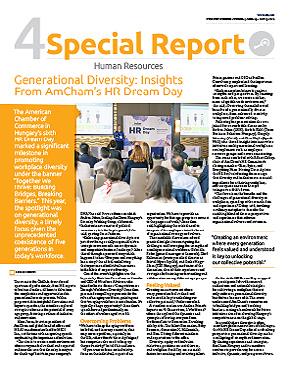
MBH Bank’s Postmerger HR Vision
Kitti Dobi, chief HR officer at MBH Bank, reflects on the HR challenges and successes of MBH Bank one year after the groundbreaking three-way merger that created Hungary’s second biggest commercial lender. 19
Korean FDI in Hungary: Beyond Co-existence
Rubik’s Cube at 50
Hipa has closed FDI deals from the East Asian state worth a combined EUR 10.5 bln in the past five years alone, creating 14,000-plus jobs. South Korea has topped the investment volume chart three times: 2019, 2021, and 2022. 14 With around 500 million sold, the Hungarian designed Rubik’s Cube is the world’s bestselling puzzle game and toy. 45
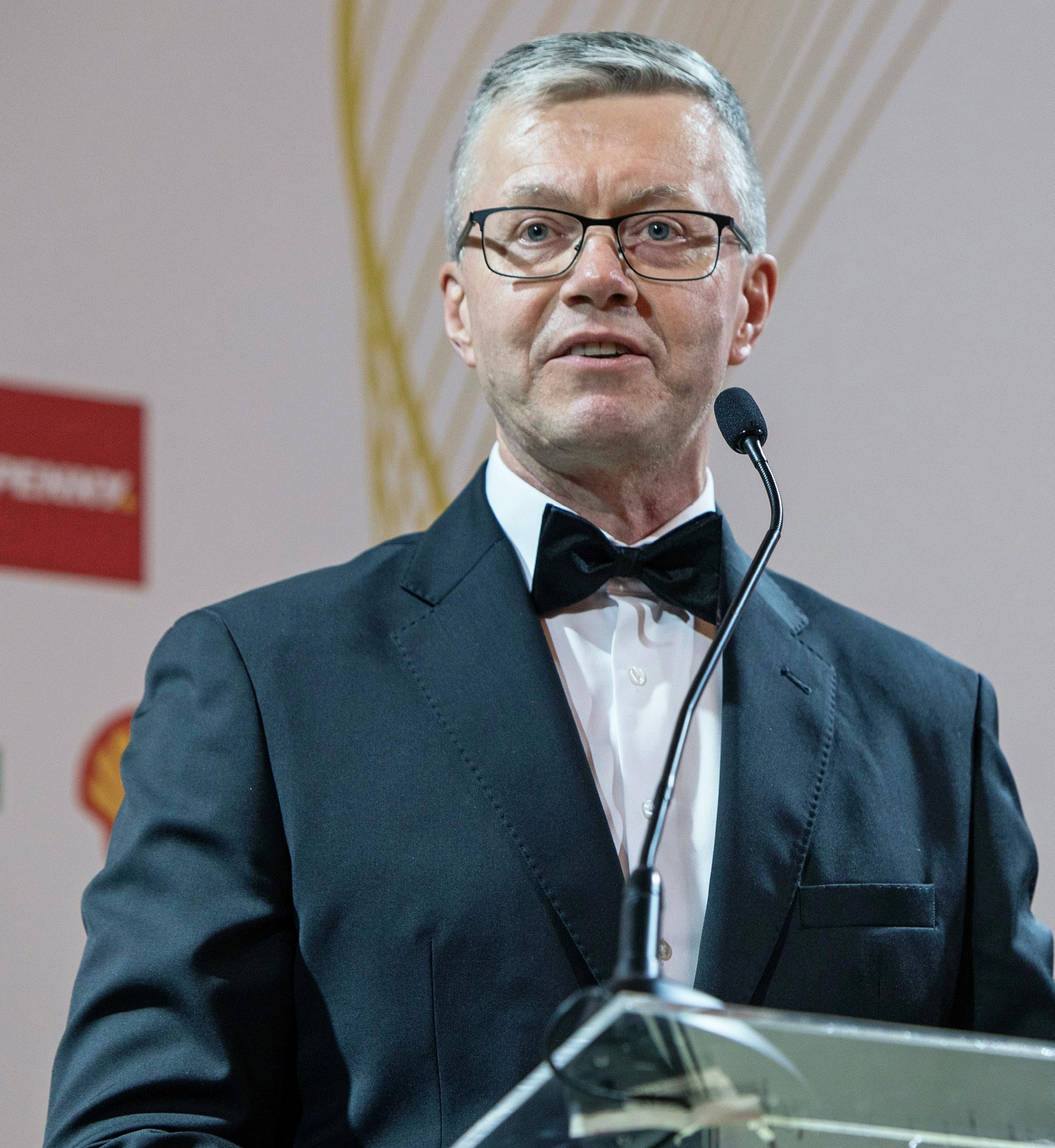
So Much More Than Child᾽ s Play
Chresten Bruun, the general manager of the Lego Factory in Nyíregyháza, and the SVP of EMEA Manufacturing in the Lego Group, reflects on winning the Expat CEO of the Year title and what the award means to his team. 8

SPECIAL REPORT INSIDE THIS ISSUE NEWS YOUR INDISPENSABLE EVERYDAY COMPANION FOR BUDAPEST BUSINESS NEWS AND VIEWS SINCE 1992 | WWW.BUDAPESTBUSINESSJOURNAL.COM VOL. 32. NUMBER 8 | APRIL 19 – MAY 5, 2024 HUF 2,100 | EUR 5 | USD 6 | GBP 4
Human Resources
SPECIAL REPORT SOCIALITE FOCUS
EDITOR-IN-CHIEF: Robin Marshall EDITORIAL CONTRIBUTORS: Luca Albert, Balázs Barabás, Zsófia Czifra, Kester Eddy, Bence Gaál, Gergely Herpai, David Holzer, Gary J. Morrell, Maja Pénzes, Nicholas Pongratz, Gergő Rácz.
IN PRAISE OF THE BIG ISSUE






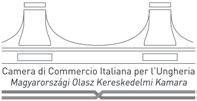
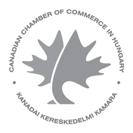
Why Support the BBJ?
• Independence. The BBJ’s journalism is dedicated to reporting fact, not politics, and isn’t reliant on advertising from the government of the day, whoever that might be.
• Community Building. Whether it is the Budapest Business Journal itself, the Expat CEO award, the Expat CEO gala, the Top Expat CEOs in Hungary publication, or the new Expat CEO Boardroom meeting, we are serious about doing our part to bind this community together.
• Value Creation. We have a nearly 30-year history of supporting the development of diversity and sustainability in Hungary’s economy. The fact that we have been a trusted business voice for so long, indeed we were the first English-language publication when we launched back on November 9, 1992, itself has value.
• Crisis Management. We have all lived through a once-in-a-century pandemic. But we also face an existential threat through climate change and operate in a period where disruptive technologies offer threats and opportunities. Now, more than ever, factual business reporting is vital to good decision-making.
For more information visit budapestbusinessjournal.com
I have always enjoyed this issue, with its Special Report dedicated to Human Resources, because it enables us to take the pulse of the labor market in much greater depth. I also like this issue because it is one of the biggest in the year, and this time round, it has set a new record for us (at least in recent memory) at 48 pages. That’s fully eight pages more than the equivalent issue last year. That availability of space means we can drill down in some depth into the challenges and opportunities that confront the leading players. I remain grateful to our partners in the various recruitment and temp agencies for their thoughtful input to our two Market Talk sections. The Hungarian Investment Promotion Agency has done such an excellent job at drumming up foreign direct investment interest in this country (and you can see the latest examples of that in our Korea Country Focus on p14) that, at times, you are left with the impression there is a conveyor belt of FDI projects in near-constant operation. It was instructive, therefore, to hear from a couple of agencies that a relative (and that’s a word doing an awful lot of lifting in this sentence!) downturn in investments has led to a slight easing in labor force pressures. Since Hipa set a new record in terms of investment value in 2023, I guess this means that projects tend to be less labor-intensive than they once were, which makes sense if you think about the inexorable rise of automation in the workplace
and the emphasis the government places on the quality of jobs (higher added value) than the quantity. It is worth underlining, however, that no one is saying the labor shortage is over or that pressure won’t ratchet up again once some of the more significant projects get closer to opening and the need for workforce becomes more pressing. Indeed, one of the agencies spoke of already seeing the “market picking up on activity” this year. Similarly, none of our experts seem to think the need for third-country workers from outside the European Union will dissipate anytime soon. On the contrary, it now appears to be very much part of the HR fabric of this country. Other interesting concerns that bubbled up include the demographic pressures of more people exiting the workforce (whether retiring or moving abroad) than joining it, despite the very best efforts of the government to move the needle when it comes to population growth, and what one of our expert witnesses called “the backwardness of the educational system.” My favorite answer, however, was from the manager who, when asked what was the greatest challenge facing the market, said, “Finding a good recruitment agency!”
Enjoy this issue; there’s undoubtedly plenty of good reading material within it.
Robin Marshall Editor-in-chief
THEN & NOW

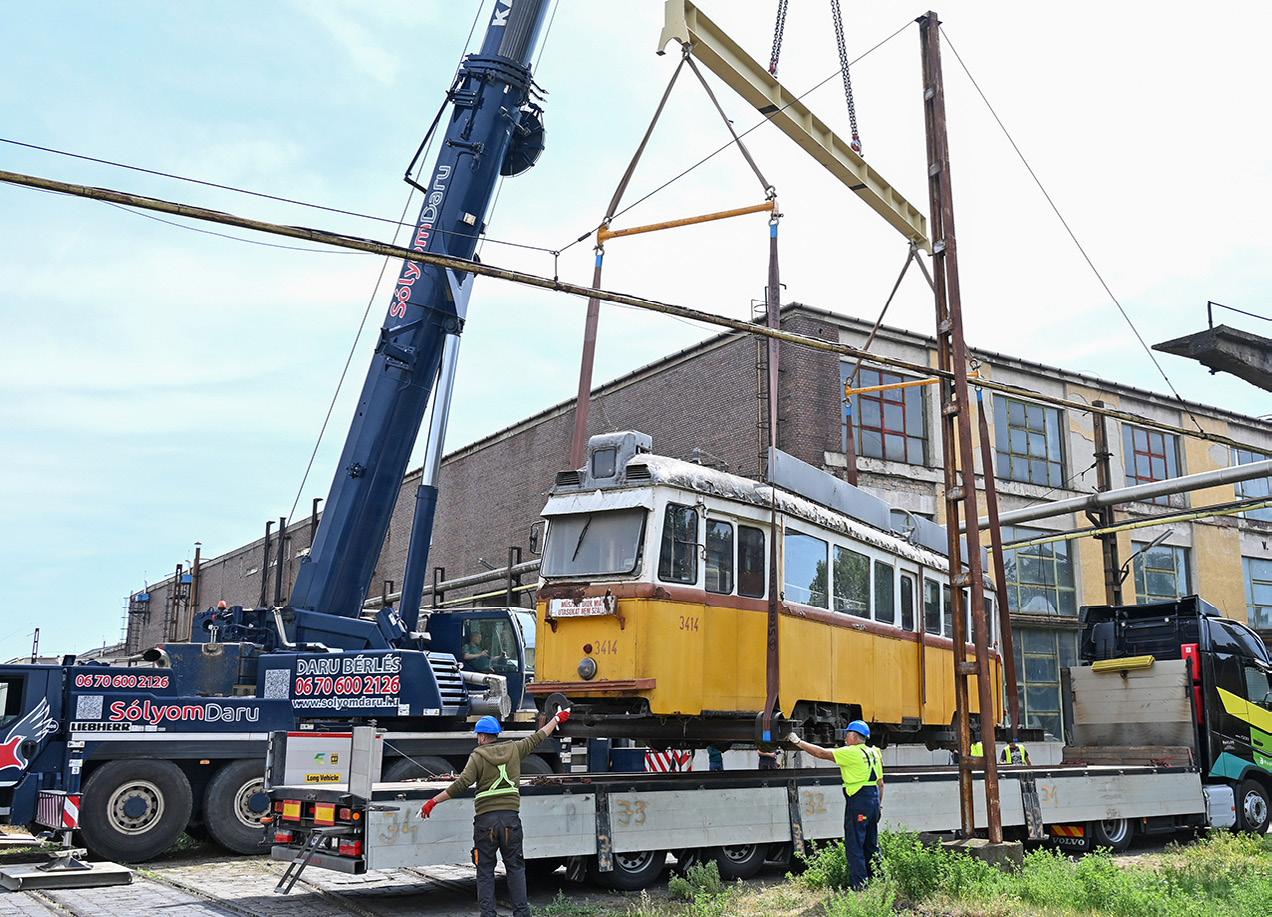
In the black and white picture from the Fortepan public archive, dated 1973, two trams are seen waiting at the Batthyány tér terminus in Budapest. In the color picture published by state news wire MTI, an old UV3 electric tram carriage, awaiting restoration, is placed onto a trailer by crane at the Museum of Transport’s Northern Vehicle Repair site on April 15, 2024.
2 | 1 News www.bbj.hu Budapest Business Journal | April 19 – May 5, 2024
LISTS:
NEWS AND PRESS RELEASES: Should be submitted in English to news@bbj.hu LAYOUT: Zsolt Pataki PUBLISHER: Business Publishing Services Kft. CEO: Tamás Botka ADVERTISING: AMS Services Kft. CEO: Balázs Román SALES: sales@bbj.hu CIRCULATION AND SUBSCRIPTIONS: circulation@bbj.hu Address: Madách Trade Center 1075 Budapest, Madách Imre út 13-14, Building B, 7th floor. Telephone +36 (1) 398-0344, Fax +36 (1) 398-0345, www.bbj.hu The Budapest Business Journal, HU ISSN 1216-7304, is published bi-weekly on Friday, registration No. 0109069462. It is distributed by HungaroPress. Reproduction or use without permission of editorial or graphic content in any manner is prohibited. ©2017 BUSINESS MEDIA SERVICES LLC with all rights reserved. What We Stand For: The Budapest Business Journal aspires to be the most trusted newspaper in Hungary. We believe that managers should work on behalf of their shareholders. We believe that among the most important contributions a government can make to society is improving the business and investment climate so that its citizens may realize their full potential. VISIT US ONLINE: WWW.BBJ.HU
BBJ Research (research@bbj.hu)
IMPRESSUM BBJ-PARTNERS
THE EDITOR SAYS
Photo by Gyula Nagy / Fortepan
Photo by Zoltán Máthé MTI
1News
Inflation Closer to Central Bank Target, for Now
Annual inflation slowed to 3.6% in March from 3.7% in the previous month. It confirms that the price index is still slowing for now, although higher figures are expected for the rest of the year.
February Industrial production data brought some good news, but construction data suggests that the sector lost its momentum in the second month of the year.
Industrial Production in Hungary, 2002-2024 (January-February)
Production volume index; same period of the previous year equals 100.
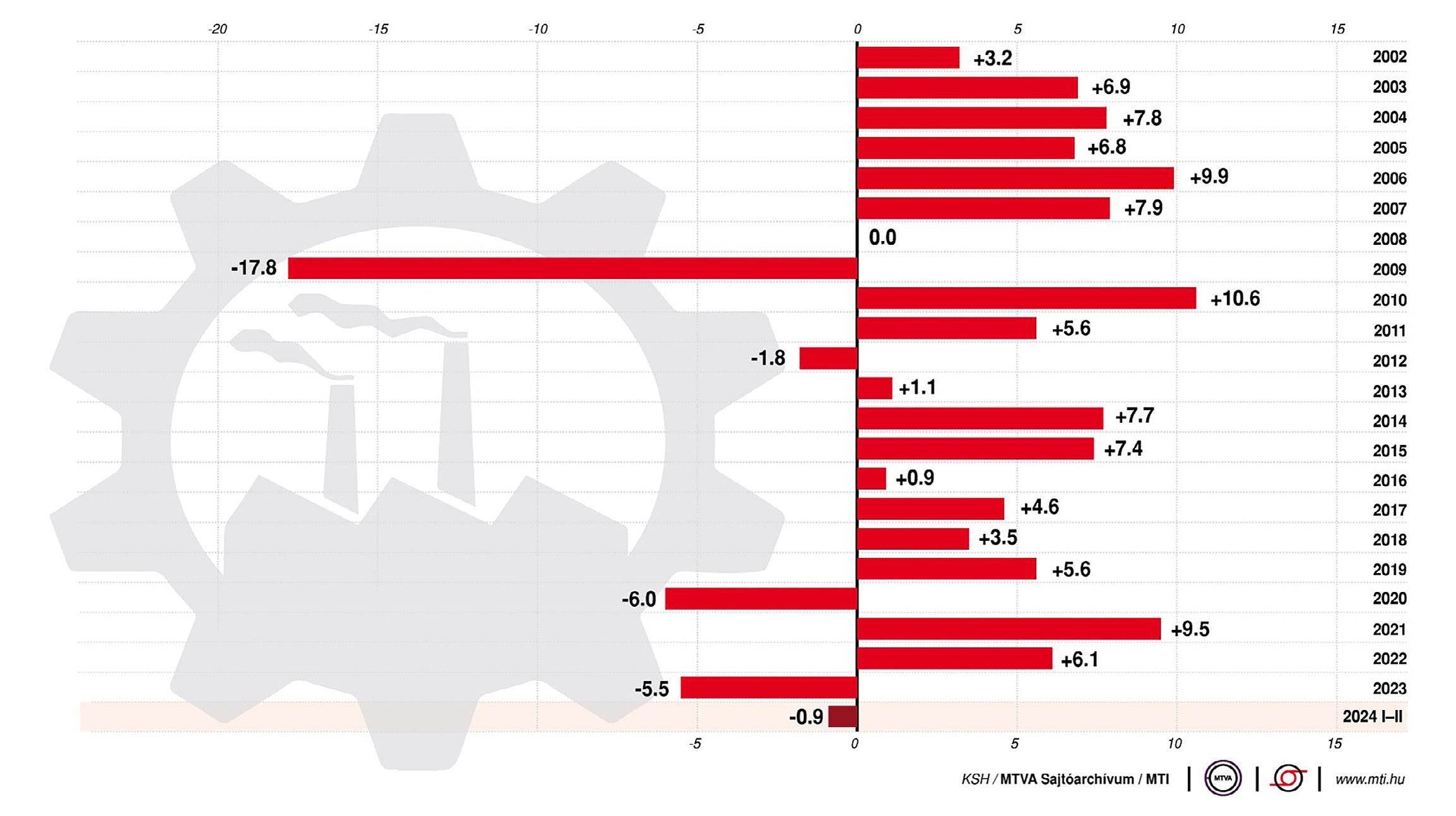
Source:
The March inflation data confirms that the massive price rises are over in Hungary. Food prices, in particular, slowed the inflation figure, with the rate of price increase of only 0.7% on an annual basis, within which the Central Statistical Office (KSH) measured only a 0.1% increase in one month in March.
Overall, consumer prices increased by 3.6% on average in March 2024 compared to the same month in 2023. The index rose by 0.8% on average on a monthly basis.
According to ING economist Péter Virovácz, the joy of seeing the data is somewhat clouded due to the onemonth repricing. In the last two months, the general price level rose by 0.7%, and repricing even accelerated in March to 0.8%.
Overall, there is still significant inflationary pressure in the Hungarian economy since to reach the 2-4% inflation target sustainably, one-month inflation should be around 0.2-0.3%, Virovácz says.
The service sector accounts for 72% of the 3.6% inflation, which means that, as in other developed countries and in the regional neighbors, this item is now causing the biggest headache for monetary policy. All the more so because
this type of inflation is more likely to stay than the price effect of items outside the core inflation basket, the analyst notes.
Weaker Repricing
“In April, we expect that the monthly repricing will be slightly weaker than the indicator seen in the last three months,” says Virovácz. This can primarily be related to the seasonal price changes of food and clothing items.
He also expects that the increase in fuel prices will stop, primarily as a result of negotiations between the government and MOL. On the other hand, the price increase of services may continue. As a result, the consumer price index will be able to stay around the current level for a while on an annual basis.
After that, however, the inflation indicator may begin to rise again; that is, the inflationary picture that now seems more favorable will gradually start to deteriorate.
“We continue to expect a two-round reflation. The first round is expected to start in May and the second in October. As a result, our inflation forecast for December
2024
remains unchanged in the range of 5.5-6%, currently closer to the top of the range,” Virovácz concludes.
According to Gábor Regős, head economist at Gránit Alapkezelő, the latest inflation data does not pose an obstacle to the further relaxation of monetary policy. He adds that, in this regard, the limits
are less Hungarian inflation but rather the monetary policy of the regional and large central banks. From this point of view, the U.S. inflation data, which was again minimally higher than expected, does not help so that it may point to a later start in the Fed’s easing.
Péter Kiss, Amundi’s investment director, says that due to the running out of base effects and seasonality, he expects a fluctuating increase in inflation from May, with a year-end figure of 4.6%, marginally above the inflation target band. He also thinks that the central bank will continue the interest rate cuts in its predicted, slower schedule regardless of the latest inflation data.
Significant Volume Increase
The volume of industrial production increased significantly in February by 3.5% compared to the previous month, KSH has reported. This is the first really meaningful indication in a long time that there is growth potential in the industry, but the detailed data confirms that one-off factors may also have contributed to the rise.
The outlook for the industry, however, remains mixed. Even during the investment downturn of the past year and a half, the sector was in an active capacity expansion phase. But it seems that, for the time being, performance is much more affected by the weakening of external demand, where no signs of recovery are visible yet.
With the latest data, the downward trend of industrial production has not yet
been broken, although there is a chance that the trend will become more stagnant in the coming months. In any case, the rebound in February was significant in that the average performance of the first two months of the year is the same as that seen in the fourth quarter of last year.
This means that if the March data does not bring a significant decline, the industry will probably not contribute negatively to the GDP growth in the first quarter.
The performance of the construction sector, meanwhile, more closely resembles a rollercoaster: the volume of production decreased by 8.5%
in February compared to the previous month, following a massive rise of 10.1% in January.
According to the most recent data released by the KSH, construction output volume, based on raw data, surpassed the previous year’s level by 3.2% in February 2024. Of the main construction groups, buildings increased by 2.8%, while civil engineering grew by 4.4%. However, based on seasonally and working day adjusted indices, construction output was 8.5% lower than in January.
According to analysts, after the substantial jump in January, even the decline in February does not seem so bad. The first quarter of this year is expected to be stronger than the last quarter of last year.
www.bbj.hu Budapest Business Journal | April 19 – May 5, 2024
•
macroscope
ZSÓFIA CZIFRA
The Hungarian ultra-lowcost airline Wizz Air has relocated its headquarters to the Breeam-accredited Millennium Tower by TriGranit at the Millennium City Center office park, a phased complex that has delivered 360,000 sqm of office and service space on a 12-hectare brownfield site on the Pest banks of the Danube.
The airline has secured 8,000 sqm of office space in what is described as a landmark deal in an uncertain Budapest office market, where few such large transactions are being concluded. With a limited pipeline, such large, contiguous, quality, sustainable office spaces are becoming more challenging to source in the Budapest office market.
The long-term lease was concluded with very flexible conditions, according to Valter Kalaus, managing director of Newmark VLK Hungary, who provided tenant representation for the transaction.
Real Estate Matters
A biweekly look at real estate issues in Hungary and the region

Wizz Air is leasing the entire South Tower with state-of-the-art interiors and services to improve employee comfort, according to the company. Airline staff will have a separate entrance and reception, a dedicated modern dining and catering area and a unit of a leading café chain, while a modern fitness center is also available.
“We tried to find a vibrant and rapidly developing location for the client.
Millennium Tower is an excellent property as it is surrounded by a lot of services, and the building itself offers many amenities,” says Kalaus of the deal.
“It already functioned as a company headquarters, so a significant part of the fit-out could be retained. A more
cost-effective approach was used to arrange the final interior space, which is an important aspect for a tenant which is a low-cost airline,” he said.
“Wizz Air had some ESG requirements that we took into consideration during the selection process. As an airline company, they pay special attention to creating and operating in a sustainable environment. It has been a very long process as the deal had a fairly complicated structure,” Kalaus adds.
Suitable Buildings
Concerning the office market, he adds that only a few new projects have been launched over the past three years. Most contracts are extensions, and there are
very few suitable office buildings among those already operating where such a large company headquarters could be established according to modern standards and requirements.
In addition, the flexibility of the lessor extended to the point that it could also provide additional space for the airline’s future expansion should there be demand for it.
“We are delighted to be moving our corporate headquarters to an office building with such outstanding facilities. The new premises will give Wizz Air [….] a central hub to foster collaboration, community and innovation to strengthen its low fare leadership position,” comments Ian Malin, CFO of Wizz Air.
“I am sure that the modern environment and easily accessible downtown location will be appreciated not only by our existing and new colleagues but also by our partners while serving our continuously growing and expanding airline for many years to come,” he adds.
There is currently 410,000 sqm of office space under construction in 16 office
projects scheduled for completion across Budapest by 2024/2025. However, the absence of announced projects for 2026 suggests caution and perhaps a shift towards “brown” redevelopment opportunities, according to Cushman & Wakefield.
Wizz Air Relocates to new HQ in Millennium Tower Hungary Blocks NATO Role, Builds Trust With Ukraine
“Hungary will not back any NATO proposals that might draw the alliance closer to war or shift it from a defensive to an offensive coalition,” government spokesman Zoltán Kovács said in a post on X (formerly Twitter) about plans for the Western defense alliance to initiate long-term support for Ukraine.
provides military equipment for Ukraine.
previous NATO proposals had respected these “red lines,” he said, those being put forward now could bring the alliance “closer to the war,” adding that “war psychosis” among some members presented a severe risk of escalation.
“Apart from a handful of ongoing office projects, office developers are still reluctant to jump into new [schemes]. Those already started need a strong tenant base to be continued as planned,” concludes Kalaus.
Roundup Crisis
At a meeting of NATO foreign ministers on April 3-4, Secretary General Jens Stoltenberg put forward a proposal that would provide EUR 100 billion in military support for Ukraine over five years.
The plan would also involve NATO playing a more direct role in coordinating the supply of arms, ammunition and equipment to Ukraine by taking over some of the work of the Ukraine Defense Contact Group. The U.S.-led ad hoc coalition, also known as the Ramstein group, after the United States Airforce Base in RhinelandPalatinate, Germany, where it first met,
However, during a break at the meeting, Minister of Foreign Affairs and Trade Péter Szijjártó told journalists Hungary would oppose increasing NATO’s role as a coordinator of weapons deliveries to Ukraine. So far, he said, the strategy of giving Ukraine weapons to achieve success on the battlefield had “clearly failed.”
Red Lines
Speaking to journalists after a meeting of the NATO-Ukraine Council, Szijjártó recalled an earlier unanimous decision among members that NATO would not be a party in the military conflict and would make every effort to avoid a direct confrontation with Russia. While all
Acknowledging that Hungary was the only NATO member to oppose an increased role as coordinator for the alliance, he said that the primary goal of the government he serves is to protect the country from its neighbor’s war.
Meanwhile, on the sidelines of the meeting of NATO foreign ministers, Szijjártó spoke with his Ukrainian counterpart, Dmytro Kuleba. Afterward, Szijjártó referred to steps taken over the past weeks towards restoring mutual trust between Hungary and Ukraine.
“Progress has been made; for example, changes to the agreement on cross-border traffic will contribute to ending unfair situations on the border between Hungary and Ukraine,” he said. He pointed to logistics investments in Fényeslitke (290 km northeast of Budapest), on the border with Ukraine, in which support from the Hungarian government had
facilitated the transshipment of an annual one million containers and three million tonnes of wheat and cooking oil.
Further progress was made on April 11, when Hungary and Ukraine agreed to open another border crossing between the Hungarian settlement of Nagyhódos (340 km northeast of Budapest) and Velyka Palad in Ukraine, in addition to expanding the capacity of existing crossings.
Szijjártó said in a post on his Facebook page that the agreement on the sixth border crossing between the two countries had been signed earlier in the week by Hungary’s Ambassador to Ukraine Antal Heizer, and Ukrainian Minister of Infrastructure Oleksandr Kubrakov. The expanded capacities at other border crossings include the opening of Beregsurány (315 km northeast of Budapest) to transport trucks.
4 | 1 News www.bbj.hu Budapest Business Journal | April 19 – May 5, 2024
NICHOLAS PONGRATZ
GARY J. MORRELL
Wizz Air’s new HQ is in the Millennium City Center.
Ukraine
Making the Most of Hungary’s Unique Expat CEO Community
Chresten Bruun, the general manager of the Lego Factory in Nyíregyháza and the senior vice president of EMEA Manufacturing in the Lego Group won the Expat CEO of the Year title at the Budapest Business Journal ’s annual awards gala on March 23. The Budapest Business Journal asked him to reflect on the evening and what the award means to his team.
ROBIN MARSHALL
BBJ: What went through your mind when Veronika read out your name?
Chresten Bruun: “Unbelievable!” That was my first thought. But very soon after that, I started having a feeling of being happy for this recognition from the jury and I felt it was coming from the entire expat community in Hungary. Then I felt the pressure of making my thank you speech! As I started speaking, it became crucial for me to make the point that this is not only an award for me but for the entire expat community in Hungary and, last but not least, to all our employees back in the Lego Factory in Nyíregyháza. And at the end of my speech, I just felt very privileged to be a part of all of this. I would never have been able to experience this if I had “just” stayed in a job with the Lego Group in Denmark and not taken on the challenge of going to Hungary as an expat.
BBJ: As you’ve already indicated, you are the first to recognize this isn’t a solo effort. What message do you think winning the title sends to your team?
CB: It is not a solo ride, for sure. I’m thriving as part of a team. And, together with all the employees in Nyíregyháza, we are one Lego team in the factory. Winning the title sends a message to the entire team that we did something great since one of the team can receive this award on behalf of all of us. What we did as a team was recognized outside the factory, by externals, and was evaluated to be so good it won an award!
BBJ: It was clear you received a lot of support at the gala. What do you think of this expat CEO community?
CB: It is a unique community to be part of. Everyone is open to sharing experiences, and there is no feeling of competition. It is about supporting each other. I’m unaware of a similar community elsewhere, so I think it is unique to Hungary. So, I am grateful the founders of this community and award, the Budapest Business Journal and their official event partner, the Hungarian Investment Promotion Agency.
It is a community with a high degree of diversity of nationality, gender, age, length of experience, educational background, religion, and so on. But still, everyone seems so open, and the dialogue is all about curiosity, not judging. I met so many people during the evening
Chresten Bruun
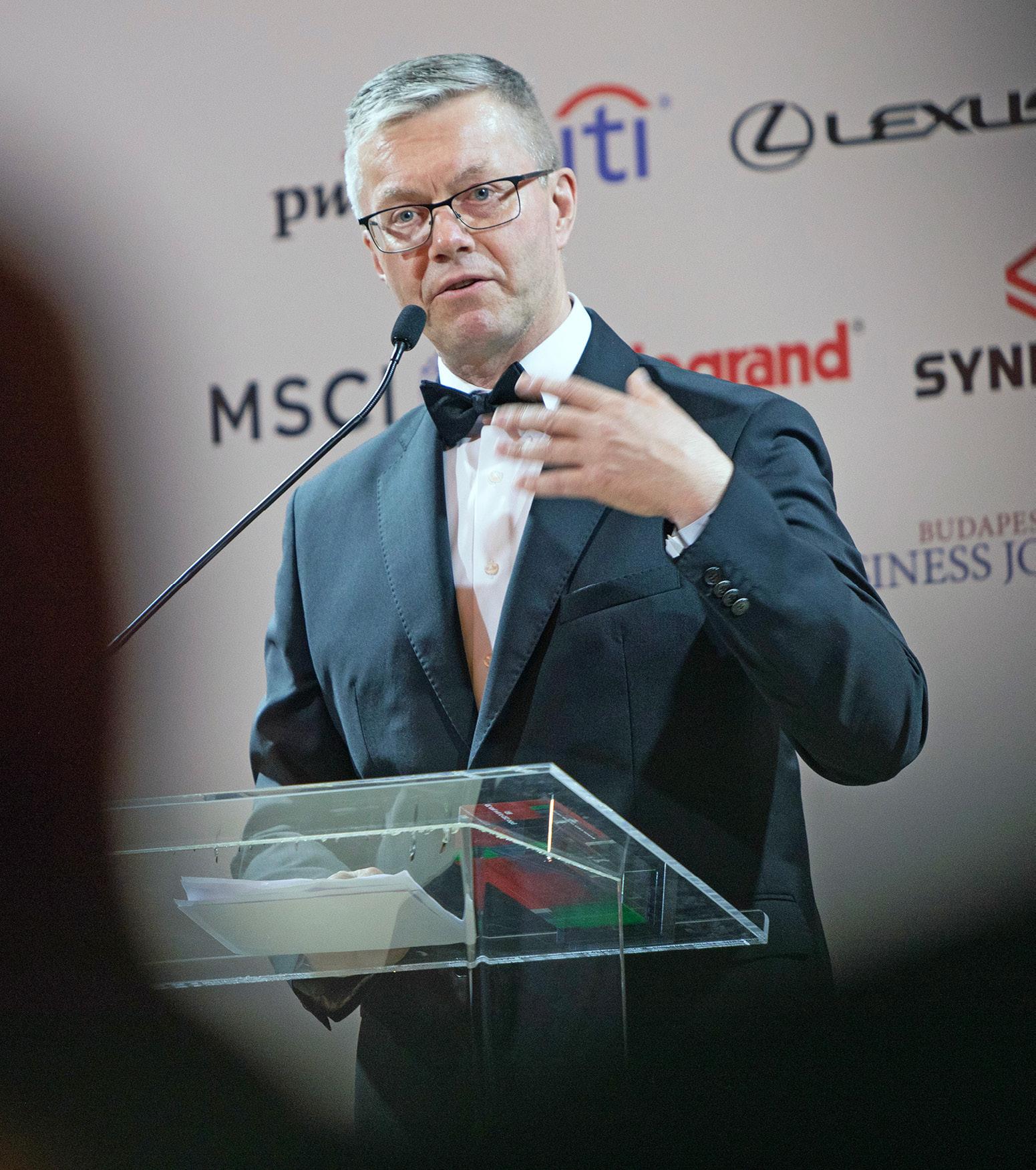
and night, and I hope I can return some of the support and good comments I received back to this community.
BBJ: Not that winning this award affects this, but what plans do you have for the business in Hungary for 2024 and the next couple of years?
CB: We will continue to nurture and develop our company culture in the Lego Group here in Hungary. We believe we have a unique opportunity because we are manufacturing a play experience that gives learning through play to millions of kids. Another opportunity comes from our origin in Denmark and Scandinavia, places with a team-oriented leadership culture and a low hierarchical structure. Lastly, we are a family-owned company, with the fourth-generation owner, Thomas Kirk Kristiansen, as the chairman of the board.
We continue to expand our operation here in Hungary. This year, we will inaugurate a new packing facility and a high bay warehouse. We will also continue to deliver on our ambition to become more sustainable by phasing out single-use plastic (using paper instead of plastic in the bags containing our bricks inside our Lego boxes) and installing more solar panels to produce electricity. We will also start phasing out natural gas by utilizing geothermal energy.
BBJ: What are the most significant challenges to doing business in Hungary in 2024?
CB: Based on last year’s experience, it is essential that inflation continues to be reduced to the same level as other EU countries. Inflation has proved a significant challenge, because it also reduced the buying power of the wages and salaries of our employees. It also impacts the cost level of running the operation here in Hungary and, thereby, our competitiveness.
That aside, the geopolitical risk is also a great challenge as the war between Russia and our neighbors in Ukraine, particularly, leaves us with a high degree of uncertainty for running our business. A third challenge is the lack of skilled workforce in certain areas. The need for skilled workers grows faster than the available workforce can keep pace with.
“Winning the title sends a message to the entire team that we did something great since one of the team can receive this award on behalf of all of us. What we did as a team was recognized outside the factory, by externals, and was evaluated to be so good it won an award!”
BBJ: We don’t want to be purely negative. What are the opportunities the country offers?
CB: We experience a very positive business environment generated by the local authorities, the government, HIPA and many other business partners. This is an opportunity for Hungary.
BBJ: Finally, I am sure you would like to say something about your two runners-up: Arne Klehn, multi-property general manager of Budapest Marriott Hotel, and Raffaella Claudia Bondi, pharmaceutical executive and general manager of Roche.
CB: I’m very impressed with the two other candidates. They are very competent within their area of responsibility. They would have been equally deserving winners of this award. I hope they feel they have a share in this year’s success because just the fact of being nominated itself is a massive recognition for all three of us.
1 News | 5 www.bbj.hu Budapest Business Journal | April 19 – May 5, 2024
PwC Hungary, Debrecen Municipality Host 1st Major Business Forum Outside Budapest
PwC Hungary hosted its first significant business forum outside Budapest under the slogan “The Future is Built in Debrecen” in the country’s second city on April 9. The almost 300 guests included the leaders of some of the largest multinational companies in the country. Representatives of highly successful local businesses also attended, and two awards were presented at the event.
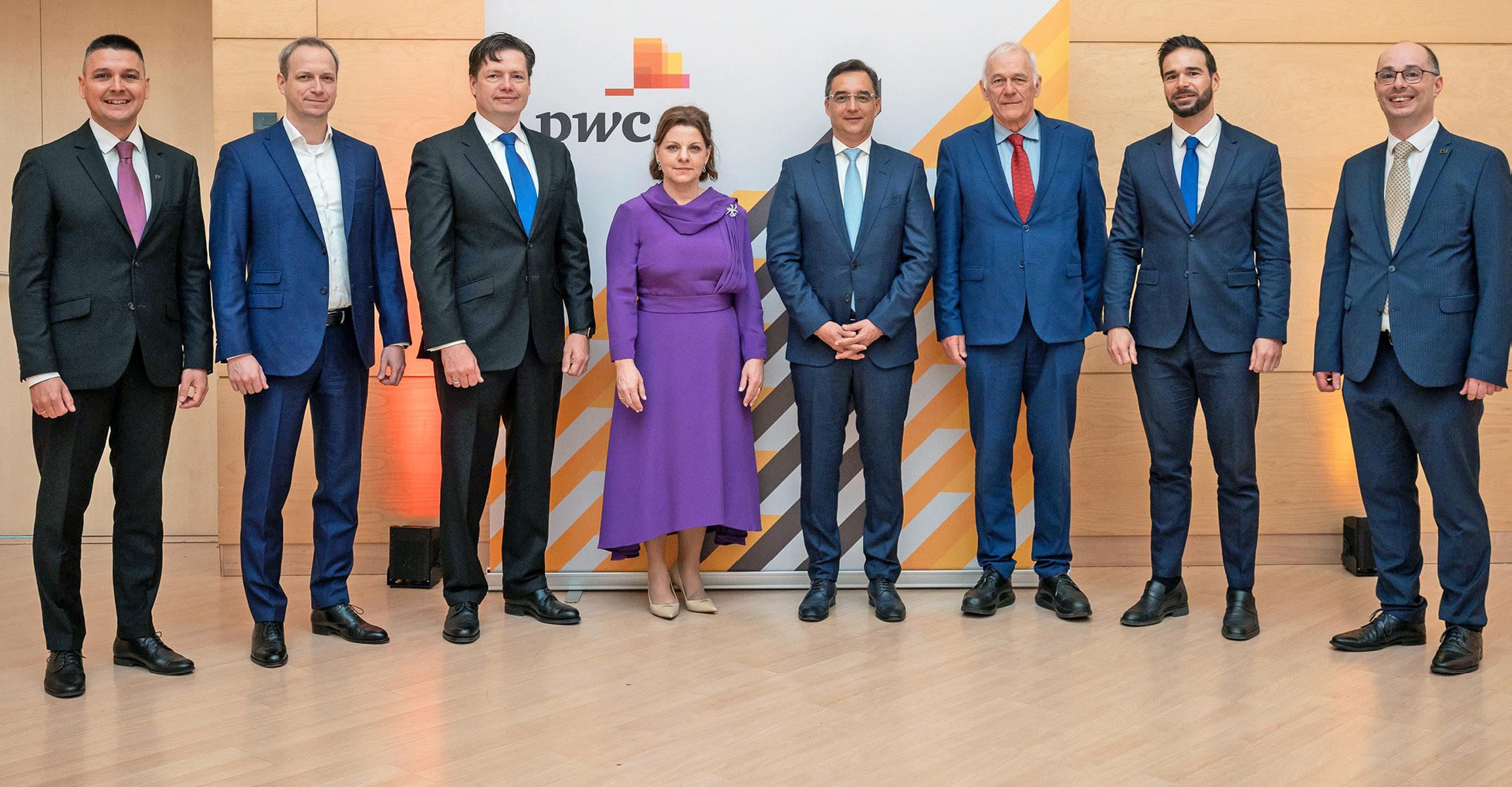
Labor Pessimism
PwC’s 13th Hungarian CEO Survey revealed that CEOs in Debrecen are more alarmed by these problems than CEOs nationwide. According to Lőcsei, 31 of the 297 CEOs questioned in Hungary were based in the second city. Some 81% of CEOs in Eastern Hungary said they were pessimistic about labor shortages, while the national average is 48%. It is clearly a critical issue for locals to debate. And debate was very much the point of the day.
“However, this endeavor will only be successful in the long term if we pay due attention to environmental protection and sustainability. And in this, we all have an important role to play,” he said.
“It is possible to build an economy in the East that is recognized in the West. In the past 10 years, thanks to an economic restructuring, Debrecen has been able to catch up with the most dynamically growing cities in Central Europe,” Papp added.
“There has never been a business event of this magnitude in Hungary before outside Budapest, which clearly shows the role of Debrecen and the opportunities for the city and the region,” said Tamás Lőcsei, PwC Hungary’s CEO, in his opening speech. Working with co-organizers from Debrecen municipality, PwC says it intends to make the spring summit an annual fixture in the business calendar.
“At PwC, we look for connections in places where there is both knowledge and opportunity to form new, valuable and future-proof ideas and alliances; where we can learn from each other and where everyone benefits from dialogue,” Lőcsei explained. “We believe that trust is the cornerstone of everything we do in business, and it is building trust with our stakeholders that makes us successful in solving important problems.”
The forum at Debrecen’s Kölcsey Center featured discussions about the development of Eastern Hungary, as well as industry and business trends. It also provided a space for dialogue regarding the concerns of CEOs in Debrecen and innovative solutions. Issues included labor and capital shortages and financing and supply difficulties.
“By inviting local and multinational companies, small and large enterprises, educational institutions and business organizations to Debrecen, we are fostering dialogue for a successful future,” said Tünde Kis, director at PwC Hungary and head of the company’s Debrecen office.
“It is possible to build an economy in the East that is recognized in the West. In the past 10 years, thanks to an economic restructuring, Debrecen has been able to catch up with the most dynamically growing cities in Central Europe.”
“Today, Debrecen contributes to Hungary’s economic development with its unique and robust economy. This is because it has been able to attract industrial enterprises with top-notch technological know-how in the fields of electromobility and energy storage,” said László Papp, Mayor of Debrecen, who also welcomed delegates.
Rapid Expansion
The municipality of Debrecen estimates the local economy will grow to six times its size in 2020 by 2030 due to the city’s increase in and improvement of its educational and business infrastructure. This expansion was one of the subjects in the panel discussion led by Budapest Business Journal editor-in-chief Robin Marshall. His roundtable featured leaders from multinational companies BMW, Lego, CATL, and Wizz Air, who emphasized that sustainability and building on local capabilities and resources should be prioritized by investing in companies to encourage development.
Other highlights included Marc Olric, an international expert from PwC Germany, talking about the economic revitalizing effect of generative AI, while Richárd Végh, CEO of the Budapest Stock Exchange, discussed current capital market trends and market opportunities for companies.
A second roundtable discussion featured the leaders of local businesses, the Tranzit Group, Xanga, Hajdu and Kite. They discussed the prospects, plans for growth, and supplier potential of Hungarian-owned companies operating in Debrecen and the region.
At the end of the morning session, two awards were presented by Lőcsei and Papp. László Ábrahám, managing
director of Sensirion Hungary Kft., received the “Business Excellence Award” in recognition of his exemplary professional and civic achievements in the economic development of Eastern Hungary. Dezső Karasszon and Zoltán Vasvári, joint CEOs and co-founders of DataExpert Services Kft., won the “Company of the Future Excellence Award” for the innovativeness of their business and its significant contribution to the region’s economic development.
After lunch, three breakout meetings were organized on how technical and R&D activities aid the region’s progression (hosted by the German-Hungarian Chamber of Industry and Commerce); a workshop on the sustainable labor market (led by the American Chamber of Commerce in Hungary), and a meeting on the relationship between generational change and digitalization (led by the National Association of Entrepreneurs and Employers).
PwC Hungary opened its office in Debrecen last November to serve businesses in Debrecen and the surrounding ecosystem better, especially in supporting innovation, R&D, and education. From September 2024, the University of Debrecen will offer a tax course taught by PwC’s experts. In the next few weeks, PwC will organize professional events on various topics, such as transfer pricing and cybersecurity. PwC Academy’s adult education courses on IFRS, accounting, ESG and sustainability matters will also be offered in Debrecen.
6 | 1 News www.bbj.hu Budapest Business Journal | April 19 – May 5, 2024
MAJA PÉNZES
From left, Zoltán Vasvári of DataExpert Services; PwC tax partner Gábor Farkas; PwC CEO Tamás Lőcsei; PwC director Tünde Kis; Mayor of Debrecen László Papp, László Ábrahám of Sensirion; Deputy Mayor of Debrecen for Economic Affairs Lajos Barcsa, and Dezső Karasszon of DataExpert.
Looking to Build Stronger, More Responsive Health Systems Together
The head of Roche Pharma International, Jörg-Michael Rupp was in Hungary recently. The Budapest Business Journal took the opportunity for an exclusive discussion about the business, and healthcare trends in Hungary, Europe and beyond.
BBJ: Why are you visiting Roche Hungary now?
Jörg-Michael Rupp: Within Roche, I’m responsible for operations in more than 100 markets, including European countries like Hungary. Regular visits like this allow me to accompany my colleagues to meetings with partners, healthcare professionals and government officials as we look to build stronger, more resilient and responsive health systems together. We recently invited stakeholders from around the country to an event co-created in partnership with the Swiss Embassy, the Swiss-Hungariaan Chamber of Commerce, and the Business Council for Sustainable Development in Hungary (BCSDH). Our focus was the sustainability of healthcare, meaning how we can maintain and improve the health and well-being of individuals, communities and populations over time.
Balancing today’s health demands with tomorrow’s healthcare needs is a challenge every country faces. Ultimately, progress begins with a mindset of shared responsibility.
BBJ: Hungary is a relatively small country. How important are its operations to Roche’s international business?
J-MR: Our legacy in Hungary goes back more than 40 years, and, as our continued investment in the country illustrates, it remains a very important and much-valued market internationally. Having created 746 new jobs in 2022 alone, we now employ 2,600-plus people in Hungary and are proud of the contribution we continue to make to the national economy. In addition to our pharmaceutical and diagnostics divisions, we have an SSC, which provides business services and solutions for Roche across Europe. We also have 60 clinical trials underway in Hungary, which include 878 patients across 221 sites. Clinical trials have many benefits, including accelerating delivery of novel therapies, providing income, and generating cost savings through treatment and care. There is
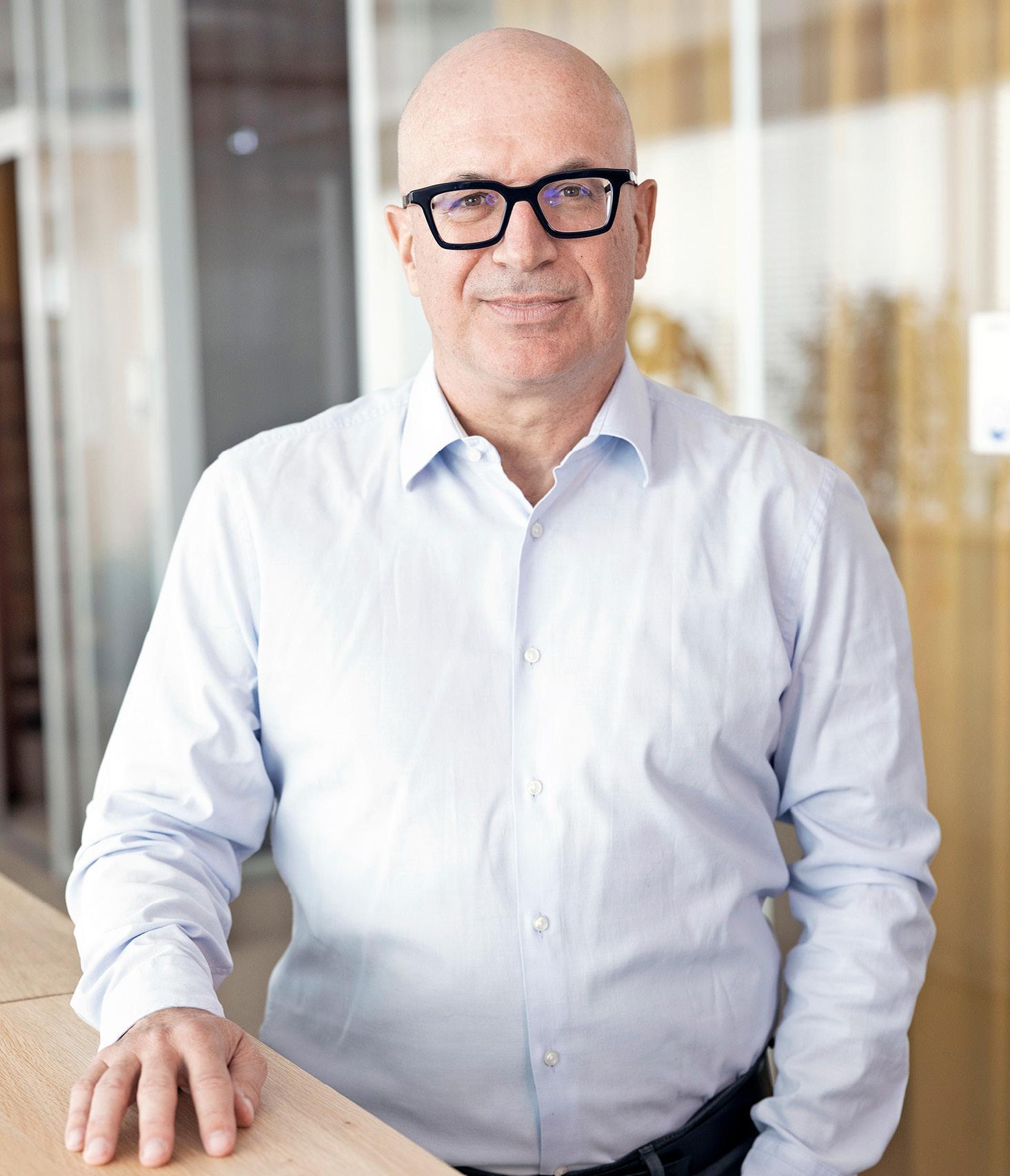
also evidence that patients have better outcomes when admitted to hospitals that carry out more clinical research.
BBJ: Is there any unique work going on here in Hungary?
J-MR: Hungary has been making tremendous progress in digital health initiatives, investing in related infrastructure and promoting the use of electronic health records. The patient pathway tool, ‘Dr. BetMen,’ is a great example. Co-created with the government, this is a prime example of how partnership and cooperation can drive digital transformation and improve patient care. It perfectly exemplifies Roche’s patient-centered approach and commitment to making innovative contributions to healthcare systems.
BBJ: What are the key global trends in pharma, and how is Hungary poised to adopt or accelerate them?
J-MR: Several key global trends are shaping the pharmaceutical industry’s future, and Roche plays a significant role in all of them. There is an increasing focus on personalized medicine, which involves tailoring medical treatments to individual patients and is driven by advancements in genomics and molecular diagnostics. AI has the potential to revolutionize healthcare, but must be used in a responsible way that benefits patients. The development and use of
BBJ: Pharma has always been about improving health outcomes through treatment. How has the process of how you go about that evolved during the time you have been working in the field?
J-MR: It has changed dramatically. For over 127 years at Roche, we have delivered innovations that have helped transform how diseases are treated. But for healthcare companies like ours, it is no longer enough simply to provide therapies and diagnostics. Our focus has shifted to being a partner at every step of a patient’s journey. That means detecting, diagnosing and treating health conditions much earlier. It means using technology to predict diseases before they develop and intervening as early as possible. It means unlocking the power of data to make health systems more sustainable and help more patients achieve better outcomes faster. We have been laying the groundwork for this personalized healthcare approach. Tailored individual care results in so much more than improved patient outcomes; it reduces pressure on health systems, maintains a healthy and productive society, and drives future economic growth. Progress is being made. Consider cancer in Hungary: breast cancer deaths in women aged 45-64 decreased by 28.3% and incidence by 23.6% between 1980 and 2015. To achieve widespread access and long-term sustainability in healthcare, a collaborative approach and integrated infrastructure are essential. This entails combining advancements in science, analytics and digital technology with transformative changes in healthcare delivery and public policy.
BBJ: What will be the next revolution that those outside the business would not know about?
biopharmaceuticals, such as monoclonal antibodies and gene therapies, are on the rise. Biotechnology is enabling the discovery of novel treatments and revolutionizing disease management. Last but not least, there is a growing emphasis on preventative healthcare and well-being, rather than focusing solely on treatment. This includes lifestyle interventions, early disease detection and health promotion programs.
I’ve spent almost four decades in this industry, and if there’s one thing I’ve learned, it’s that true progress in healthcare doesn’t happen in isolation. It’s about looking beyond national efforts and embracing more regional, or even global, collaboration. A great example is the upcoming EU General Pharmaceutical Legislation. What excites me is how it aims to bring back Europe’s spark in R&D and position us as leaders in innovation on the world stage. It’s a once-in-a-lifetime reform that could lead to a competitive yet collaborative environment that benefits everyone, most importantly, patients. It’s about creating an environment where life sciences thrive and patients across Europe, and indeed the world, have quicker and broader access to breakthrough treatments. At Roche, we are ready to engage in meaningful dialogue with legislators and lend our expertise and insights to ensure that this legislation not only meets but exceeds its potential.
J-MR: The field of pharmaceuticals is constantly evolving with new advancements and breakthroughs. If we just look at the past 50 years:
• Until the 1970s, the average life expectancy for people with hemophilia was 11-13 years. Now, assuming therapy is started in childhood, people with severe hemophilia can have a normal life span.
• The mortality rate for breast cancer in high-income countries has dropped by 40% since the 1980s.
• In 1980, there was no vaccination for HPV, so cervical cancer was not as preventable as it is today.
All these achievements were once considered out of reach, but they were made possible with the vision, dedication and tenacity of researchers worldwide. We are on the cusp of yet another seismic revolution in healthcare with the shift from treating disease to delivering patient-centered healthcare solutions. Personalized healthcare means better health at a lower cost for people and society. It means shifting from a onesize-fits-all approach to the best care for each person. We are excited by the prospect of applying AI to dramatically accelerate and transform our R&D of new therapeutics, diagnostics and treatments and bring incremental patient benefits. There are so many unmet needs and so much more to do, but we are committed to doing everything we can to help more people live longer, healthier lives.
1 News | 7 www.bbj.hu Budapest Business Journal | April 19 – May 5, 2024
ROBIN MARSHALL
Jörg-Michael Rupp, head of Roche Pharma International.
Leading Thru’ Innovation: Colette Matz Discusses Novartis Hungary’s Plans
Colette Matz, the newly appointed leader at Novartis Hungary who replaced Matt Zeller, shares her excitement and vision for the future, discussing her leadership style, the challenges facing the industry, and the innovative strides Novartis is making in healthcare technology.
BBJ: First of all, congratulations on your appointment. Could you share your leadership philosophy and how you plan to apply it to navigate the dynamic environment at Novartis Hungary?
Colette Matz: I’m thrilled to work with Novartis Hungary’s accomplished team, which includes many internationally recognized professionals. Hungary’s rich historical, cultural, and natural heritage makes this an exciting place. Although relocating can be challenging, my family and I are excited to make Budapest our home for the foreseeable future.
Regarding my philosophy, I believe in demonstrating an inspirational leadership approach that generates innovative ideas while prioritizing individuals’ well-being. I strongly believe in fostering an open, transparent dialogue with the team, regardless of hierarchy. My recent experience working in Italy has given me a better understanding of the cultural differences between the United States and Europe, although I continue to learn. We have high ambitions at Novartis Hungary; I believe creating an environment that fosters innovation and employee well-being will allow people to bring their best selves to work each day.
BBJ: The pharmaceutical industry is facing numerous global challenges. What are the most pressing for Novartis Hungary, and how do you plan to address them?
CM: We are committed to ensuring that patients receive the best possible care by providing timely access to innovative treatments and therapies. We are excited to share news of our joint initiative with the Ministry of Innovation and Technology and Semmelweis University. This initiative, which began in 2022, is a testament to our commitment to speeding up the digitization of clinical research, promoting cell

and gene therapies, and launching a cardiovascular intervention program that utilizes AI and machine learning. We plan to introduce more than 15 essential therapies in critical areas such as cardiovascular diseases, immunology, neuroscience, and oncology over the next four years, shaping the future of healthcare. Our company in Hungary is proud to play an important role in conducting numerous clinical trials.
BBJ: What is your vision for how Novartis Hungary might leverage digital innovation to improve patient care and operational efficiency?
CM: We want to enhance patient care and improve operational efficiency through digital innovation.
COLETTE MATZ has a 24-year career in the pharmaceutical industry in the United States and internationally, built on a healthcare administration and management degree from the University of Scranton in the United States. She brings a wealth of business development expertise and a track record of driving innovation, particularly in treating neuroscience and cardiovascular diseases. Most recently, from September 2021
Our goal is to optimize patient outcomes, streamline healthcare delivery, and drive meaningful advancements in treatment and care management. We aim to integrate digital platforms and data analytics to personalize patient care, improve treatment adherence, and enhance disease management. We believe that our digital strategy, which includes leveraging AI, can help accelerate clinical research, identify highrisk cardiovascular disease patients, and optimize treatment pathways. Our aforementioned partnership shows our dedication to being at the forefront of gene and cell therapy and clinical research.
to March 2024, Matz was head of the neuroscience therapeutic area with Novartis Italia, based in Milan, Lombardy, Italy. There, she was responsible for leading the marketing and sales strategy for the neuroscience portfolio and was a member of the Italian pharma leadership team.
Matz’ predecessor as country president at Novartis Hungary, Matt Zeller, was most recently
BBJ: Sustainability and corporate social responsibility are becoming critical considerations for the pharmaceutical industry. What initiatives or strategies will help Novartis Hungary become more sustainable?
CM: My colleagues are passionate about our work because we have the opportunity to help people, develop more efficient therapies, and support the national healthcare system. At Novartis Hungary, sustainability and corporate social responsibility are essential to our mission.
“Our goal is to optimize patient outcomes, streamline healthcare delivery, and drive meaningful advancements in treatment and care management. We aim to integrate digital platforms and data analytics to personalize patient care, improve treatment adherence, and enhance disease management.”
We are dedicated to implementing initiatives and strategies to contribute to a sustainable future. Our efforts in environmental sustainability align with our initiatives to reduce our footprint through energy-efficient practices and responsible waste management.
BBJ: With most of the year still ahead, can you tell us whether Novartis Hungary has any special projects planned for 2024?
CM: In 2024, Novartis Hungary is excited to intensify our efforts to improve cardiovascular health. We are committed to consolidating scientific collaborations and implementing population health initiatives, such as continuing local screening programs. We are thrilled that the government is prioritizing cardiovascular health during its EU Presidency in the latter half of this year, and we wholeheartedly pledge our support. Our goal is to use our expertise to enhance the platform for comprehensive cardiovascular care in Hungary, both at the global and European levels. We are dedicated to making a lasting impact on health and well-being through these efforts, leveraging our heritage of innovation.
interviewed in the Nov. 12, 2023, print issue of the Budapest Business Journal (see “Novartis Hones its Innovation Focus in Hungary.”) He was also shortlisted for the Expat CEO of the Year award in 2023. Zeller was appointed country president of the company’s operation in Australia and New Zealand effective December 2023 and moved with his family to Sydney, New South Wales, Australia.
8 | 1 News www.bbj.hu Budapest Business Journal | April 19 – May 5, 2024
BENCE GAÁL
Colette Matz, country president of Novartis Hungary.
2 Business
Hungarian Banks: HUF 50,000 Stolen Every Minute in 2023 Scam Surge
The National Bank of Hungary (MNB) has pointed to a surge in financial scams in 2023, with an increasing share of the damages borne by the clients. Nowadays, fraudsters also steal data using QR codes and even take out loans in victims’ names.
Although the MNB says the sharply rising trend has been broken, further action is necessary as Hungary’s international ranking has deteriorated.
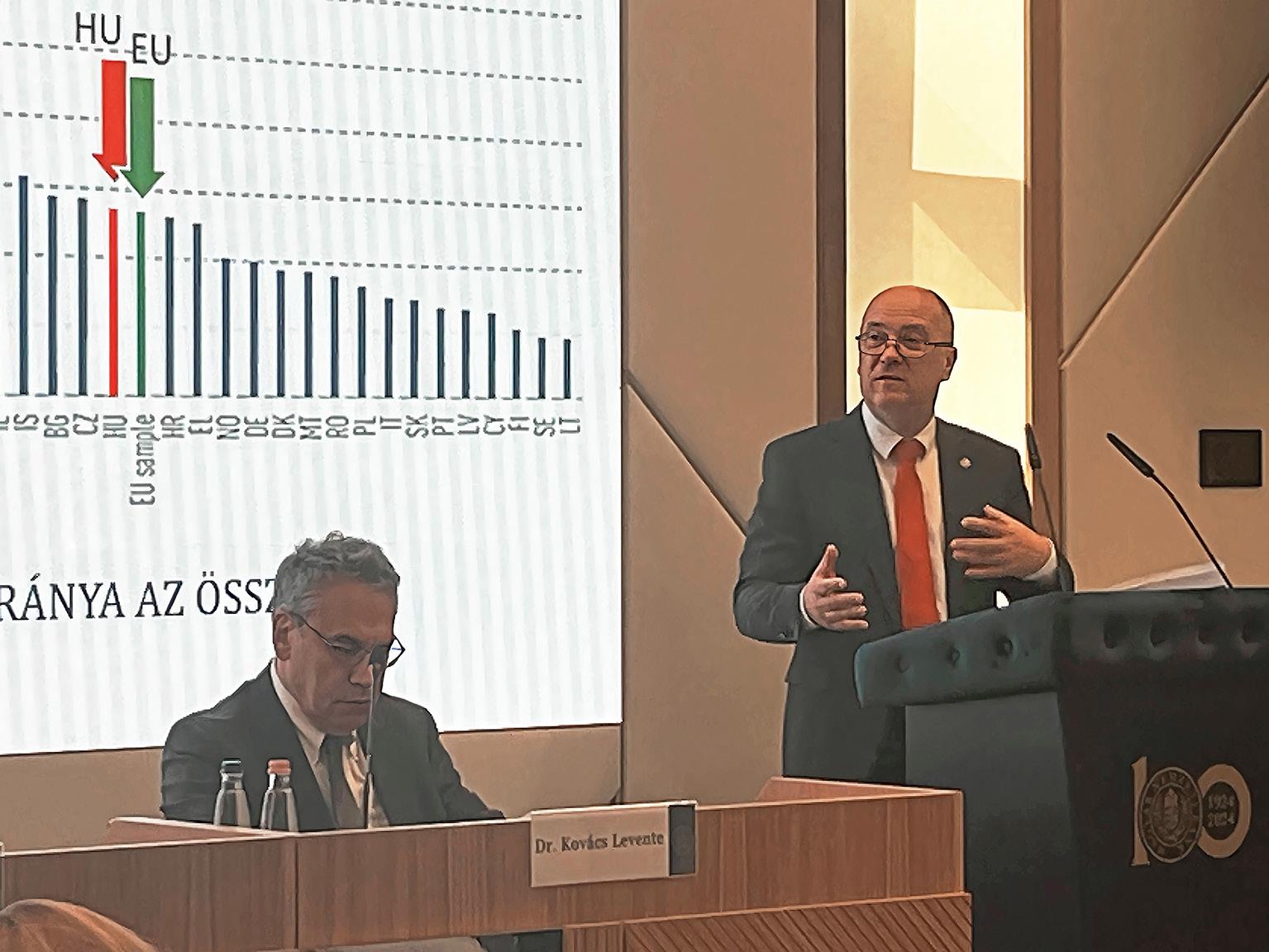
themselves have made significant efforts to change the trends. Moreover, people are becoming more aware, and so-called Cyber Shield cooperation is operational with the participation of 10 authorities.
At the beginning of 2022, the MNB received 20 customer complaints per month regarding fraud. This number had jumped to 122 at the beginning of
2023.
Development of Giro’s AI-based realtime fraud prevention system has been launched, which will allow banks to stop suspicious transactions. The system’s specifications are still being drawn up, with testing expected by the end of the year; it is slated to go live next summer.
The authorities are also working on filtering out spoofs (relying on falsifying mobile phone numbers) and unsolicited SMS, and influencers will be included in educational campaigns.
Speaking at the MNB’s cyber fraud press conference on April 8, Csaba Kandrács, a central bank deputy governor, said the steep increase in scams has been halted, and there has been a slight decrease in customer complaints. However, card fraud incidents continue to rise, and customer reports are still significantly higher than two years ago. Hopefully, fraud statistics will soon start to decrease across the board, Kandrács added.
Several banks have upgraded their IT fraud filtering systems, and the lenders
Since the beginning of October last year, however, there has been a downward trend, with the number of customer complaints dropping to 106.
Cyber fraudsters employ various tactics, with the most common types currently being phishing through fake e-commerce sites referencing package delivery and scams that cite banks, the post office or governmental offices. There’s also a new scam method involving a link sent by the fraudster that supposedly requires transaction approval via a QR code, but upon scanning it, the victim’s data is stolen.
Shocking Statistic
The most shocking statistic, however, was that HUF 50,000 were stolen from Hungarian customers every minute in 2023. In a concerted attempt to stop that, commitments have been signed through 2027 by participants of the Cyber Shield program. A police hotline has been established, and at the National Media and Infocommunications Authority (NMHH),
the younger generation follows them, and they can prepare their parents for scams. When someone’s money is stolen, they usually only realize it the next day. Selecting a daily limit is not easy and is only possible with difficulty at some providers. AI-based transaction monitoring mechanisms will help recognize fraud by identifying unusual patterns: some are implemented at the individual bank level, and some at the national level.
Lajos Bartha, the MNB’s Executive director responsible for financial infrastructure and banking operations, noted that for the past 10-15 years, Hungarian authorities had always been pleased to note that the rate of misconduct here was very low, but that position has deteriorated.
The good results may have made market actors complacent, but Bartha added that Hungary is still only in the midfield, slightly above the EU average regarding the ratio of fraud to payment transactions.
Customer Authentication
The value of card fraud has increased, and the trend here is negative. Strong customer authentication should be applied across Europe. A significant portion of misuse occurs in countries where authentication does not work. Bartha also pointed out that many merchants offer to save card details, but this data can be stolen, so it is wise to be cautious.
work is also being done on filtering out spoof and unsolicited text messages.
The MNB has recently issued two circulars for senior management, mandating the placement of banners on bank homepages that lead to a site providing information on scams. The goal is to make it easy for someone visiting a lender’s website to navigate to topics related to cyber scams. According to the national bank, it is good practice for customers to decide which banking channel to use.
“Every scammer will end up behind bars, with
20-30 criminals being caught each month. Through the education of the populace and the capture of fraudsters, the number of scammers will eventually decrease,” said Levente Kovács, secretary-general of the Hungarian Banking Association.
He elaborated that, alongside educational campaigns, most banks bombard their employees with fake phishing emails to prepare them for real attacks. He noted that even senior bank executives have fallen victim to cyber fraud, as fraudsters target people with great precision. However, there are recurring themes, such as the need for urgency or the installation of various programs.
In a twist on the old story of children programming TV controls for their grandparents, influencers will also be involved in an educational campaign as
In 96% of card misuse cases and 65% of transfer fraud cases, the criminals directly initiate the transaction. Therefore, a portion of the misuse can easily be managed via simple filters such as examining the IP address, device identification, and looking for two-factor authentication, especially for new devices.
A noticeable trend is that customers are increasingly bearing the brunt: a few years ago, customers were responsible for 8-10% of the losses in card misuse cases, but they now bear 71%
of the losses and almost the entire amount in transfer cases.
The power of widespread collaboration is apparent. Where an institution has a real-time fraud filtering system, the fraud rate is much lower, so the MNB has made it a requirement for banks to introduce and operate such systems.
Moreover, banks have been mandated to implement stricter customer identification and payment procedures. The former is vital to prevent criminals from opening accounts with false identities, and the latter aims to make it harder to disappear with the money.
Monitoring devices and habits are also important, with many methods available for profiling customers. Interestingly, the mobile channel is currently one of the most securely protected. Setting simple transfer limits is also essential, as fraudulent transactions exceeding one million forints accounted for 85% of fraud cases.
The national bank’s recommendations include several elements of the EU’s third Payment Services Directive (PSD3) and Payment Services Regulation (PSR), which the MNB has brought forward somewhat.
www.bbj.hu Budapest Business Journal | April 19 – May 5, 2024
GERGELY HERPAI
Lajos Bartha, MNB’s executive director responsible for financial infrastructure and banking operations.
Keeping Europe Competitive with Hydrogen: Insights from the Budapest Summit
The Budapest Hydrogen Summit was organized for the third time by White Paper Consulting with the participation of sector leaders from more than 20 countries. With a focus on advancing discussions around the technology and its pivotal role in the global energy transition, the summit brought back together the hydrogen community of Central and Southeastern Europe to discuss the most pressing issues.
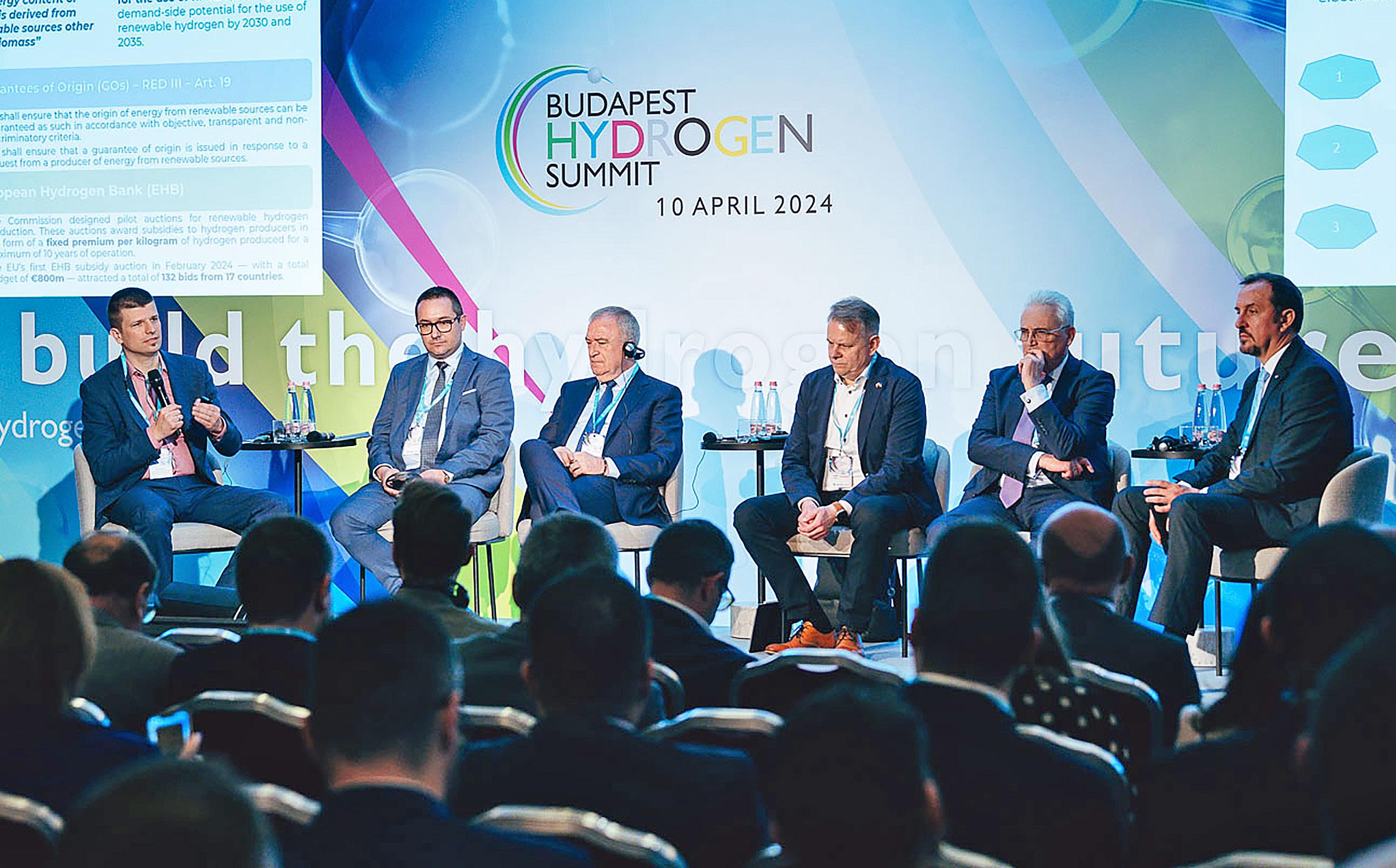
“Europe is diverse in many ways; so should be its solutions to the climate challenge,” said Bert De Backker, the Europe, Africa and Middle East policy manager at ExxonMobil’s low carbon solutions business.
State Secretary for Energy and Climate
Attila Steiner of the Ministry of Energy of Hungary opened the conference by highlighting that Hungary is currently dependent on fossil fuels. There are three main directions of Hungary’s policy objectives: firstly, to reduce demand for natural gas; secondly, to substitute natural gas with other gases (in which hydrogen has a clear role); and thirdly, electrification, which means energy would be produced locally.
Jorgo Chatzimarkakis, the GermanGreek CEO of Hydrogen Europe, suggested three objectives for the upcoming Hungarian presidency of the Council of the EU: a definition of green hydrogen; a definition of low-carbon hydrogen; and a focus on diverse technology.
Gabriel Szabó, downstream executive vice president at MOL Group, underlined that hydrogen will play a critical role in the energy transition, confirming MOL’s interest in further developing this growing market. The Hungarian oil and gas major has reached another important milestone, he said: green hydrogen production will soon commence at MOL’s Danube Refinery.
“It would be welcome if the next European Commission reviews the EU Hydrogen Strategy to openly recognize the role all forms of low carbon hydrogen (including natural gas and nuclear-based) can play in delivering a more cost-competitive solution to the EU industry because cost matters,” he emphasized.
Regional Approach
Regarding the challenges and opportunities along the hydrogen value chain, speakers highlighted that a more regional and panEuropean approach is needed.
“Answering FGSZ’s first non-binding hydrogen demand market survey last year, market participants in Hungary have already signalized meaningful demand for green hydrogen,” underlined Zoltán Gellényi, board member at transmission system operator FGSZ.
“To cover this need, both domestic production and significant import volumes might be needed. To establish adequate connections between supply and demand centers, the most costeffective and sustainable way could be repurposing parts of existing natural gas assets,” he explained.
“Given their industry expertise and good cooperation, natural gas TSOs are ready to engage more in the development and operation
of future hydrogen networks, but to connect ‘A’ to ‘B,’ they need to see exactly where the supply will come from,” he added.
OMV Petrom’s vice president for business development, downstream gas and power, Ionut Ciubotaru, also confirmed that it sees natural gas as a primary enabler of the hydrogen economy.
“The transition using natural gas is much smoother; without gas, it’s very difficult to achieve our goals in hydrogen. OMV Petrom just signed two financing contracts from the RRF for producing green hydrogen at the Petrobrazi refinery in Romania,” he explained. Ciubotaru agreed that partnership is key to developing the hydrogen economy and that proven technologies are necessary to take the first step.
Lessons Learned
Ákos Kriston, CEO of Hungarian Gas Storage (MFGT), shared the lessons learned from the Aquamarine project, which began trial operations in 2023. He underlined that the primary goal of MFGT for the mid-2030s is to become a large-scale seasonal electricity storage operator with hydrogen in the reservoirs, and the project is one of the stepping stones to achieve this objective.
Responding to the region’s fastexpanding demand for green energy, Tobias Puklavec, CTO and board chairman, shared the story and mission of Green Energy Park. The company will create a vertically integrated hydrogen value chain connecting upstream and
downstream through a mid-stream facility located on the island of Krk in Croatia, unlocking the potential of renewable ammonia.
As the hydrogen economy spans several industries, leaders of hydrogen mobility from Messer, Solaris, Resato Hydrogen Technology, and the Hungarian Mobility Development Agency (Humda) examined the role of hydrogen in fostering sustainable transportation solutions.
“Humba is committed to developing carbon-neutral technological diversity in transportation, which, alongside electrification, cannot overlook thinking along the entire hydrogen value chain,” said Virág Mészáros, CEO of Humda.
She added that it supports the implementation of the National Hydrogen Strategy through various activities, such as education and training, integration of stakeholders involved in the hydrogen economy, raising public awareness, career guidance, and implementing pioneering trials, such as the ongoing Hydrogen Fuel Cell Bus project this year, with its associated charging solutions.
The conference wrapped up with a final panel focusing on hydrogen cooperation in Central and Eastern Europe, featuring speakers from Ukraine, Slovakia, and Greece. They introduced the 3 Seas Hydrogen Council initiative, and the Ukrainian Hydrogen Council and the Hungarian Hydrogen Technology Association signed a memorandum of understanding to map and launch commercial opportunities related to hydrogen technologies.
10 | 2 Business www.bbj.hu Budapest Business Journal | April 19 – May 5, 2024
GERGELY HERPAI
A roundtable at the 3rd Budapest Hydrogen Summit on April 10.
Global Gas Leaders Converge on Hungary for 5th LNG Summit
The fifth edition of the Budapest LNG Summit, orchestrated by White Paper Consulting, heralded an assembly of 30 speakers, industry vanguards, and policymakers from more than 20 countries, uniting to chart the course of the liquified natural gas sector and the trajectory of critical regional projects.
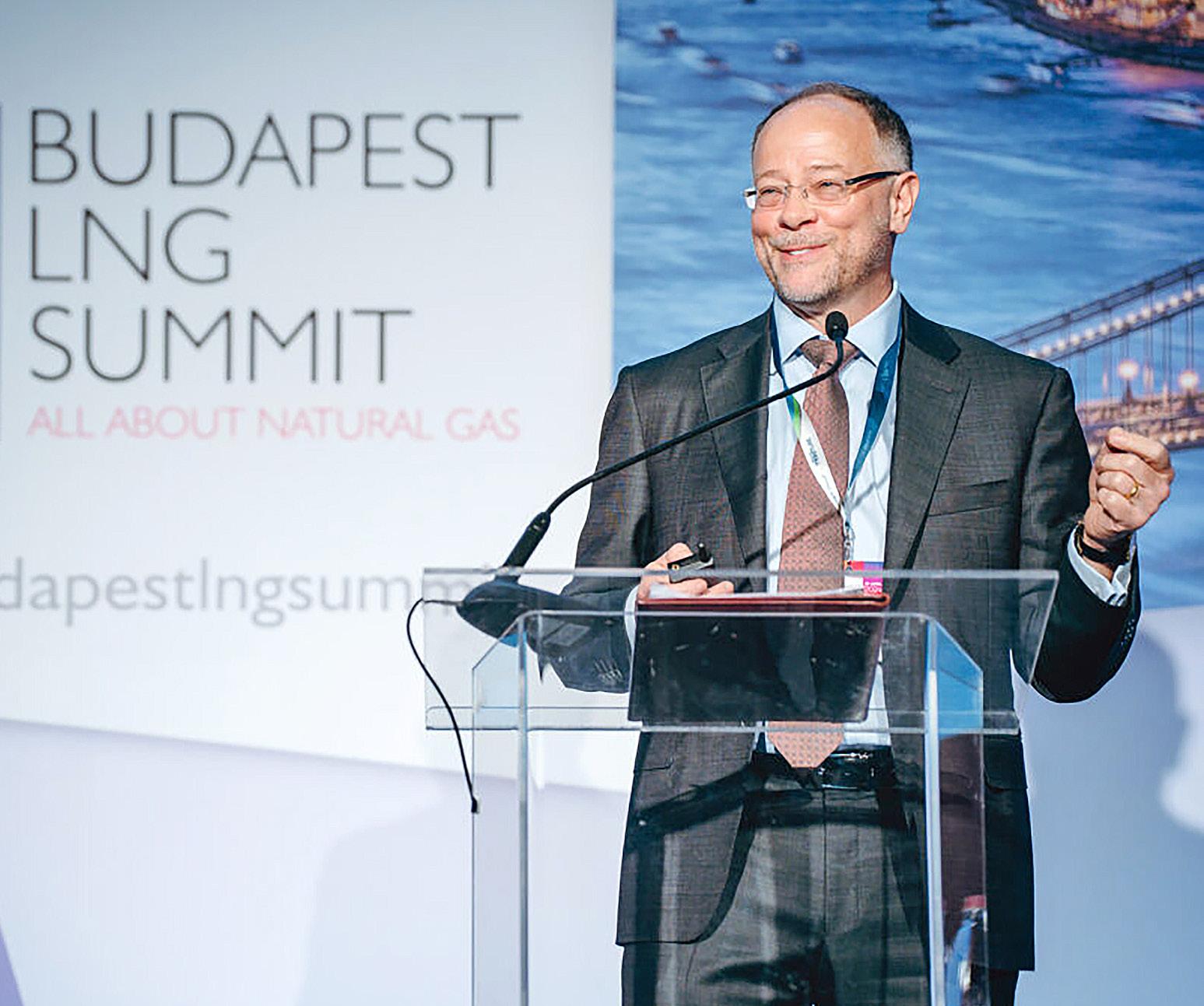
Jefferson Edwards, vice president of Shell Energy Integration & Fundamentals, unveiled his company’s LNG Outlook for 2024, an annual benchmark forecast dissecting the trends of the global LNG market.
Opening the conference, Hungary’s Minister of Foreign Affairs and Trade Péter Szijjártó articulated the need, as he saw it, to address energy supply as a matter grounded in physical reality, as opposed to ideological discourse. For Hungary, the essence of diversification is not the abandonment of existing energy sources but the pursuit of supplementary ones.
“We will continue to reject any pressure of a political nature, as we have done in the past,” said Szijjártó, referring to, if not explicitly naming, land-locked Hungary’s long-standing reliance on Russian natural gas.
The minister spotlighted the strategic importance of infrastructural development, citing success stories such as the construction of the Turkish Stream pipeline, the Slovakia-Hungary Interconnector, and the commercial LNG agreement with Shell, which Hungary is keen to extend beyond 2027.
Offering a global perspective, Gergely Molnár, an analyst at the International Energy Agency (IEA), forecasts a rebound in gas demand by 2024, with a worldwide gas consumption increase of 2.5%, predominantly driven by Asia.
That may prove relatively shortlived, however. “We expect gas demand to decelerate in the medium-term,” Molnár projected.
“Gas and LNG play a crucial role in both energy security and the energy transition. The global demand for LNG is estimated to surge by more than 50% by 2040, fueled by the industrial coal-to-gas switch in China and South Asia, and as Southeast Asian nations lean more on LNG to bolster their economic growth,” he said.
“Furthermore, LNG continues to be pivotal in ensuring the security of supply to Europe through diversification,” Edwards underscored.
Diversification is Key
Gergely Szabó, regional chairman of MET Central Europe, emphasized the energy industry’s need to revolutionize its product offerings and risk pricing strategies to brace for the next energy crisis, with diversification being key. “Any means of diversification is welcome,” he declared.
The summit also spotlighted the role of LNG in bolstering energy security, supply flexibility, and competitiveness.
“To tap into LNG from the U.S. and globally, long-term contracts are essential, offering certainty,” stated Franck Neel, a member of OMV Petrom’s executive board. He highlighted Romania’s milestone as a net gas exporter for the first time in 2023.
Discussing supply diversification and OMV Petrom’s ventures in the Black Sea, Neel expressed
Reflecting on the temporary halt in U.S. LNG exports and its implications for Europe, László Fritsch, CEO of MVM CEEnergy, admitted, “It was quite unexpected because it did not trigger a significant shock to the market. However, should this pause persist, it could profoundly impact global markets.”
Transitional Fuel
Regarding the future of gas, he signified that the market indicators are clear and gas will continue to serve as a transitional fuel in Europe for the next two decades.
Leaders from gas transmission system operators across Central and Eastern Europe provided an update on integrating the regional gas market and the flagship project of the Vertical Corridor.
“The Vertical Corridor is an exemplary initiative, rooted in the effective collaboration of TSOs and LNG infrastructure operators,” said Szabolcs I. Ferencz, CEO of FGSZ Hungarian Gas TSO.
“With minor modifications to the existing pipeline system, new alternative gas and LNG supplies could be unlocked, benefitting not just the Balkans, Ukraine, and the broader CEE region, but also enhancing market liquidity, integration, and competition,” he said.
confidence in the region’s potential, pointing to the company’s projects in Bulgaria while acknowledging the hurdles of volume and financing in the LNG market.
The ensuing panel discussion focused on LNG traders and their requisites, emphasizing the importance of flexible planning. Zoltán Rahóty, director of structured gas trading and LNG at MVM CEEnergy, observed that “cargos are being redirected to Asia, which may render Europe volatile.”
Asked about MVM CEEnergy’s longterm strategies, Rahóty revealed plans to start discussions with OMV Petrom regarding stakes in the Neptun Deep gas production project.
Eszter Szekeres, executive director of wholesale and portfolio optimization at MET Central Europe, pointed out the significant influence of global events on European gas prices, with approximately
20%
of Europe’s gas supply transitioning from pipeline to LNG in recent years. “Hence, even though price levels have receded to nearly pre-crisis figures, volatility persists,” she remarked.
Regarding diversification, Vitaliy Baylarbayov, deputy vice president of Socar, the State Oil Company of the Azerbaijan Republic, encouraged nations to consider Azerbaijan as a new partner in energy cooperation.
“What we value most is stability in relationships,” he stressed, advocating for the strategic use of oil and gas as a conduit in international relations rather than as a lever of power.
“It stands as a tangible solution to existing bottlenecks and exemplifies the realization of an efficient bidirectional transmission infrastructure capable of channeling additional supplies from the south,” Ferencz added.
Panelists echoed those sentiments regarding the project’s significance for regional energy security and development. They shared insights from their respective countries and outlined strategic investments within the Vertical Corridor initiative, such as the inauguration of the Alexandroupolis FSRU operations to bolster necessary capacity and Bulgaria’s investment in its transmission system.
György Berze, CEO of Hexum Földgáz, provided his perspective on the future of gas storage in Hungary, stressing the pivotal decision points for gas infrastructure operators in adapting their technologies to meet the shifting energy landscape.
The conference also featured insights from Ukraine’s Deputy Energy Minister Mykola Kolisnyk, who highlighted the critical role of natural gas in Ukraine’s energy strategy over the next 10 to 15 years. He emphasized the nation’s ambition to enhance its infrastructure and develop additional entry and exit points to support this vision.
Moreover, the impending European methane regulation was a key topic of discussion at the Budapest LNG Summit. The dialogue included sharing best practices for methane measurement among companies and addressing the urgent need to mitigate emissions from imports, underscoring the areas requiring heightened focus moving forward.
2 Business | 11 www.bbj.hu Budapest Business Journal | April 19 – May 5, 2024
GERGELY HERPAI
Jefferson Edwards, vice president of Shell Energy Integration & Fundamentals.
Industrial Developers Committed to Sustainability Accredited Complexes
The 45,000 sqm MG3 warehouse at HelloParks Maglód in Greater Budapest is the first industrial property in Hungary to achieve the Breeam “Outstanding” sustainability rating for New Construction, the highest standard in the third-party accreditation system.
BY GARY J. MORRELL
Sustainability accreditation is being increasingly utilized in the upper strata of the industrial sector, with regional developers and park operators such as Prologis, CTP, Panattoni and HelloParks developing more highly specified Breeam- and Leedaccredited complexes.
As with the office market, tenant demands are acting on market players as increasingly stringent environmental regulations simultaneously come to bear. However, the market still has a long way to go. According to Cushman & Wakefield, only 23% of the industrial stock in Hungary has any green certification.
“Tenants in Hungary are gradually encouraging landlords to provide renewable and energy-efficient solutions, thereby improving the ESG outlook for the stock. This indicates an area ripe for significant improvement in the short term,” says the consultancy.
HelloParks says it has seen this shift as an opportunity from the start, believing the winner will be the one who is seen as leading the way toward the green transition. The EU regularly introduces new legislation pushing and promoting the green transition and the shift to sustainable
Green Matters
A monthly look at environmental issues in Hungary and the region
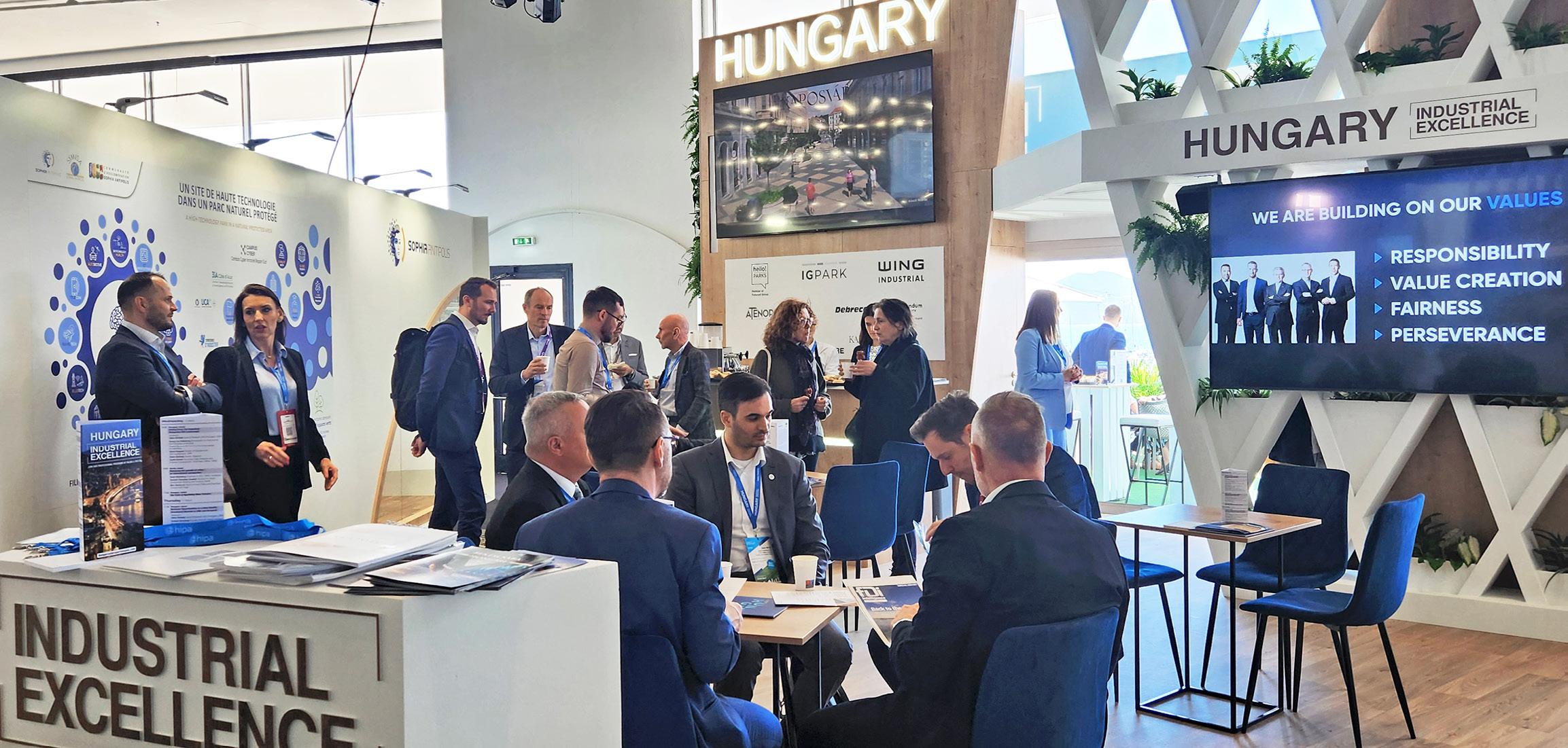
operations while also putting more pressure on the market, comments Anna Bencze, head of sustainability at HelloParks. She sees the main sustainability concern of tenants as efficiency in energy use.
“As a market leader, we have a major impact on the supply chain, and thus on the potential for reducing the carbon footprint of construction materials and introducing new good practices,” she says.
“We can also influence other players in the market by example, hopefully accelerating certain market processes, as our targets are ambitious and concrete, and we want to motivate the sector with them,” Bencze adds.
HelloParks says it is continuously comparing the performance of its buildings with the limits and science-based targets published by international voluntary carbon reduction and neutrality organizations, as well as those of countries that have already set more stringent, specific life cycle carbon limits, such as Denmark.
“These show that we are on the right track and that the decision to start very early on carbon reduction will pay off, as our buildings fit (and will continue to fit) these reduction pathways,” she argues.
“At the EU level, the assessment and certification of life-cycle carbon accounting will soon come to the fore in the context of the EU’s EPBD [Energy Performance of Building Directive], and we look forward to demonstrating our quantitative performance in this area. Our buildings comply with EU Taxonomy, which is designed to determine whether or not a project can be considered sustainable through the EU Sustainability Reporting Framework,” Bencze concludes.
The Hungary stand at the Mipim real estate expo sought to promote the country’s industrial excellence, amongst other things.
ESG Compliance the Norm
ESG compliance is becoming the market norm for real estate investment transactions, reflecting a broader commitment to sustainability from all parties. However, given the current investment environment, the timing in terms of ESG costs is not ideal. Investment volumes for Hungary fell by 52% year-onyear for 2023. Sellers are, therefore, re-assessing their strategies and optimizing their portfolios in terms of letting capabilities with regard to ESG compatibility, said Kevin Turpin, head of CEE capital markets at Colliers, at the recent Sustainable Investment Breakfast by Colliers and Dentons at the W-Hotel Budapest.
Sustainability Accreditation Spreads to More Property Sectors
After the office and industrial sectors, sustainability accreditation is likely to become increasingly common in several other property sectors as the emphasis on environmental sustainability grows across industries, comments Zsombor Barta, sustainability consultant and ambassador for the Hungarian Green Building Council. With the rise of ecoconscious consumers, retail properties will face pressure to demonstrate their commitment to sustainability. Retailers may seek sustainable accreditations for their stores and shopping centers to appeal to environmentally conscious customers and differentiate themselves. Hotels and resorts increasingly adopt sustainable practices to reduce their environmental footprint and appeal to environmentally-conscious travelers. As consumers become more aware of the environmental impact of their homes, residential developers may
seek sustainability accreditations for their housing developments. Healthcare facilities recognize the importance of sustainability in providing high-quality patient care while reducing operating costs and environmental impact. Barta adds that educational institutions, including schools, colleges, and universities, are increasingly incorporating sustainability into their campus planning and operations.
Hungary a European Center for Green Automotive Production
The decision by BYD, the globally leading Chinese maker of electric and plug-in hybrid vehicles, to locate its first European EV manufacturing plant in Szeged after securing a 300-hectare site in the city is seen as a further success in attracting the sector to Hungary. The pro-active strategy of the Hungarian Government and city authorities across Hungary is seen as a significant vehicle for job creation jobs and enhancing green industries in regional Hungarian hubs.
“The newly announced project underscores not only the Hungarian Government’s strategy to be a pioneer of electric automotive manufacturing, but it also showcases its successful cooperation with Chinese customers,” said the Hungarian Investment Promotion Agency.
“Hungary proved to be the perfect location for BYD’s first European e-car manufacturing plant due to its business-friendly environment, available and welldeveloped infrastructure and logistics connections, skilled workforce and dedication to a green energy transition,” concludes Hipa.
12 | 2 Business www.bbj.hu Budapest Business Journal | April 19 – May 5, 2024
Wizz Air Looking to Sustainable Air Fuels to Take Flight
The ultra-low-cost airline Wizz Air, which claims to be Europe’s fastest-growing and greenest airline, has announced that it aims to operate 10% of its flights using sustainable airline fuel by the end of the decade.
the spread of SAF by providing incentives to fund the fuel’s production.
Wizz Air targets reducing the release of carbon dioxide per passenger kilometer by another 25% before 2030 and plans to strengthen its position as a leader in environmental sustainability in the market.
To further promote SAF, Wizz Air is contributing GBP 5 million (HUF 2.1 billion) to fund the research and production of sustainable airline fuel with its British partner, sustainable fuels developer Firefly. The airline’s financial support was recognized with the Strategic Investment of the Year Award for Europe at the 2023 SAF Investor Awards in London in February.
Yvonne Moynihan, corporate and ESG manager at Wizz Air, has told the Budapest Business Journal that policymakers should support
“Wizz Air is celebrating its 20th anniversary this year, having grown from a small airline to an international pioneer of sustainable aviation and affordable travel. In addition to fleet renewal and efficient operations, sustainable jet fuel is a key element in reducing aviation’s carbon footprint,” she says.
“Our investment in Firefly, which will reduce lifecycle emissions by 100,000 tonnes of carbon dioxide equivalent per year, reinforces our commitment to make the use of SAF commonplace in our operations by 2030. However, achieving our ambition will require greater SAF production and use in the aviation industry. We therefore call on policymakers to remove barriers to the widespread uptake of SAF by encouraging production, price support and promoting additional sustainable feedstocks for biofuel production,” she concludes.

Wizz says its carbon emissions decreased by 6.8% between 2022 and 2023, and it achieved the lowest average carbon dioxide per passenger kilometer in 2023 at 51.5 grams. The latter comes with a caveat, however, as the airline admits that, due to differences in the reporting period, the figures and timeframe are not fully consistent.
Environmental accolades won by Wizz include Most Sustainable Dedicated Airline at the World Finance Sustainability Awards in 2021 and 2023 and Global Sustainable Airline of the Year in the Capa Center for Aviation Awards in 2022 and 2023.
In other unconnected Hungarian aviation news, Ferenc Liszt
International operator Budapest Airport announced that from June 27 onward, China Southern Airlines is launching a new scheduled route with four flights per week to Guangzhou. Flights will take place on Tuesdays, Thursdays, Saturdays, and Sundays. The airport says the noon take-off slot will ensure that passengers arrive in Guangzhou between 7-8 a.m. local time the following morning, giving them a wide choice of connections.
The new route means that, by the summer, there will be 17 weekly flights (and an additional 250,000 seats this year) between Budapest and various parts of China. Budapest Airport says that this will strengthen Hungary’s trade opportunities as the Guangzhou region contains some of the world’s largest IT and renewable energy research firms, as well as the headquarters of several significant investor companies in Hungary, including BYD, Huawei, ZTE, Sunwoda and Eve Energy.
“With this, we can announce our fifth Chinese destination accessible from Budapest, offering excellent connectivity to Southeast Asia, Australia, and New Zealand, and a key link for the Hungarian economy,” says Balázs Bogáts, the deputy chief commercial officer of Budapest Airport.
E-VAT a Competitive Advantage for Early Adopters
Using the eVAT system launched on Jan. 1, companies can reduce the time spent preparing returns, save on costs, and increase the accuracy of the data reported to the tax authority. This not only results in increased taxpayer security but also significantly reduces the risk of VAT audits.
Starting from the beginning of this year, companies in Hungary can submit their VAT returns in one of three ways: 1) in the usual way, using the ÁNYK (General Form Completion Tool); 2) by approving the recommendation prepared by the tax authority on the online interface; and 3) using a machine-to-machine connection, by linking the company management system with the National Tax and Customs Administration (NAV) system. The tax authority has gradually implemented the eVAT system function. At the start of the year, only the data queries related to VAT returns were available; returns could be submitted at the beginning of February. The next major step in development will take place when the self-revision function goes live, which is expected this summer.
Tax Return of the Future
In addition to eVAT helping to increase the speed and accuracy of the VAT return
process for companies, the development is also significant because, in the coming years, it is expected to be extended to returns for all other company tax forms, including corporate tax and local business tax. The use of the eVAT system is not yet compulsory: the process started in January has most likely kicked off a twoto-three year transition period. After the outdated ÁNYK framework is phased out,eVAT will remain the only option.
Advantages for Taxpayers
The VAT return form recommended by NAV is the right solution for the majority of micro and small enterprises, as it removes administrative burdens.
The M2M link is expected to be used by medium-sized and larger enterprises. For companies where compiling and submitting the VAT return is complex or time-consuming, this return format may offer advantages even in the short term. In their case, the transition may lead to time and energy savings, providing an advantage over competitors.
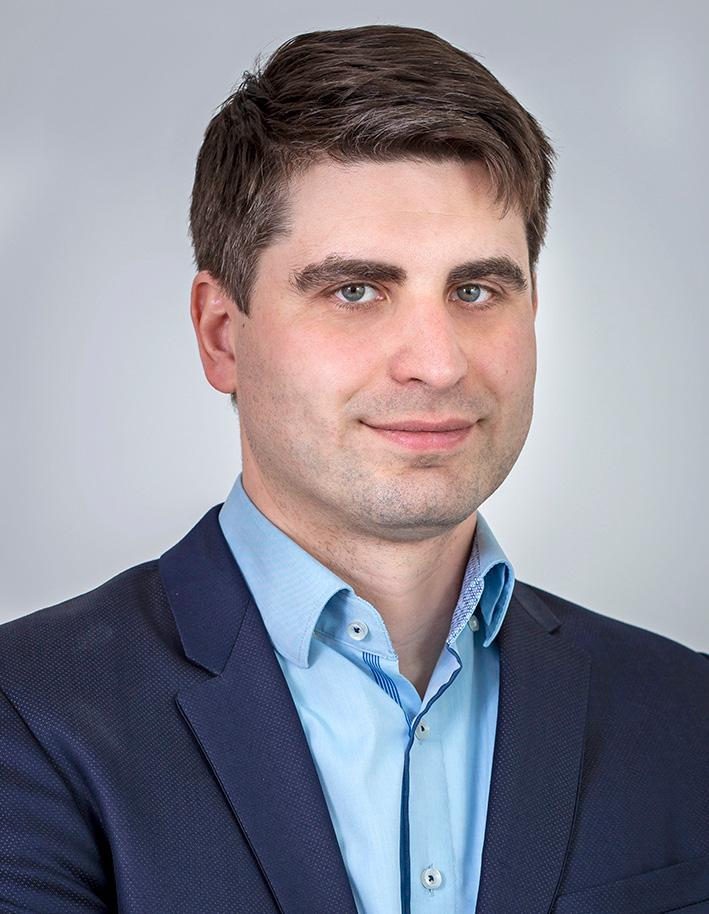
It is also worth pointing out that the M2M link and the analyses provided by the tax authority can contribute to cleaning taxpayer data, thus significantly reducing risks and any penalties imposed during subsequent audits. This is especially interesting because the recently published audit plan shows that NAV intends to focus on auditing data reporting. This means the tax authority has a vested interest in increasing users in the new system, which is why the legislature introduced several incentive amendments to the act
on the taxation rules last fall. Under one such, taxpayers who choose the M2M return method do not have to pay a selfrevision fee when remedying errors as part of self-revision within 15 days of submission. Under the other option, made available to reliable taxpayers, the tax authority will not launch tax audits within 15 days of the tax return submission by users who submit returns in the M2M eVAT system, allowing them to correct any possible errors.
How and When?
In most cases, an interface is required to apply the M2M return method, in other words, to link the accounting or company management systems used by the companies to the NAV system, which converts the data kept by the taxpayer into the structure expected by the tax authority. A software solution that offers an effective solution together with tax consultancy support is already available.
In addition to the arguments and advantages listed above, activating the eVAT system’s self-revision function this summer also incentivizes the change. Companies scheduling implementation to coincide with this introduction should start preparations now.

2 Business | 13 www.bbj.hu Budapest Business Journal | April 19 – May 5, 2024
CONTENT
MAJA PÉNZES
PRESENTED
BENCE BARTA
Bence Barta, partner at Andersen Adótanácsadó Zrt.
Image by Ivan Marc / Shutterstock.com
3 Country Focus
South Korea
Korean FDI in Hungary: Aiming Far Beyond Simple Co-existence
South Korean investors are choosing to expand their European footprint in Hungary in ever larger numbers. The project catalog of the Hungarian Investment Promotion Agency gives a clear snapshot of why and how.

Although mass-scale production in W-Scope’s EUR 720-million separator film plant, a Hipa-guided project, is not due until 2025, the Korean company is eager to blend in at the community level. Earlier, it signed up a large team of staff members to participate in a pig slaughter contest, a traditional cultural event in Nyíregyháza (230 km east of Budapest by road), the large town that hosts the factory. Fun fact: the firm also had Korean meat shipped in to present their culinary heritage alongside that of Hungary.
Given that W-Scope is just one of the roughly three hundred Korean firms operating all over Hungary, such locallevel interaction is commonplace by now. The separator film maker will create up to
1,200
new jobs, but that headcount is dwarfed compared to Hankook Tire or battery giants such as Samsung SDI and SK On, which employ around three or four times more.
The advance of investors from the East Asian country has been going on for a while now in Hungary. Hipa has closed deals worth a combined EUR 10.5 bln in the past five years alone, creating 14,000-plus
Hungarian-South Korean Economic Relations (2023, in billion USD)
Bilateral Trade (Export+Import) up 31% y-o-y
Source: HIPA
jobs. In that same timeframe, South Korea topped the investment volume chart no less than three times in 2019, 2021, and 2022.
“Korean investors made capital pledges worth nearly EUR 2 billion last year alone, which reflects the continued dedication of their business community to strengthen their presence further here,” says István Joó, CEO of Hipa. “We welcome such endeavors as it is in our vital interest to attract capitalrich Asian stakeholders that bring cutting-edge technology and invaluable knowledge transfer to Hungary. Their investments are also paramount to help the economy get back on a growth track.”
Infrastructure Expansion
As the Korea Trade Investment Promotion Agency (Kotra) noted in a recent report, Hungary, unlike other European peers, remains open to investments from
Untapped Opportunities in Technology and Knowledge Transfer
Hungary and Korea are working closely together to explore new layers of cooperation. At a recent Economic Innovation Partnership Program (EIPP) event, high-level representatives of both sides discussed how the benefits of technology and knowledge transfer could be exploited more effectively. The EIPP primarily focused on the development of e-mobility and carbon neutrality. Relying on a previous cooperation agreement signed in 2022, Hungarian researchers and experts will have ever more chances to take part in scientific and innovative technology projects.
Korea and China. On the other hand, the stability of Korean businesses will be primarily determined by the speed at which infrastructure is established to facilitate manufacturing, Kotra added.
According to Joó, the government and Hipa are fully committed to making all necessary infrastructure available in a timely manner.
“We are aware of the importance of the issue, and we are working closely with ministries and authorities to make sure that the announced projects can be implemented on schedule,” he says.
As illustrated by several measures, Korea plays a pivotal role in the Hungarian economy. The Asian country forms the third-largest investor community and is
Hungary’s 12th
most significant trade partner. Bilateral trade has been soaring by well above 30% in both of the past two years.
The most recent Korea-related FDI deals tell a tale of intensifying investor activity in the automotive sector. Leading automotive thermal solutions supplier Hanon Systems is investing EUR 117 million to develop three of its sites in Hungary and also plans a training program.
Large-scale Investment
In addition, LG Magna e-Powertrain, a joint venture between LG Electronics (of Korea) and Magna (the Canadian automotive component supplier), announced that it would build its first European production facility in Miskolc (195 km northeast of the capital) in an investment worth EUR 51.6 mln, at IAA Mobility 2023, the world’s largest mobility gathering. Hankook Tire has initiated an
HIPA-guided South Korean Projects (2014-2023)
Projects
54
Investment volume EUR 11.8 bln New jobs almost 17,000
Source:
even larger-scale project: the company is building a gigantic 66,000 sqm tire plant for close to EUR 540 mln.
Research has also received a marked boost lately, with Samsung SDI pledging to invest
EUR 61.9 mln
to implement the most extensive R&D project in the history of Hungarian investment promotion to date.
“Samsung SDI has been operating here for a few years, and we knew that the day would come soon when the company was ready to take cooperation to a whole new level that represents high added value,” Joó notes.
All the signs point to Korea and Hungary being keen on deepening relations. Take the bilateral memorandum of understanding the countries signed one year ago. As was pointed out back then, the MoU aims to expand cooperation from the automotive and electronics industries to the biotechnology and pharmaceutical sectors by enhancing ties between institutions of higher education in the two countries, among others.
Interactions at the local community level are just as important, and, as showcased by the example of W-Scope’s pig slaughter engagement, such bonds are also being formed not just to pave the way for simple co-existence but to build genuine human connections.
Domestic Finance on Your Overseas Doorstep
In response to the remarkable investor activity, the Korean banking system is also expanding its footprint in Hungary. After two commercial lenders and one stateowned one, a fourth market player, Hana Bank, announced it would set up shop in the country.
“Our Budapest office is expected to assist Korean battery businesses inking deals, as aided by market research and local business networking organization,” a Hana Bank official said. Shinan Bank Co. Ltd. and Woori Bank arrived in 2021, and the state-run Korea Development Bank also has a subsidiary here, KDB Bank (Hungary) Zrt.
www.bbj.hu Budapest Business Journal | April 19 – May 5, 2023
BBJ STAFF
HIPA
PRESENTED CONTENT
LG Magna e-Powertrain is setting up its first European plant in Hungary to produce e-motors and inverters.
in Brief News South Korea
Korea a Target for Hungarian Wines
Hungarian wines are gaining traction in the South Korean market, among others. An upcoming “wine summit” will look to build on that potential. More than 100 foreign sommeliers, wine traders, and writers will participate in the Hungarian Wine Summit, slated for April 21-25, the organizer has said. The Hungarian Wine Marketing Agency was launched recently to raise the profile of Hungarian wines abroad, Pál Rókusfalvy, the government commissioner for national wine marketing, said at a press conference. He added that the agency has identified primary and secondary markets based on research and gauged demand for different types of wine. He said that Hungarian white wines remain the most popular abroad, accounting for 86% of exports last year. While Hungarian wines are promoted regularly in Germany and the United Kingdom, they are enjoying a more active presence in China and gaining ground in markets in South Korea, Poland and the United States, Rókusfalvy added.
MNB Fines KDB Bank HUF 54 mln
The National Bank of Hungary (MNB) fined South Korean-owned KDB Bank HUF 54 million earlier this year for failing to comply fully with regulations on enterprise management, internal controls, risk management and IT security. The violations did not put the lender’s reliable operation at risk, said the MNB, which was acting in its capacity as central bank and financial market watchdog.
AutoWallis Secures Importer Rights for SsangYong
Hungary’s AutoWallis has secured importer rights for South Korea’s SsangYong brand for Bosnia and Herzegovina, Kosovo, Montenegro and Serbia, the listed car seller said
in an announcement on the website of the Budapest Stock Exchange. AutoWallis is now the exclusive importer of the SsangYong brand in nine countries in the region, including Hungary, Romania, the Czech Republic, Slovakia and Austria. CEO Gábor Ormosy said securing the importer rights could pave the way for new acquisitions, strengthening the business’ stable growth and raising shareholder value further. AutoWallis’ SsangYong sales rose 50%, to close to 11,000, last year.
Hungarian, Korean Experts Meet at EIPP Event
Experts from Hungary and South Korea discussed opportunities for technology and knowledge transfers at an event in Budapest earlier this spring organized under the Economic Innovation Partnership Program, the Ministry of National Economy said in a release on its website. The focus of the EIPP, which paves the way for the involvement of Hungarian researchers in projects, is e-mobility and the development of carbon-neutral transportation, the ministry said. Addressing the event, Deputy State Secretary for Technology Szabolcs Szolnoki noted that South Korea had been the biggest foreign investor in Hungary in 2021.
Court Orders HUF 1.827 bln in Damages for Hableány Victims
A Budapest court ordered the payment of HUF 1.827 billion in damages to the victims and relatives of victims of a boat accident in the Danube, according to state news agency MTI. The ruling, made late in February, may be appealed. Seventy-eight plaintiffs initiated the civil case after the Viking Sigyn cruise ship collided with the Hableány, a much smaller tourist vessel, which capsized and sank five years ago on May 29, 2019. Of the 33 South Korean passengers and two Hungarian crew on board, 27 perished, and one body was never recovered.

Making Sustainability a Legal Obligation: the Hungarian ESG Act

Hungarian companies face
accelerated environmental, social, and governance reporting obligations under the new ESG Act, reshaping corporate accountability and sustainability measures ahead of EU directives.
As an international law firm advising foreign investors in all business law disciplines, D’Ornano Partners is committed to assisting companies, investors, and other stakeholders in navigating ESG and sustainability challenges under the Hungarian ESG Act. In recent months, the firm developed a specific offering for South Korean clients by creating a Korean Desk, headed by a Korean lawyer, equipped to offer legal support to Korean clients in CEE and SEE, including advice related to the Hungarian ESG issues presented below.
In fact, according to the new act, companies will be required to report on their sustainable operations earlier than is anticipated by the EU and as early as next year for some.
By adopting the ESG Act on Dec. 12, 2023, the Hungarian Government aimed to address two critical issues with one solution, immediately imposing two new reporting obligations on large Hungarian-based companies.
At its core, the act seeks to provide an objective assessment of companies’ sustainability efforts. Amendments to the Accounting Act compel businesses to present the nonfinancial facets of their operations in a standardized format, aligning with EU standards. The sustainability disclosure obligation is of particular significance, mirroring the EU’s Corporate Sustainability Reporting Directive.
Supply Chain Integrity
Additionally, companies must disclose the environmental integrity of their supply chain operations, effectively integrating the EU’s Corporate Sustainability Due Diligence Directive into Hungarian law. Companies will have to prepare an ESG strategy,
set up an ESG risk management framework, regularly analyze risks, implement proactive and remedial ESG measures internally, implement ESG measures for direct suppliers, evaluate risks among indirect suppliers, and prepare reports on the fulfillment of their ESG obligations.
The ESG Act initially targets large companies of public interest, who will first have to publish their ESG report related to 2024 in 2025 if two of the following three indicators exceed the following thresholds in the previous year: a balance sheet total exceeding HUF 10 billion; a net turnover exceeding HUF 20 bln; or an average number of employees of 500 or more. A year later, in 2026, all large companies will be required to do so, with the threshold for the number of employees reduced to 250. Finally, in 2027, all public-interest small- and medium-sized companies, irrespective of balance sheet, annual net turnover, or number of employees, will be obliged to publish their ESG accounts. For international groups, including data on their Hungarian operations in the consolidated EU-wide report will suffice. Companies should have their ESG reporting audited by a registered ESG certifier.
Despite the law’s initial applicability to only a handful of Hungarianheadquartered companies, the ripple effects are felt across the business landscape. Large companies are tasked to collect data on emissions, energy use, sources, and waste management from all their subcontractors to obtain an accurate picture of their operations. This poses a significant challenge for many companies as they may not have recorded such data before, lacking complex corporate governance processes.
The legislation provides a framework for reporting obligations, whereas the specifics will be detailed by the newly established ESG Council, overseen by the Minister of National Economy and submitted to the Supervisory Authority for Regulatory Affairs (in Hungarian: “Szabályozott Tevékenységek Felügyeleti Hatósága” or “SZTFH”), appointed as the monitoring and management body. These rules must be published in a decree by July 1. Additional provisions, such as rules for auditors and the authority of the SZTFH to impose fines, will come into effect later, respectively, in 2025 and 2026.

3 Focus | 15 www.bbj.hu Budapest Business Journal | April 19 – May 5, 2024 NOTE: ALL ARTICLES MARKED INSIDE VIEW ARE PAID PROMOTIONAL CONTENT FOR WHICH THE BUDAPEST BUSINESS JOURNAL DOES NOT TAKE RESPONSIBILITY
INSIDE VIEW
D’Ornano Partners François d’Ornano Managing Partner
www.dornano-partners.com
Photo by Esfera / Shutterstock.com
Hallyu Hungary: How This Country Embraced the Korean Cultural Wave
I had assumed that the Korean Cultural Center, an oasis of elegant tranquility on the Buda side a short walk from Margaret Bridge, was the second largest KCC after the one in Japan simply because South Korea is one of the largest foreign investors in Hungary. Not true.
The real explanation, as the Center’s Director Yu Hye Ryong told me, lies in this country’s astonishing embrace of what’s called “Hallyu” or the Korean Wave, manifesting as K-pop, K-drama, K-style, K-beauty, K-food, K-lit and K-knows what next.
Hallyu is the phenomenally successful soft power strategy cannily employed by the South Korean government to generate revenue from exports and tourism.
After the South Korean economy crashed in 1997, its government was forced to ask the IMF for a USD 57 billion emergency loan. Afterward, the government worried that its credibility as a place to do business had been damaged.
The president at the time, Kim Daejung, admired the way the United States generated revenue from movies and the United Kingdom from musicals and decided to create a Korean pop culture based on their example. He also wanted to stop Japanese cultural imports from flooding his country. Dae-jung first used the word hallyu in a speech in 1998.
Subsequent presidents built on Dae-jung’s strategy.

President Lee-Myung-back created the Presidential Council on Nation Branding in
2009.
In 2017, President Moon Jae-in promised to “increase the number of global Hallyu fans to 100 million.”
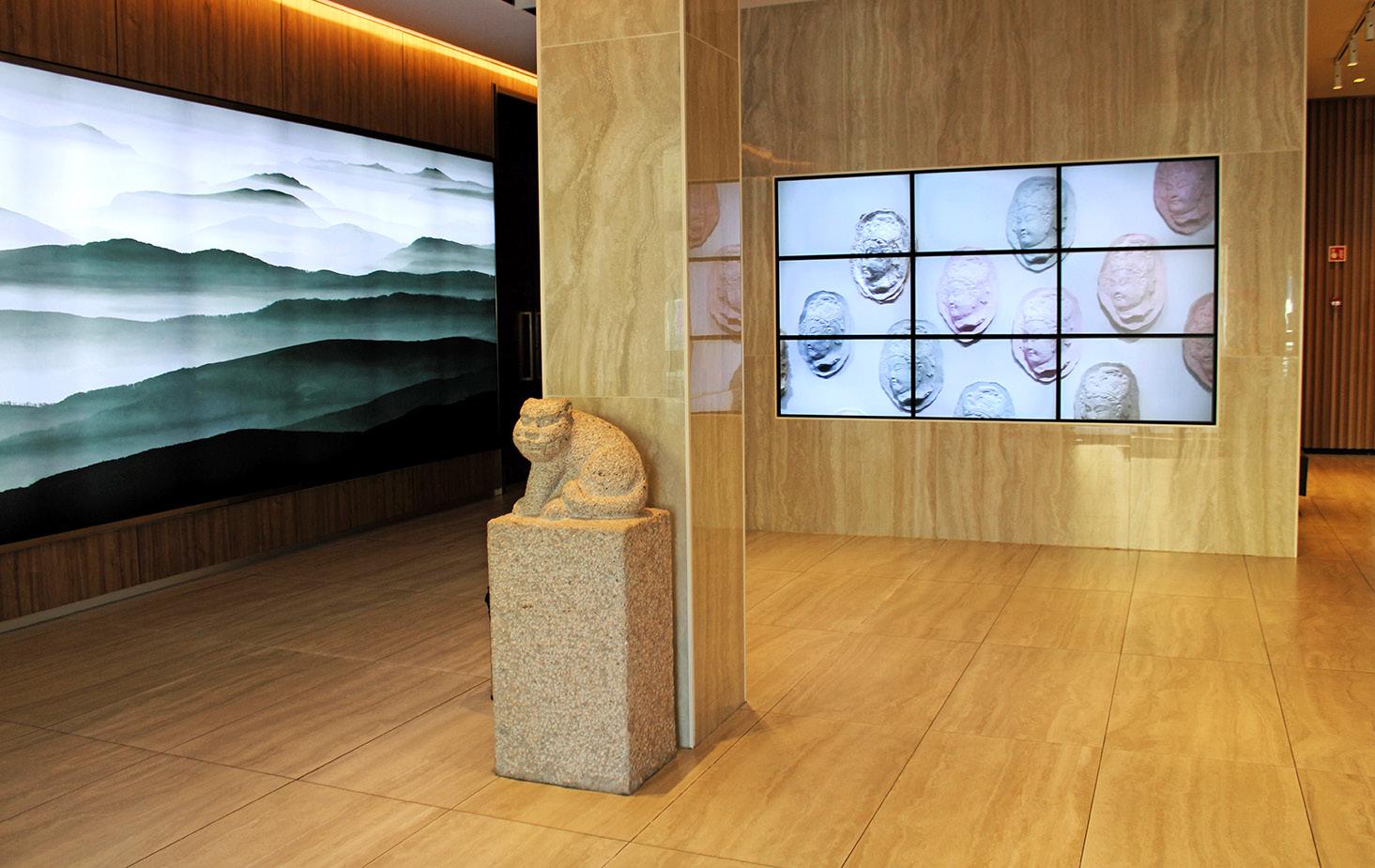
Thanks to a K-drama TV series called “Jewel in the Palace,” which first aired on Netflix in the 2000s and was a hit in this country, Hungary became a hotbed of European hallyu fanaticism early on.
When I asked Yu why she thought Hungary fell so hard for “Jewel in the Palace,” she answered: “I think it’s because the story is creative, but the characters and their emotions are relatable to any audience. The characters are not superheroes. While the Korean setting makes foreign audiences feel they’re watching something exotic, they can connect with how the characters are feeling and behaving.”
Korean Fairytales
This is undoubtedly true of Hungarian fans of K-dramas and films I’ve spoken to. One gushed, “I love the Korean TV series that are set in the past and are like fairy stories. They’re escapist and fascinating to me because they’re about another culture, another time. The scripts use metaphors we don’t have in Hungary, but they mean something to me,” my source said.
“For example, when I saw the Korean American movie ‘Past Lives,’ I really liked it when Nora, the female character, said that her relationship with her American partner was like ‘planting
two trees in one pot. Our roots need to find their place.’ My friends and I write these aphorisms down. We learn from K-dramas. Also, having watched so many, I can now tell when the students in my local Starbucks are speaking Korean and not Chinese.”
Part of the appeal of K-dramas for this fan is the way the characters look. “They always have such nice skin and hands,” she said, “even the men.”
This is no doubt down to the stars’ K-beauty routine. Focused on health, hydration and making skin glow (South Koreans love what they call “glass skin”), Korean beauty brands began to make their global mark in 2011. The K-beauty industry is forecast to be worth
USD 21.8
bln
by 2026.
My first taste of K-anything was the 2012 earworm pop song and video “Gangnam Style” by Psy. Despite its specificity and seeming disposability, “Gangnam Style” had a palpable impact on the Korean economy, not just global awareness of its pop culture. Tourism to South Korea, specifically the Gangnam district referenced in the song, soared. Just as the country’s Hallyu architects had hoped.
K-pop, mainly in the person of visionary Lee Soo-man, seized the “Gangnam Style” baton and ran with it. Having seen MTV in the US in the 1980s and grasped the idea that the future of pop was in images, not the music itself, Lee began auditioning, training, producing, and managing K-pop groups while developing the technology to make their videos.
SM Entertainment, which Lee founded, introduced the boy band H.O.T. in 1996, widely considered the first K-pop idols. Yu believes that the model of intensive training for future K-pop stars pioneered by SM is responsible for the quality and popularity of bands such as BTS.
Pitch Perfect
“Korean production companies invest heavily in K-pop stars way before they make their debut,” she told me. “They go through several years of vocal, dance and acting lessons. That’s why they’re almost perfect from the very start.”
Today, far and away the most popular K-pop band is BTS, managed by Hybe, which owns a stake in SM. Their nearest rivals are all-girl Blackpink. And, lest it is thought that K-pop stars are just grinning, dancing puppets, it’s worth remembering that BTS has addressed the UN on climate change (take that, Bono), and K-pop fans are increasingly becoming activists. In 2020, they raised over a million dollars for Black Lives Matter in 24 hours.
K-drama and K-pop stars are now hugely influential fashion ambassadors. K-drama star Song Hye-Kyo represents the luxury brand Fendi. Lee Min Ho is the ambassador for Louis Vuitton. Ji Chang Wook was selected as Calvin Klein’s first Korean global model. K-pop stars J-Hope and Jimin from BTS appeared at the Dior show at the Autumn Winter
2023
Paris Fashion Show.
Another member of BTS, Jungkook, is known as the “Sold Out King” because
16 | 3 Focus www.bbj.hu Budapest Business Journal | April 19 – May 5, 2024
DAVID HOLZER
Photos of the Korean Cultural Center by Gabriella Kiss.

when he wears, uses, or consumes a product, it sells out, even if it costs thousands of dollars.
And it’s not just K-stars promoting international luxury brands. Homegrown South Korean brands, from ADER Error to Youth, are rapidly finding a global audience.
Even I, who can hardly claim to be a fashion expert, have noticed the influence of K-style on the Hungarian high street. I’ve recently seen several women wearing a combination of loosely belted, usually camelcolored raincoats matched with
clunky shades and big trainers that look to be pure K-style. Apparently, this is called “soft office core.”
Director Yu, appointed in February of this year, was candid about why this country is home to the planet’s secondlargest Korean Cultural Center.
Hungary Says ‘Hallyu’ “Hungary
has the largest number of groups and communities of fans of Korean culture in the world, more than 200,” she said. “In 2016, they came together to form the HanYou Foundation.”
The mission of the Korean Cultural Center is twofold. The first is to promote Korean culture and enhance the country’s brand image.
“It’s clear that many Hungarians know about Hallyu, but they aren’t deeply familiar with our culture,” Yu says. The second mission is to strengthen cultural relations between the two countries. For Yu, it’s clear how popular Korean culture is in Hungary.
“We offer more than 10 language classes and
60 cultural classes, including K-pop dance, Taekwondo and traditional calligraphy. They’re usually 90% booked on the first day we offer them,” she explains.
Yu says she felt very much at home in Hungary from the moment she arrived, which surprised her as the countries seem, on the face of it, to be so different.
“I think it comes down to the historical and cultural similarities between us,” she told me. “My Hungarian friends who’ve visited Korea tell me they’re at home in my country, too.” Yu tallies off the connections.
“It’s because Hungary and Korea are both surrounded by big countries and have been invaded several times throughout our history. But we’ve managed to preserve our own culture and tradition and respect that about each other. We also put a high value
on family and tradition. And we love spicy food. There are more than 30 Korean restaurants and bars in Budapest, and only 8,000 Koreans live in Hungary. When I go to a Korean restaurant, it’s mainly Hungarians enjoying the food,” she points out.
Yu has yet to experience the saunas and steam baths here, the other cultural tradition Hungary and Korea share, but she fully intends to. In the meantime, she’s a fan of Budapest. “There are plenty of cultural events going on,” she said. “I enjoy visiting the galleries, churches, museums and, of course, Buda Castle. I feel so grateful to be in such a culturally enriched setting.”
As Director Yu Hye Ryong says, there are around 30 Korean restaurants and bars in Budapest. If you’re curious, these include Jindo, The Gangnam, Moim, Nanum, K-café and Koreanstyle pubs Dal Buam and Seoul Pacha. Should you want to learn how to prepare Korean dishes, find out more about the cooking courses at the Korean Cultural Center at www. hungary.korean-culture.org/hu.
Find out more about the HanYou Foundation at www.hanyou.hu.
3 Focus | 17 www.bbj.hu Budapest Business Journal | April 19 – May 5, 2024
ADVERTISEMENT
4Special Report
Human Resources
Generational Diversity: Insights From AmCham’s HR Dream Day
The American Chamber of Commerce in Hungary’s sixth HR Dream Day marked a significant milestone in promoting workplace diversity under the banner
“Together We Thrive: Building Bridges, Breaking Barriers.” This year, the spotlight was on generational diversity, a timely focus given the unprecedented coexistence of five generations in today’s workforce.
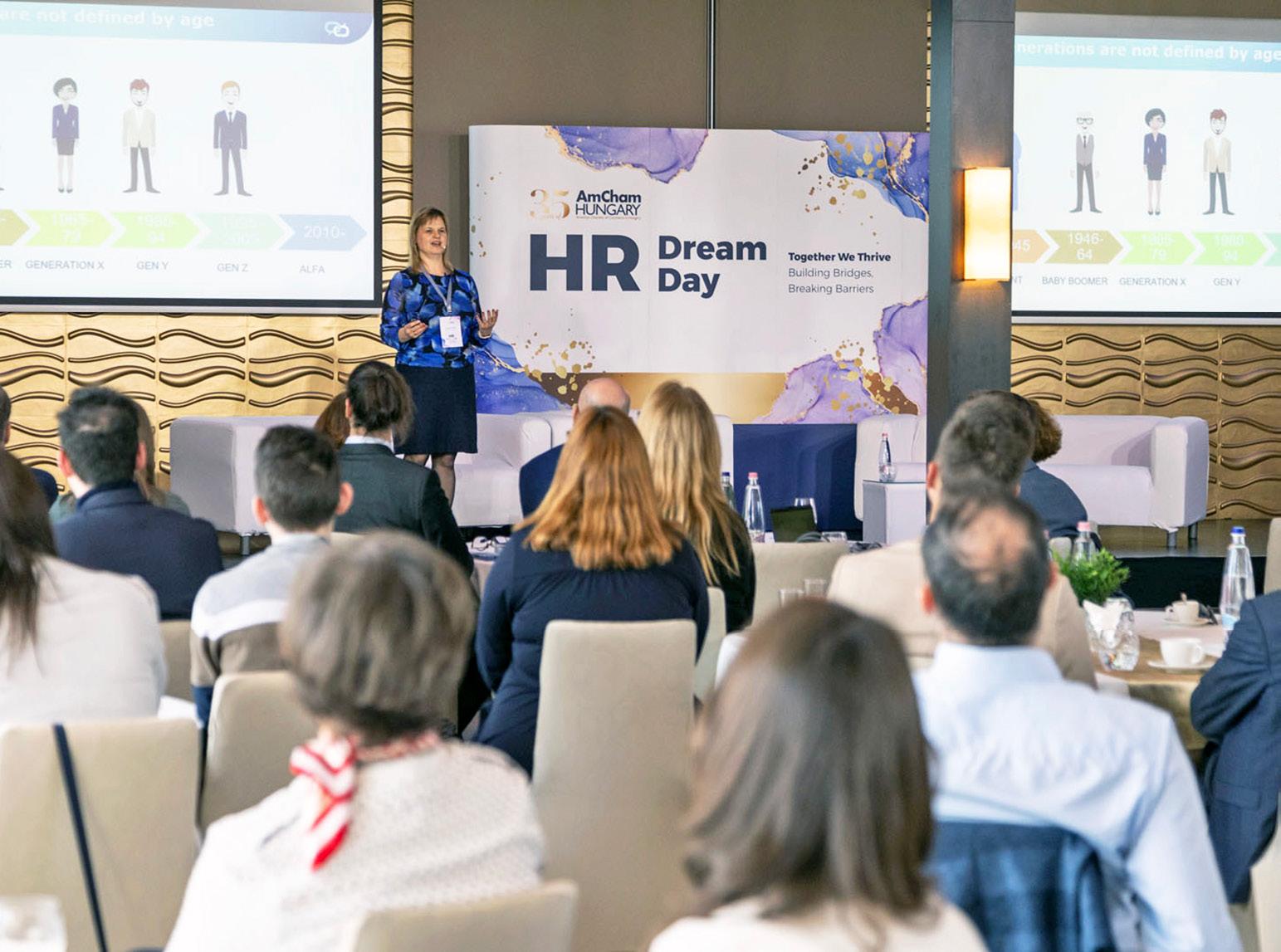
DNA,” he said. It was a theme on which Andrea Juhos, leading AmCham Hungary’s Diversity Working Group, elaborated. “Inclusion is not a matter of political correctness; it is the key to growth,” she said, quoting Jesse Jackson.
“Embracing generational diversity is not just about being socially responsible; it’s a strategic move towards a more dynamic and competitive business landscape,” Juhos shared through a personal story which happened to her. “Everyone and everything has a story,” she added, underlining the importance of individual narratives in the fabric of corporate diversity.
organization. We have to provide an opportunity for that age group to reconnect to the purpose of work,” Jerusalem said, highlighting the critical need to integrate older employees into the heart of organizational strategy and culture.
Princz, partner and CEO at SteiGen Consultancy, emphasized the importance of mutual respect and learning.
“Each generation brings its unique strengths and perspectives. By learning from each other, we create a richer, more adaptable work environment,” she said, illustrating the multifaceted benefits of a generationally diverse workplace, from enhanced creativity to improved problem-solving.
Following her presentation she was joined for a roundtable discusson by Andrea Juhos (LHH), András Kohl (Tesco Business Solutions Hungary), Gergely Libertiny (Yettel), and Péter Hajdu (Speak Well) who shared insight into innovative initiatives multigenerational workplaces can implement such as employee resource groups and reverse mentoring.
The event concluded with Róbert Dobay, chair of AmCham’s HR Committee’s closing remarks: “Rice, Spice, and Everything Nice: Stirring Diversity into the HR Pot,” reinforcing the message that diversity and inclusion are essential ingredients for a thriving workplace, like the spices added to a recipe to improve a dish’s flavor.
“The focus is on the benefits and the challenges of generational diversity at workplaces, spiced up with research data and experiences,” Dobay said, invoking a culinary metaphor to describe the enriching blend of diverse perspectives and experiences that enhance organizational cultures and outcomes.
The event at the Öbölház drew a broad spectrum of professionals, from HR experts to business leaders, all keen to delve into the complexities and opportunities this generational mosaic presents. With a program rich in insightful discussions and keynote speeches, the attendees explored strategies to harness the potential of every age group, fostering a culture of inclusion and innovation.
Ákos Janza, first vice president of AmCham and global head of offices and HR AI transformation lead for MSCI Inc., set the tone with an opening speech emphasizing the importance of inclusion. “Our aim is to create a work environment where everyone feels valued and respected and to make sure that diversity is not just for ‘check-up,’ but it’s in your company’s
One of the event’s highlights was the keynote by Christian Jerusalem, co-founder and CEO of Wiseforce Advisors, who joined online to discuss “Competitiveness Through Workforce Diversity.” Jerusalem presented compelling arguments for the value of an aging workforce, pointing out that “an aging workforce is not a burden. It’s typically a huge opportunity.” Jerusalem’s speech focused predominantly on the cohort of workers aged over 50.
Overcoming Problems
“We have to keep the aging workforce included, and in many countries, that may cause a problem, especially in the U.S., where there’s ‘diversity fatigue,’ but companies also need to keep up the productivity,” he told his audience.
“If you want to focus on inclusivity, focus on the individual, as part of an
The roundtable discussions offered practical insights into navigating the challenges and leveraging the strengths of a multigenerational workforce. Gabriella Fodor (general manager at Lexmark), Zénó Kuluncsics (country medical director at Bristol Myers Squibb), and Dorka NagyJózsa (Y2Y Hungary), moderator of the discussion, shared their experiences and strategies for fostering understanding and collaboration among different age groups.
Feeling Valued
“Creating an environment where every generation feels valued and understood is key to unlocking our collective potential,” Fodor remarked.
A standout session was Andrea Princz’s keynote on “5 Generations, 1 Workforce,” where she explored the dynamics and synergies of having everyone from Traditionalists to Generation Z working side by side. The Silent Generation, Baby Boomers, Generation X, Millennials, and Gen. Z bring different mindsets and expectations to the office.
Diversity, equity and inclusion initiatives, positions on social issues, and workplace flexibility are essential factors in recruiting and retaining talent.
“Creating an environment where every generation feels valued and understood is key to unlocking our collective potential.”
As the sixth HR Dream Day wrapped up, participants left with renewed enthusiasm and actionable insights for cultivating a workplace that not only embraces generational diversity but thrives because of it. The event underscored AmCham’s commitment to building bridges and breaking barriers, setting a benchmark for future initiatives aimed at elevating Hungary’s competitiveness on the global stage.
In a world where diversity is often seen through the narrow lens of challenges, the 6th HR Dream Day offered a refreshing perspective: generational diversity can be a wellspring of strength and innovation. By sharing experiences and strategies, AmCham Hungary and its members continue to pave the way for a more inclusive, dynamic, and prosperous future.
www.bbj.hu Budapest Business Journal | April 19 – May 5, 2024
GERGELY HERPAI
MBH Bank’s Post-merger HR Vision
Kitti Dobi, chief HR officer at MBH Bank, reflects on the HR challenges and successes of MBH Bank one year after the groundbreaking three-way merger that created Hungary’s second biggest commercial lender.
BENCE GAÁL
BBJ: In the discussion we had a year ago, just ahead of the finalization of a three-way merger of MKB Bank, Takarékbank, and Budapest Bank, you said that one of the biggest challenges is how the newly created lender could remain structured while at the same time also customerfocused, digitally agile and flexible. How did you manage this?
Kitti Dobi: Our triple merger, which was one of a kind in the European banking scene, was a very ambitious project, but throughout the process, we always had our eye on the customer. The whole merger was for the benefit of our customers; thus, we did our best to ensure that we kept the transition as smooth as possible for them. We completed the process on schedule; everything went according to our original technological and physical plans. However, we all know that to complete the merger and provide a unified and seamless, world-class customer experience, we still have some IT harmonization challenges ahead, as merging three IT systems in banking is a much more complex process than in any other industry. In the coming years, we will continue our progress according to our original strategy and roadmap; some fine-tuning is occasionally required, but our initial analysis and plan are still valid.
BBJ: What is the most significant challenge in forging a unified corporate culture now?
KD: Our cultural transformation journey can be divided into two distinct phases: first, we had the merger journey, and second, we now have the business transformation journey. In the first phase, our main challenge was to bring all our

colleagues to a common denominator and motivate them to drive the merger as one team at a highly accelerated pace instead of looking back on the past. Initially, we had to harmonize the leadership approaches, organizational structure, governance models, performance management, appraisal and compensation systems of the member banks to ensure that all our colleagues are on the same page. We had to ensure we had the right talent in-take and talent retention for our business-as-usual operations. In the second phase, we must create a common language; we need to communicate and implement the values and attitudes that are the foundations of our new corporate culture, which will help us build a modern, digital, customer-focused bank. We call the second phase “Culture 2.0” and know that we are only at the beginning of a journey and will need hundreds of organizational workshops, diagnostics, conversations and training, but, first and foremost, dedicated managerial role models to get closer to our goal. On the practical side, the new HQ we are building will also be a significant milestone in our cultural development journey, as we are now scattered around the city in office buildings that do not really reflect our corporate culture.
BBJ: You mentioned in-take and retention. In today’s tight labor market, what steps is MBH Bank taking to make the company attractive to potential employees? KD: Concerning employee attraction, our goals and strategy have been unchanged since the beginning of the merger process; we can stick to the original employee value proposition as both our internal and external surveys confirm its validity, distinctiveness and attractiveness. Our employer branding activities aim to attract talent from a broad audience, and our retention strategy is targeted and focused on the needs of our various audiences. Our generation diversity project plays a crucial role in these efforts: we have unique, tailor-made programs for all generations, fresh graduates, women on maternity leave, and 60+ senior experts, as well as a large-scale trainee program and a female manager development program. On top of all this, we are one of the few companies to have run ATL [above the line] employer branding campaigns; thus, our target audiences can see our messages on billboards and trams and not only on the usual career sites. Furthermore, once we recruited new colleagues, they were invited to participate in a gamified pre-boarding program, the first of its kind in the Hungarian market.
BBJ: You also talked about that multigenerational approach to HR last year. What are the most outstanding achievements of this program among these different groups?
KD: Our goal is to create a community at MBH Bank where everyone can thrive, a culture of empowerment and high performance. We realized that we need to address the different generations in different ways, and we also realized that we need to address their particular needs and issues. We developed a generation diversity program that has become popular both within the bank and externally, as this initiative won several professional HR awards. An important target group is our senior colleagues: their expertise is indispensable in running our bank, yet we need to reach out to them to keep them within the flow of information.
“In the second phase, we must create a common language; we need to communicate and implement the values and attitudes that are the foundations of our new corporate culture, which will help us build a modern, digital, customer-focused bank.”
Based on their feedback, our dedication to them is highly esteemed and appreciated. Similarly, we offer an exciting job rotational opportunity to more than a hundred fresh graduates and we see that this program is immensely popular and completely overbooked already. Our top studentfocused rotational internship program also ranked high on the market; participants in this initiative can learn banking in an accelerated, highly customized way, closing with a potential job offer at the end.
BBJ: What are the next steps in building MBH Bank’s corporate culture? Are there new programs around the corner?
KD: A critical aspect of our merger history was that, besides completing the merger on schedule, we have managed to produce outstanding results both with respect to increasing our customer portfolio and market shares and regarding our key financial indicators. Even our competitors acknowledge that our ROE [return on equity] and ROA [return on assets] figures are impressive by local and international standards. To maintain high performance throughout the coming years of transformation, we must focus on managerial development and organizational efficiency. Furthermore, international expansion is high on our agenda; thus, we will need to prepare to organize for that. Efficiency, training and development will be our focus so that we have the stamina to build something extraordinary for our customers.
4 Special Report | 19 www.bbj.hu Budapest Business Journal | April 19 – May 5, 2024
PRESENTED CONTENT
Kitti Dobi, chief HR officer at MBH Bank
Budapest Airport Building on ‘Strong Employer Brand’ and ‘Vibe’
Zsuzsa ZahoránPirisi, the Chief Human Resources Officer at Budapest Airport, talks with the Budapest Business Journal about the HR challenges and opportunities of working in the aviation industry.
BBJ: How many people are employed at the airport?
Zsuzsa Zahorán-Pirisi: Over the past 2-3 years, the group has developed dynamically, in line with the growth in passenger traffic. Almost all organizational units have grown; thus, the headcount at Budapest Airport (BUD) and its subsidiaries exceeded 1,600 in April 2024.
BBJ: Given the general labor shortage in Hungary, do you find it difficult to fill positions?
ZsZ-P: More than a hundred professions are represented at the airport, from frontline to specialist jobs. With the way things have developed in recent times, I can’t think of a day in our lives when we haven’t had a vacancy, and we are currently hiring as well. At the same time, I believe we have a strong employer brand and a good reputation in the market, which is one of the reasons why we fill all our positions without exception. According to a representative survey conducted in 2023, the perception of Budapest Airport among Hungarian employees is not only good, but among the best, with both white- and blue-collar workers ranking it among the top, and many people believe it is a good place to work. I think that if someone decides to join us, we will prove this to them.
BBJ: Are you involved with the curricula of local universities or vocational schools, to help better prepare future colleagues?
ZsZ-P: Yes, we are present in educational institutions on several levels. One such program is called “Tájoló” (Orientation),

where we present the diversity of the airport to primary and secondary school students, to help them choose a career. In addition, we are also involved in the training of aeronautical engineers, where our training center teaches a range of subjects on airport familiarization, procedures and safety, helping them to gain an insight into the workings of an international airport during their university studies. In addition, several of our colleagues regularly give lectures at higher education institutions, to provide practical examples and bring students closer to the aviation industry.
BBJ: What sort of career path is BUD able to offer? Do staff move on to other airports or employers quickly, or are you able to retain employees for a reasonable period?
ZsZ-P: We are proud that our staff consider working at the airport to be their vocation. Almost half of our colleagues have been working for the company for five years or more, and nearly 15% have been with the company for more than 20 years. I believe that Budapest Airport’s offer is attractive to the labor market. There
Our longest-serving employee has been with us for 46 years. Just a personal addition: I have been working at Budapest Airport for 17 years.
BBJ: Has the on-off nature of the government acquisition of BUD made it harder to recruit?
ZsZ-P: This issue is handled at shareholder level, which does not affect our day-to-day work or our recruitment.
BBJ: The airport is some way from Budapest and shifts can have early starts and late finishes. What sort of perks do you offer employees to make the role more acceptable (free/ discounted transport, free meals, inconvenient hours bonuses, etc.?)
“More than a hundred professions are represented at the airport, from frontline to specialist jobs. With the way things have developed in recent times, I can’t think of a day in our lives when we haven’t had a vacancy, and we are currently hiring as well.”
ZsZ-P: We are easily accessible by public transport and car from both the agglomeration and the capital. I always say that from Nyugati tér to Terminal 1, where most of our offices are located, is only 20 minutes by train. In addition, BUD provides free employee parking and travel subsidies for its staff, and free door-to-door taxis for our staff working nights and early mornings.
is no other workplace like it in the country, as we operate the country’s largest international airport. The “vibe” we have is in itself a retention factor, as no two days are the same: the work is interesting, exciting and varied.
We are also working hard to make it so. We have a range of HR systems in place across the company to ensure employee well-being: a bonus scheme rewarding individual performance, home office for flexible work, diverse rosters and work patterns for shift workers. We also strive to offer exclusive opportunities; for example, this is the third year that Budapest Airport has a dedicated skybox in Budapest Park, which is open to our employees.
BBJ: How long have your longestserving employees been with you?
ZsZ-P: At the end of each year, we hold an award ceremony to honor those members of our team who have been with Budapest Airport for at least a decade. Last year, a total of 119 colleagues who were part of Budapest Airport’s daily operations for 10, 15, 20, 25, 30, 35, 40 and 45 years received certificates and rewards.
BBJ: What has been the most significant change in employment trends since BUD has been the airport operator?
ZsZ-P: I believe that today, employees are looking for more than just a workplace: a community to belong to. A community that they can count on and that values their work. Employers who can offer their employees a sense of belonging and a sense of vocation, coupled with appropriate remuneration, of course, will gain a competitive advantage. Budapest Airport has increased its wages by an average of 55% over two years, and our corporate events are full of participants. I think we can do all this.
BBJ: What do you expect to be the biggest change in the future?
ZsZ-P: We have weathered a global pandemic, we have experienced what it means to operate in an inflationary environment and there is a war raging in a neighboring country. These days, changes come unexpectedly and the question is how resilient an organization is. Budapest Airport has proven in recent years that it can emerge stronger from even the most difficult situations.
20 | 4 Special Report www.bbj.hu Budapest Business Journal | April 19 – May 5, 2024
STAFF
BBJ
PRESENTED CONTENT
Zsuzsa Zahorán-Pirisi, Chief Human Resources Officer at Budapest Airport.
Mixed Messages on 4-day Week
Hungarian commerce seems conflicted about the effectiveness of the four-day workweek. PwC Hungary is launching a trial this summer, while Magyar Telekom abandoned its own pilot at the end of February.
PwC Hungary will begin testing the four-day week during the second half of June in a trial that will last until the end of August. Some 280 staff members from the consultancy’s audit teams will work from Monday to Thursday and then enjoy a three-day weekend.
According to László Radványi, partner and head of assurance services at PwC Hungary, the business line will implement the “32-hour summer working week by using a working time frame and shifting working hours, so employees’ basic salary is not affected.”
Assurance partners took the decision after receiving employee feedback on work-life balance and discussing the matter with employees. Radványi told
ADVERTISEMENT
the Budapest Business Journal that the firm wants to “help our colleagues to recharge their batteries and achieve a healthy work-life balance.”
Results from PwC Hungary’s 2023 Employee Preference Survey suggest that flexible working hours are vital for recruiting and retaining employees, another reason why the company is looking to pilot the four-day work week.
Flexible Framework
“For years, the company’s management has been trying to provide a flexible framework, in line with the needs of employees, including the possibility of working from home and hybrid working,” the partner says. “Our strategic goal is to enhance the employee experience, to build an attractive, likable company where

there is not only the opportunity for outstanding professional development, but also it is a great place to belong,” Radványi adds. “We’ll see what impact it has on colleagues, clients and the organization as a whole,” he says. “We will monitor, measure and analyze the impact of the new working arrangements and decide on the way forward based on our experience.”
Meanwhile, Magyar Telekom ended its pilot of the four-day workweek after determining that expectations were not met. The test lasted for one and a half years, involving 300 employees, 6% of all employees at the company,
from various branches. Those who participated in the experiment were paid the same amount as employees following the standard work week.
According to a company press release, Magyar Telekom has publicly reported that the four-day workweek cannot be applied identically to all employees as some worked less efficiently under the test model. The telco noted that collaboration between branches was also hindered due to the differences in hours.
Elsewhere in Europe, Germany, a country that hosts
2,500 Hungarian university students, is initiating a trial of the four-day workweek across 45 companies nationwide. The German government says it hopes to address economic concerns such as the labor shortage, particularly in rapidly growing science, technology, engineering and math fields. Germany has been recruiting foreign workers to account for the shortage of 320,000 STEM specialists.
“Engineering is in high demand in Germany mainly because it’s a key part of its economy, especially in sectors like automotive and manufacturing. Plus, Germany’s high-quality education system keeps supplying fresh talent, so the demand keeps growing,” says Alma Miftari, head of research and statistics at Studying-in-Germany.org.


4 Special Report | 21 www.bbj.hu Budapest Business Journal | April 19 – May 5, 2024 www.arena-corner.hu/en +36 70 478 0556 Renovated common areas, modern and spacious office spaces with wellbeing services are available. Refesh your Workstyle in Arena Corner Office Building!
MAJA PÉNZES
Photo by stoatphoto / Shutterstock.com
Labor Reserves an Issue, but Temping Growing as a Flexible Alternative
Some of the leading actors in the temporary recruitment field talk with the Budapest Business Journal about the ongoing challenges of finding candidates, the growth in numbers of third-country workers, and the need to meet ever more complex client requests.

those possessed by available workers further compounds the issue. For example, more and more manufacturing companies require talent skilled in servicing automated industrial processes instead of manual labor.
GG: The extremely turbulent environment, including the transformation of economic structure, volatile market trends and new regulations. For companies, it is crucial to provide simultaneously stable and flexible, cost-effective, yet fully personalized services, adapting to the new regulatory environment. Additionally, digitalization and ESG considerations have become indispensable to establishing efficient and sustainable operations.
BBJ: What differentiates temp agencies from recruitment agencies?
Péter Berta: The point of both services is to find the right employee, whether it is temporary work or recruitment. The difference is whether the client then employs the worker on a temporary basis or hires them to its own staff. I see it as more important to differentiate between blue- and white-collar recruitment and selection processes, as they are determined by different criteria, and we specialize our services in these two areas. At WHC, a separate team of experts is dedicated to recruiting and employing blue- and white-collar staff.
István Bojó: Each type of agency serves different needs within the employment market and offers distinct services to clients and candidates. Temp agencies specialize in providing flexible solutions to employers and job seekers. For employers, we offer quick access to workers, allowing them to adjust workforce levels according to fluctuating demand. Additionally, we handle recruitment, screening, payroll administration and everything else in a complex package, saving employers time and resources.
Gergely Gáspár: To serve the market properly, it is not a question of defining the differences but rather integrating the strengths of the two areas. Both competencies and skills must be present in the portfolio of a 360° HR service provider.
Csongor Juhász: Prohuman operates in both the temporary staffing and recruitment markets, so we are well experienced in those areas. As a provider of complex HR services, we can find tailormade solutions for any staffing needs of any company. As a temp agency, we can provide flexible staffing solutions, accommodating the fluctuations of business demands seamlessly. In the realm of recruitment, we can match companies with talented professionals, leveraging our expertise in candidate selection.

Balázs G. Nagy: At recruitment, the focus is on finding, screening, interviewing, selecting suitable candidates and advising our client to make the right decision. Temp agencies provide shared employment responsibilities, finance the salary of the temporary employees and provide various administrative,
payroll and sometimes workforce management support services. Recruitment in case of demand could be integrated into temporary workforce services.
Dominika Tóth: Temp agencies offer dynamic, short-term staffing solutions, especially for lower to mid-level positions, providing flexibility and rapid deployment of workers for seasonal or projectbased needs. Recruitment agencies, meanwhile, focus on strategically placing candidates into permanent roles across various industries and levels, ensuring a perfect match for long-term employment. Our services cater to both these needs, recognizing that companies often require a mix of temporary and permanent staffing solutions.
BBJ: What is the greatest challenge in the temp agency market in Hungary right now?
PB: For years, recruitment has been the biggest challenge in Hungary. The Hungarian labor market has finite reserves, and demand has been consistently high, thanks to company expansions and new investments. For this reason, where local Hungarian labor is no longer available, we are filling the staffing needs with foreign workers, mainly from Asia. We currently employ 6,000 temporary workers in Hungary, half of whom are foreign workers.
IB: Finding the workforce with the right skills and in sufficient quantity is a common challenge. There is a natural decline in the available pool of skilled workers, resulting in increased competition to secure talent. The mismatch between the skills demanded by employers and
Tímea Varjuné Horváth: The demands on the labor market have changed significantly in recent years, and employers have new tools to address them. Hiring agencies are playing an increasingly important role in this. The current economic downturn is being felt in the decline in partner orders, which is one of the current challenges for temporary agency work. According to KSH [Central Statistical Office] data, employment is at a very high level nationally, resulting in a shortage of workers moving freely in the labor market, making it difficult to fulfill highdemand orders. Employers’ expectations are becoming increasingly more demanding, so, in many cases, it takes months to fill a position at certain levels. The changing regulatory environment, increasing expectations of different jobs and the need to ensure a high quality of life for workers are complex challenges for temporary work agencies.

CsJ: It might sound like an old story, but finding and retaining employees with the necessary skills remains the most significant challenge. A distinct but closely related challenge is the activation of the labor reserve due to inactivity and the skills gap. We are launching programs to solve this, including initiatives targeting mothers, retirees, students, and people with disabilities. However, there is still a need for more retraining programs to facilitate the transition required to meet market demands.
22 | 4 Special Report www.bbj.hu Budapest Business Journal | April 19 – May 5, 2024
BBJ STAFF
Image by Wright Studio / Shutterstock.com
István Bojó
Péter Berta

and implementation of the new rules related to the employment of third-country workers (the entry and residence conditions) and making the actors understand the changes in the law and the executive decrees are big tasks these days, at Pannon-Work too. In recent years, the profession has undergone numerous legislative changes, so I am sure that we will cope with this as well, but it is essential to remember that this is one of the most complicated of them all. Both the authorities and the newly created platform support our work, which has been an integral part of this activity until now.
BGN: The complex and apparent contradiction of labor shortages and economic recession. The extended payment terms are also challenging because the temp agency market, in general, is a low-margin, large-volume business. Clients request long payment terms, but they do not acknowledge the costs related to this. AI and robotization are considered the most significant future threats, but right now, they aren’t visible (with some isolated exceptions).
DT: Currently, the most significant challenge in the temp agency market in Hungary is the scarcity of candidates. Compared to the previous years, there has been a noticeable decrease in the number of applicants. This issue is particularly acute in the white-
collar sector, where finding suitable candidates for positions has become increasingly difficult. The gap between the wage expectations of candidates and the salaries employers offer is widening, further complicating the recruitment process. This challenge is exacerbated by inflation.
BBJ: How supportive is the legal environment for the temp market?
What changes would you like to see?
PB: In my opinion, the Hungarian legislation on temporary agency work is good and goes a long way in helping companies in the recruitment process. We have always advocated that temporary agency work should be a regulated form of employment with strict conditions and free from abuse. This is in the interest of our employees, our clients and us.
GG: Alongside the demand for unskilled workers, there is an increasing need for skilled or highly skilled (domestic and foreign) temps. Regulatory support will also be required in these areas for the successful operation of the economy.

PL: Labor outsourcing as a service is a flexible, atypical form of employment that helps users respond quickly and efficiently to their labor
Continued on page 24 ›››

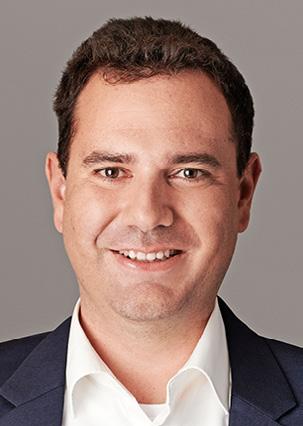
Employment-related costs, increasing fluctuation and workforce difficulties strengthen the need for Human Resources solutions. How to satisfy employees and whether the salary alone is enough to motivate them in the long term is a lengthy debate. Still, it is very likely, when considering the market situation and the available remuneration, that money counts.
Indeed, the remuneration package may prove crucial in helping an employee decide between staying at their current employer or searching for new job opportunities. On the other hand, a significant raise cannot be expected, especially given the recent inflation turbulence, and what is given today as the salary will become the base of the next raise.
Therefore, in addition to the basic salary and potential bonuses, employers must find a good combination of remuneration packages so that the wage remains attractive, but labor costs, including taxes, increase as little as possible. That brings to light fringe benefits and other schemes.
However, after a recent reform of fringe benefits, the Hungarian wage system does not provide much of a playground for creativity, limiting the opportunities, especially considering the above-mentioned attitude that “it is what is put in the purse counts.”
The Szép card, with its beneficial taxation, is a well-known fringe benefit; however, this has a yearly cap, which does not provide a significant volume, especially in mission-critical positions. Nowadays, a bonus scheme, healthcare services or company car as a benefit are not extraordinary either. The scope of tax-exempt benefits is limited to cultural and sports tickets, nursery or kindergarten contributions; however, these cannot be seen as constant wage supplements or motivators.
As tax advisors, from time to time, we receive questions about whether a benefits scheme is available that ensures both the satisfaction and loyalty of employees for a longer
period and also decreases costs. This is where the combination of HR and tax planning is necessary. Employee participation programs (MRP in Hungarian) have recently come into consideration. Although some may think this is only for multination giants, it might also be worth considering for smaller enterprises, as such schemes can contribute to the motivation and higher performance of employees by supporting the feeling that they are working not only for the success of the company but also for their own higher remuneration same like owners. MRP is even, in principle, available for joint stock companies, and under special rules, this can be extended to the Hungarian subsidiaries of foreign entities, and participation might be achieved in limited liability companies as well.
MRP is primarily granted to key employees or senior management for loyalty and motivation purposes. Compared to other incentive schemes, this is more favorable than employee share, premium or bonus plans and restricted stock units.
The advantage of the MRP is that membership interest acquired, as well as securities granted through it, are exempted from tax and are not regarded as income of the employee at the time of acquisition, meaning that neither the employer nor the employee is liable to pay tax on them. Further, assuming that the employee’s annual income reaches the social tax’s upper limit, only personal income tax at 15% is due when receiving payments from the MRP or when the securities acquired are sold or redeemed. With good and timely planning combining tax and legal considerations, MRP could serve as a preferential compensation scheme where the common and individual goals might create unity between the company and the employees, bringing HR and the compensation mindset to a new level. You may rely on the full-scope service packages of LeitnerLeitner, one of Central Europe’s most influential tax, accounting, audit and legal consulting companies.
4 Special Report | 23 www.bbj.hu Budapest Business Journal | April 19 – May 5, 2024
NOTE: ALL ARTICLES MARKED INSIDE VIEW ARE PAID PROMOTIONAL CONTENT FOR WHICH THE BUDAPEST BUSINESS JOURNAL DOES NOT TAKE RESPONSIBILITY INSIDE VIEW LeitnerLeitner Gellért Menczel-Kiss Partner, Senior tax advisor
www.leitnerleitner.com
Remuneration packages for satisfied and loyal employees
Péter Laczi: The interpretation
Dominika Tóth
Gergely Gáspár
Image by metamorworks / Shutterstock.com

Continued from page 23
shortage. The regulation has been through several decades of revisions. It would be nice to reach an agreement with a handshake to which both parties adhere, but I think this can only be a very distant vision. For now, the current legal framework and rules that protect the interests of the parties are necessary and must be observed.

Balázs Langó: In our view, the Hungarian regulatory environment rightly prioritizes local workers (and those who will hopefully return to Hungary) but also provides supplementary recruitment
opportunities from third countries under strict immigration and labor inspectorate safeguards. The elevated headcount and professional requirements for qualified agencies further support compliance across the board. Thus, the workforce needs of clients can be fulfilled with a high degree of certainty and reliability in a compliant manner, and Hungary does not risk that future FDIs or existing investors’ expansion plans might flow elsewhere. The number of FDIs choosing Hungary is a testament to the viability of the regulatory environment.
BGN: It supports long-term temp engagements (five years). There is an easier process to employ third-country employees, but the current duty for this is uncompetitive. The government is initiating significant developments to enable digital administration. I would limit the payment terms for temp services to 15 days. In the case of insolvency of a client, the cost of the temp workforce should be considered in the same way as internal wages. When clients are contracting temp agencies on a fee that does not cover the wages and taxes of temp employees, in case of non-compliance, they should face the same consequence as the agency.
BBJ: Has the labor shortage changed? Can you easily find all the temps you need to serve the market?
PB: The recent economic downturn and stagnation have given companies some breathing space in terms of labor, as there is not that high demand for workers in the market. Nevertheless, the available Hungarian workforce remains limited, and when
the economy starts to pick up in the second half of the year, there will be renewed competition for workers.
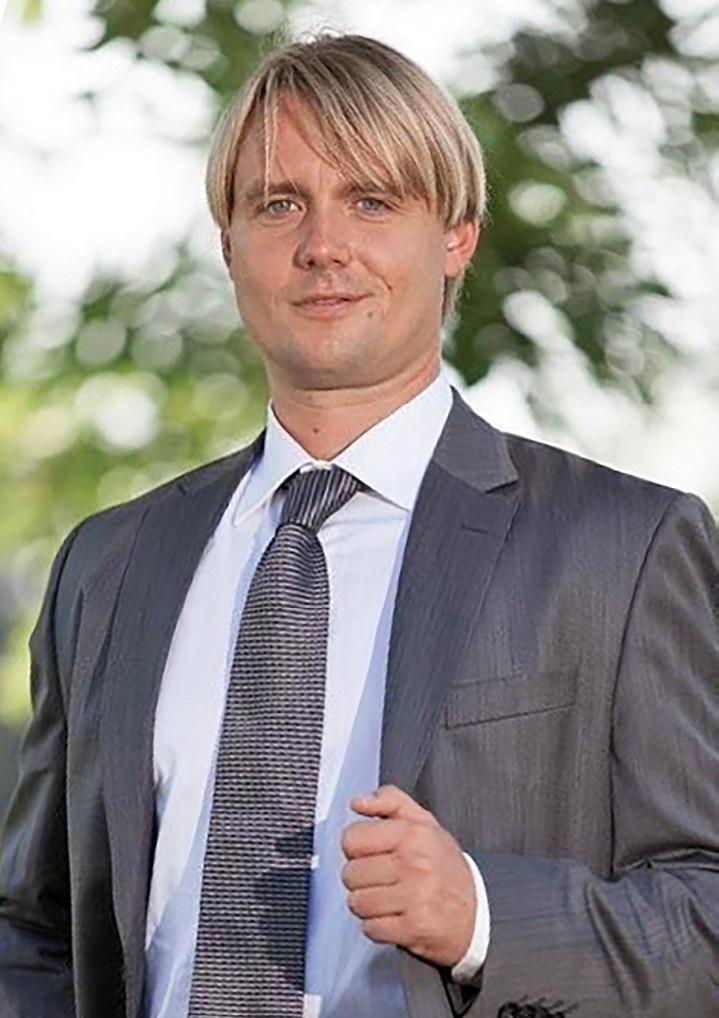
IB: The labor shortage persists, notably in sectors such as manufacturing, logistics, retail, and tourism. This is true not only for new investments or newly established plants but also for existing businesses, including expanding Hungarian-owned companies. Overall, new entrants into the labor market, such as young people, and the utilization of skilled non-EU labor in a controlled, limited and regulated fashion, have helped meet demand in various industries, albeit not always immediately or to the fullest extent.
GG: Although statistics indicate a loosening of the labor market, in reality, this can be considered a transitional period: classical sectors are still underperforming, while emerging industries are just about to take off. Furthermore, there is a growing interest in temporary work, attributed not only to third-country employment but also to the increasing demand for flexibility. The Hungarian labor reserve has gained value in the eyes of companies, yet reaching out to these people and activating them requires a strongly integrated recruitment adaptable to local conditions. Significant expansions in the workforce are unimaginable without foreign labor, whose importance will only increase further. Future success will require both stable Hungarian recruitment and flexible services providing third-country nationals.
TVH: Labor shortages vary nationally and by region. When a major investment is made somewhere, acute labor shortages occur relatively quickly in that area. Larger firms tend to siphon off the workforce of firms already operating there, affecting all labor market players. However, in many cases, the expectations of employers are not fully matched to the position, so after a while, much more energy and money are required to meet the market players’ needs. The increased investments also place greater labor demands on service providers, which cannot be met in a short time and with the expected quality by Hungarian workers alone.
CsJ: The labor shortage persists, particularly in regions where unemployment rates remain low,
24 | 4 Special Report www.bbj.hu Budapest Business Journal | April 19 – May 5, 2024
›››
Csongor Juhász
Balázs Langó
/ Shutterstock.com
Image by Summit Art Creations
resulting in fierce competition for candidates. However, there’s a shift towards prioritizing skilled candidates, such as technicians and professionals with higher qualifications. On the employee side, there’s a noticeable trend towards more cautious job switching, driven by the uncertainty of global economics, with fewer individuals expressing intent to change jobs, opting for stability.
PL: Based on experience, it can be said that there are currently applicants for each advertisement, and there is no significant oversupply; surprisingly, depending on the position, it is even possible to choose from among candidates. It depends on the job, salary and working conditions. How long will this trend last? It is difficult to predict; based on feedback from our partners, it is conceivable this will change from the third quarter, but slowly. It will also be a decades-long roller coaster to which we have learned to adapt.
BL: Labor shortages are a complex issue. Manpower reserves do exist statistically, but there are significantly fewer workers who are able and willing to work. That said, as a qualified agency, we have a duty to prioritize the mobilization of the local labor reserve in partnership with our clients. A strict but investor-friendly labor and immigration environment effectively complements these efforts, so overall, we see no problem filling open positions for our clients.
ADVERTISEMENT

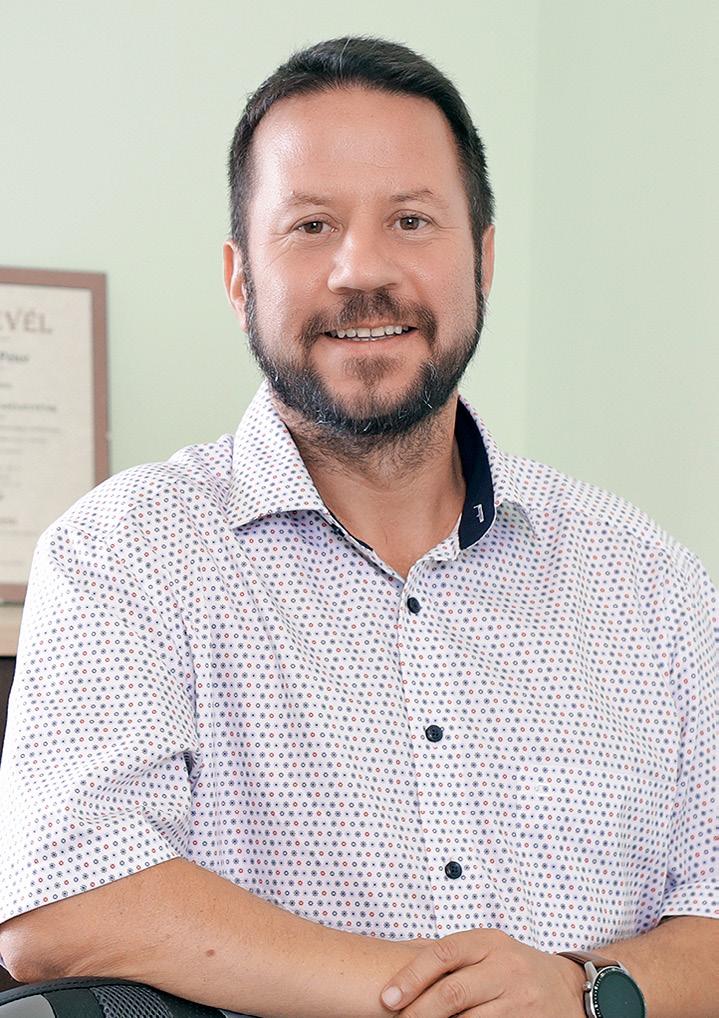
BGN: Currently, there is a weird situation where the labor shortage and unemployment exist alongside each other. It creates a clear separation between more and less developed geographies and deepens the gap between the experienced, skilled, educated workforce and disadvantaged members of society. Activating or reactivating workforce reserves and developing education to match market needs better are critical to survival.



MENTON Jobs Ltd. is one of the most dynamically developing companies in the Hungarian labour market.
DT: Hungary’s labor shortage has not improved, making it difficult to find sufficient temporary workers to meet market demands. Despite the opportunity to employ skilled workers from third countries on specific projects for up to three years, this issue continues to pose a significant challenge. Moreover, the fundamental problem of a decreasing and aging population remains critical. Relying on foreign labor and employing students both underscore the need for a multifaceted approach to address the labor shortage effectively. This situation underscores the necessity for agencies to explore various solutions, including incorporating international workers, to meet the labor demands of the Hungarian market sustainably.
BBJ: What will be the most significant change in how temp agencies work in the next few years?
PB: I believe recruitment will remain the biggest challenge in the labor market in the coming years. Another important factor is employee retention, and we place particular emphasis on care and people management to help our clients manage their human resources efficiently.
IB: The most significant change in how temp agencies operate could be the increasing focus on talent retention and development. With competition for skilled workers intensifying, temp agencies may invest more resources in nurturing relationships with employees, offering training programs, career advancement
opportunities, and incentives to encourage loyalty and performance. Additionally, technological advancements, such as AI, may streamline recruitment processes.


Our profile includes temporary and permanent placement services, as well as employment of students and retired jobseekers. Our company has almost 10 years of experience and 7 branch o ces nationwide to serve the needs of employers and employees!
GG: Our experience indicates that companies increasingly view us as partners rather than mere executors. In the evolving labor market, complex solutions will be needed, where temp agencies are responsible for implementing
Continued on page 26 ›››

Our partners are mainly industrial manufacturers, production companies and their suppliers, trading and service companies, along with major representatives of the FMCG and agricultural sectors.
We believe that fair business practices, mutually beneficial agreements, trust and reciprocity are the fundamentals of good and long-term cooperation, which our partners and employees can always expect from us.
MENTON Jobs, the reliable solution!

www.mentonjobs.hu



4 Special Report | 25 www.bbj.hu Budapest Business Journal | April 19 – May 5, 2024
Mosonmagyaróvár Győr Tatabánya
Veszprém Székesfehérvár Budapest Debrecen
Péter Laczi
Tímea Varjuné Horváth
Continued from page 25
cost-effective and sustainable workforce strategies. Data-driven services will be essential, significantly emphasizing the role of digitalization and automation. The importance of retraining will be reassessed due to structural changes, for which agencies need to develop their own solutions.
TVH: The introduction of qualified temporary agency status for service providers has brought many opportunities to the market. The biggest change will probably come when the current rules on third-country employment are clarified and the resulting practical anomalies are resolved following consultations with market players. Legislative changes are a constant challenge for service providers, as even a small change can significantly alter established processes, either at a system or operational level. Additional manual tasks are being transferred to digital platforms due to increased administrative tasks for certified temporary agencies and public authorities.
CsJ: The most significant change will likely stem from the increasing integration of artificial intelligence. With AI potentially transforming up to 50% of work-related expertise and skills within five years, we aim to develop innovative solutions to leverage those capabilities in serving clients. Additionally, there is a growing emphasis on competency assessment and
ADVERTISEMENT
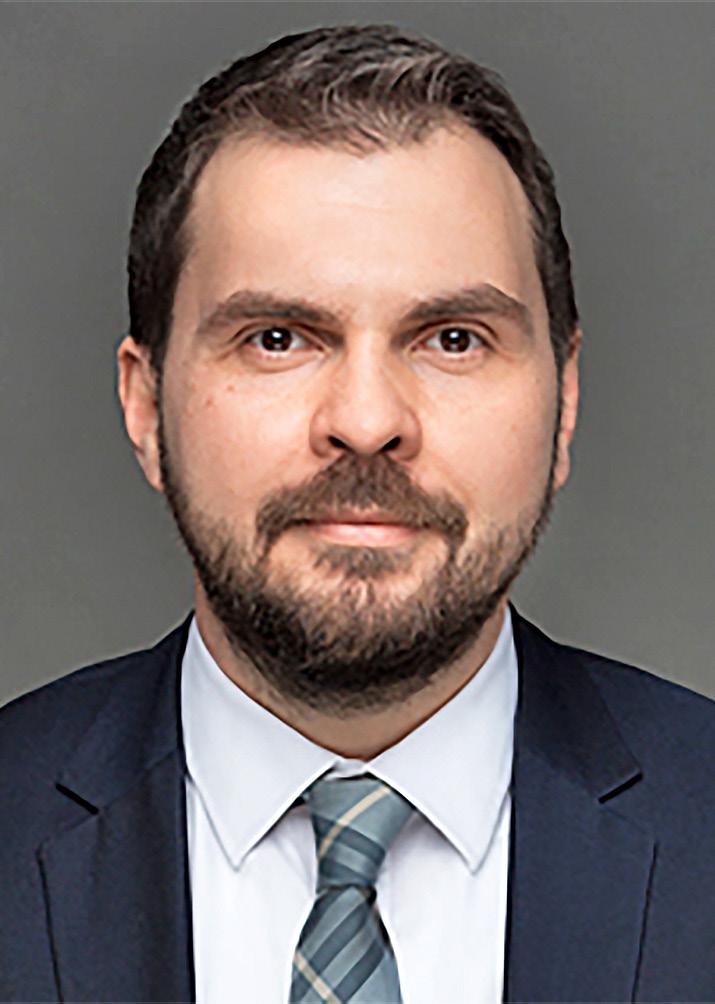
development, reflecting a shift towards more complex, digitally supported business solutions and addressing the rising demand for skilled workers.
PL: Economic development and growth, new investments, especially if they are numerous (and based on current forecasts, they are), always move the labor market. This will undoubtedly be the case in 2025 and can be predicted in the following years as well. I think there will be a big fight to keep a highquality workforce, activate the hidden
Hungarian labor reserve, and bring it back to the market in some cases. “Industry 4.0” is also taking place in the service sector, which wants to remain competitive, develop, rethink its processes, develop and automate them to maintain its efficiency, customer-friendly service and the commitment of colleagues working in the organization at a high level. BL: Hungary is already one of the most significant players in the new energy industry globally and plays an important geopolitical role as a gateway for investors from the West and the East. This hard-earned position generates an unprecedented volume of investment in Hungary that will be realized in the coming years and will give a significant role to qualified agencies, such as HR Direkt Kft. Fine-tuning and scaling operational processes to cater to the large spike in demand will be key.
BGN: We must develop our services towards higher value add, digitize our processes to be more efficient, and increase the market understanding to generate more resilience against change. I expect growing demand for outsourcing, white-collar temps, high value-added HR administration, and advisory services supplemented by some targeted educational activity. We must understand much better how AI and robotization can develop processes and products to offset the expected negative labor market effects of technology.
Temp Recruiting Market Talk Panel 2024
• Péter Berta, CEO, WHC Group
• István Bojó, managing director, Service Flow
• Gergely Gáspár, head of sales and marketing, Work Force Group
• Tímea Varjuné Horváth, operational manager, Menton Jobs
• Csongor Juhász, member of the board, Prohuman
• Péter Laczi, COO, Pannon-Work
• Balázs Langó, head of sales, HR Direkt
• Balázs G. Nagy, managing director, Trenkwalder Hungary
• Dominika Tóth, director of labor leasing department, euJobs HR-Group

26 | 4 Special Report www.bbj.hu Budapest Business Journal | April 19 – May 5, 2024 2404_whc_JLG29 - BBJ hirdetés - BBJ HR melléklet_HIRDETES_252x158mm.indd 1 2024. 04. 16. 12:16
›››
Balázs G. Nagy

4 Special Report | 27 www.bbj.hu Budapest Business Journal | April 19 – May 5, 2024 Temp Agencies Ranked by average statistical headcount in 2023 (HUF mln) RANK COMPANY WEBSITE AVERAGE STATISTICAL HEADCOUNT IN 2023 NO. OF FULL-TIME EMPLOYEES ON MARCH 1, 2024 NET REVENUE FROM TEMPORARY PLACERMENT IN 2023 (HUF MLN) TOTAL NUMBER OF TEMPORARY WORKFORCE IN 2023 NO. OF BILLED HOURS IN 2023 TOTAL NET REVENUE IN 2023 (HUF MLN) BREAKDOWN OF PLACEMENT IN 2023 (%) BREAKDOWN BY TYPE OF WORK IN 2023 (%) BREAKDOWN OF TEMPS SUPPLIED BY SECTORS IN 2023 (%) YEAR ESTABLISHED NO. OF OFFICES IN HUNGARY WORLDWIDE INCLUDING OFFICES IN HUNGARY OWNERSHIP (%) HUNGARIAN NONHUNGARIAN TOP LOCAL EXECUTIVE CFO MARKETING DIRECTOR ADDRESS PHONE EMAIL TEMPORARY PERMANENT BLUE-COLLAR WHITE-COLLAR OFFICE/FINANCE IT/TELCO PRODUCTION TOURISM HEALTHCARE/ PHARMACEUTICAL SALES/TRADE AGRICULTURE CONSTRUCTION INDUSTRY 1 PROHUMAN ZRT. www.prohuman.hu 6,411 334 48,663 12,600 10,480,026 51,207 – 100 94.40 5.60 ✓ ✓ ✓ ✓ ✓ ✓ ✓ ✓ 2004 17 42 (100) –Sándor Zakor, Béla Ignácz, Csongor Juhász, Attila Feleki Áron Szeitz Balázs Varró 1146 Budapest, Hungária körút 140–144. (1) 432-1280 prohuman@ prohuman.hu 2 WHC KFT. www.whc-group.com 5,155 A 47,985 13,381 9,897,600 48,850 A A 90 10 ✓ ✓ ✓ ✓ ✓ ✓ ✓ ✓ 1990 14 35 Péter Berta (40), Zoltán Tóth (30), Viktor Göltl (30) –Péter Berta Gábor Márton László Erős 1074 Budapest, Rákóczi út 70. (1) 787-8399
whc@whc-group.com
ECONOMIC ACTORS HAVE BEEN RELUCTANTLY DRAGGED INTO A SERIOUS ROLLERCOASTER RIDE OVER THE PAST YEARS. The successive, often overlapping, and mutually reinforcing series of crises, along with the necessary market rearrangements, have brought constant turbulence both globally and locally. Following the supportive labour market environment of the 2010s (increasing employment, launching major investments, new types of employment), domestic HR service providers also had to respond to new challenges. Few companies were truly able to achieve significant development.
THE MOST DYNAMIC GROWTH PHASE OF WORK FORCE'S TWENTY-YEAR HISTORY
BEGAN DURING THIS TURBULENT PERIOD, involving the development of both business size and service portfolio. The company gradually built the necessary foundations over two decades, which later proved crucial: it diversified its partner network across industries, company sizes, and di erent corporate cultures, connected with its clients through multiple services, and placed significant emphasis on operating with nationwide coverage capable of addressing Hungarian workforce needs.
4.7%: Hungarian unemployment rose only to such "heights" due to the impact of COVID shock, indicating that economic restructuring compelled the labour market more toward structural changes than crisis reactions. The role of employment forms previously considered secondary – such as rehabilitation or student employment, or even short-term temporary sta ng with the possibility of taking over employees – gradually strengthened.
EXPANDING EMPLOYMENT OPPORTUNITIES FOR THIRD-COUNTRY NATIONALS, WITH NECESSARY AND PROFESSIONAL SUPPORT, introduced a beneficial construct into the economy, ranging from neighbouring countries to the current, predominantly Far Eastern focus. Work Force was among the first to obtain the qualified temporary sta ng agency certification, boasting extensive practical experience and references due to successful collaborations with workers of various nationalities.
TODAY, THE DOMESTIC LABOUR RESERVE IS ESTIMATED AT 300,000 PEOPLE significantly appreciated due to the support programmes and economic policy strategies, as well as the challenging-to-plan economic environment. However, reaching out to them often requires established – often personal – recruitment and selection channels developed over decades, systems that companies solely specialized in employing third-country nationals cannot achieve in the short term. As part of its strategy, Work Force has therefore placed special emphasis on providing Hungarian workforce in recent years, thus, the statutory changes in headcount and the Hungarian-foreign placement ratio pose no challenge to the company, and partners need not worry about service interruptions.

28 | 4 Special Report www.bbj.hu Budapest Business Journal | April 19 – May 5, 2024 RANK COMPANY WEBSITE AVERAGE STATISTICAL HEADCOUNT IN 2023 NO. OF FULL-TIME EMPLOYEES ON MARCH 1, 2024 NET REVENUE FROM TEMPORARY PLACERMENT IN 2023 (HUF MLN) TOTAL NUMBER OF TEMPORARY WORKFORCE IN 2023 NO. OF BILLED HOURS IN 2023 TOTAL NET REVENUE IN 2023 (HUF MLN) BREAKDOWN OF PLACEMENT IN 2023 (%) BREAKDOWN BY TYPE OF WORK IN 2023 (%) BREAKDOWN OF TEMPS SUPPLIED BY SECTORS IN 2023 (%) YEAR ESTABLISHED NO. OF OFFICES IN HUNGARY WORLDWIDE INCLUDING OFFICES IN HUNGARY OWNERSHIP (%) HUNGARIAN NONHUNGARIAN TOP LOCAL EXECUTIVE CFO MARKETING DIRECTOR ADDRESS PHONE EMAIL TEMPORARY PERMANENT BLUE-COLLAR WHITE-COLLAR OFFICE/FINANCE IT/TELCO PRODUCTION TOURISM HEALTHCARE/ PHARMACEUTICAL SALES/TRADE AGRICULTURE CONSTRUCTION INDUSTRY 3 WORK FORCE SZEMÉLYZETI TANÁCSADÓ ÉS SZOLGÁLTATÓ KFT. www.work-force.hu 2,821 127 23,942 6,118 6,278,202 24,072 A A 85 15 ✓ ✓ ✓ ✓ ✓ ✓ ✓ ✓ 2003 10 10 C.S.R Vagyonkezelő Kft. (100) –Róbert Csákvári Zsolt Csúzi Gergely Gáspár 1042 Budapest, József Attila utca 4–6. (1) 354-3434 marketing@ work-force.hu 4 PANNONJOB HUMÁN SZOLGÁLTATÓ ÉS TANÁCSADÓ KFT. www.pannonjob.hu 2,776 A 21,718 A A 22,504 A A 79 21 A A A A A A A A 1993 6 6 Videoton Holding Zrt. (100) –Attila Molnár ––8000 Székesfehérvár, Berényi út 72–100. (22) 554-170 info@pannonjob.hu 5 PANNON-WORK ZRT. www.pannonwork.hu 2,673 256 25,008 2,422 A 25,717 30 70 75 25 ✓ ✓ ✓ ✓ ✓ ✓ ✓ ✓ 2004 17 19 Grosvenor Kft. (100) –Géza Homonnay, Péter Laczi Krisztina Zita Renge Marianna Baksy 1114 Budapest, Bartók Béla út 15/D (1) 381-1048 budapest@ pannonwork.hu 6 MAN AT WORK HUMÁNSZOLGÁLTATÓ ÉS SZEMÉLYZETI TANÁCSADÓ KFT. www.manatwork.hu 2,354 A 18,801 A A 20,449 A A A A A A A A A A A A 1998 A A Volano Kft. (100) –Csaba Ottó Orsolya Horvai Módné Adrienn Tanai 8200 Vezsprém, Ady Endre utca 3. (20) 929-2430 info@manatwork.hu CUSTOMER FOCUS AND INNOVATION, BUILT ON TWO DECADES OF EXPERIENCE HOWEVER, DECADES-LONG, STABLE PROFESSIONAL FOUNDATIONS ALONE ARE NOT SUFFICIENT IN AN EXTREMELY COMPETITIVE SERVICE MARKET. Innovative thinking has provided significant business advantages in recent years, and its role will continue to strengthen in the coming period. Companies and business TEMPORARY STAFFING PERMANENT STAFFING OUTSOURCING REHABILITATION EMPLOYMENT STUDENT EMPLOYMENT CROSS-BORDER EMPLOYMENT Sales and Marketing Director Gergely Gáspár
C M Y CM MY CY CMY K

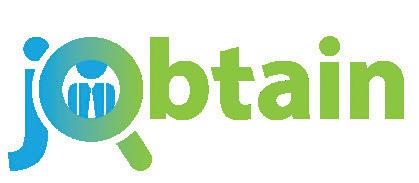

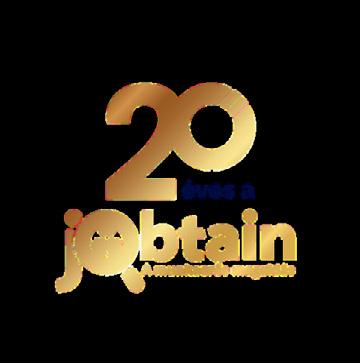
20 éve biztosítjuk a stabil működéshez és a folyamatos növekedéshez szükséges minőségi munkaerőt, flexibilis szolgáltatásokkal és erős munkajogi háttérrel. MUNKAERŐS MEGOLDÁSOK KÖZÉP- ÉS NAGYVÁLLALATOKNAK PARTNER@JOBTAIN.HU
MUNKAERŐ-KÖLCSÖNZÉS
MUNKAERŐ-KÖZVETÍTÉS
BELFÖLDI MUNKAVÁLLALÓK TOBORZÁSA
HARMADIK ORSZÁGBELIEK FOGLALKOZTATÁSA

MUNKAERŐRE VAN SZÜKSÉGE? BESZÉLGESSÜNK HR-IGÉNYEIRŐL!

4 Special Report | 29 www.bbj.hu Budapest Business Journal | April 19 – May 5, 2024 RANK COMPANY WEBSITE AVERAGE STATISTICAL HEADCOUNT IN 2023 NO. OF FULL-TIME EMPLOYEES ON MARCH 1, 2024 NET REVENUE FROM TEMPORARY PLACERMENT IN 2023 (HUF MLN) TOTAL NUMBER OF TEMPORARY WORKFORCE IN 2023 NO. OF BILLED HOURS IN 2023 TOTAL NET REVENUE IN 2023 (HUF MLN) BREAKDOWN OF PLACEMENT IN 2023 (%) BREAKDOWN BY TYPE OF WORK IN 2023 (%) BREAKDOWN OF TEMPS SUPPLIED BY SECTORS IN 2023 (%) YEAR ESTABLISHED NO. OF OFFICES IN HUNGARY WORLDWIDE INCLUDING OFFICES IN HUNGARY OWNERSHIP (%) HUNGARIAN NONHUNGARIAN TOP LOCAL EXECUTIVE CFO MARKETING DIRECTOR ADDRESS PHONE EMAIL TEMPORARY PERMANENT BLUE-COLLAR WHITE-COLLAR OFFICE/FINANCE IT/TELCO PRODUCTION TOURISM HEALTHCARE/ PHARMACEUTICAL SALES/TRADE AGRICULTURE CONSTRUCTION INDUSTRY 7 HR DIREKT KFT. www.hrdirekt.com 2,065 A A A A 15,300 A A 85 15 A A A A A A A A A A A (100) –Helga Kurucz-Réti ––1095 Budapest, Soroksári út 48–54. (1) 769-6433 info@hrdirekt.com 8 TRENKWALDER HR SOLUTION KFT. http://hu.trenkwalder.com 1,956 10 15,133 4,540 3,396,483 15,156 A A 90 10 ✓ ✓ ✓ ✓ ✓ ✓ ✓ ✓ 2018 1 200 –SATRK GmbH (100) Balázs G. Nagy Henrietta Tóth József Nógrádi 8097 Nadap, Rákóczi utca 10. (22) 374-305 infohungary@ trenkwalder.com 9 JOBTAIN HR SZOLGÁLTATÓ KFT. www.jobtain.hu 1,927 108 13,048 1,743 3,721,000 13,157 83 17 99 1 1 – 96 – 3 – – –2004 10 12 Magdolna Mihályi (90), Anna Chapman-Varga (10) –Magdolna Mihályi Veronika Balogh Attila Molnár 1094 Budapest, Tűzoltó utca 72. (30) 974-6035 partner@jobtain.hu 10 SERVICE FLOW KFT. www.serviceflow.hu 1,502 44 7,681 4,050 1,915,904 7,812 – 100 97 3 ✓ – ✓ ✓ ✓ ✓ – ✓ 2019 4 4 Maximilián Finfera (100) –István Bojó ––1134 Budapest, Tüzér utca 39. 1 227-1976 kozpont@serviceflow.hu MINŐSÍTETT FOGLALKOZTATÓ

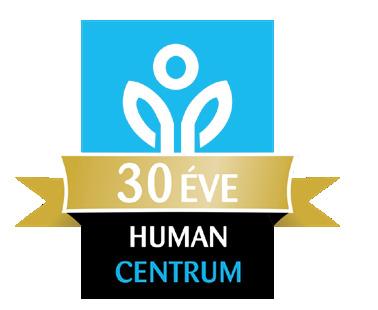





30 | 4 Special Report www.bbj.hu Budapest Business Journal | April 19 – May 5, 2024 RANK COMPANY WEBSITE AVERAGE STATISTICAL HEADCOUNT IN 2023 NO. OF FULL-TIME EMPLOYEES ON MARCH 1, 2024 NET REVENUE FROM TEMPORARY PLACERMENT IN 2023 (HUF MLN) TOTAL NUMBER OF TEMPORARY WORKFORCE IN 2023 NO. OF BILLED HOURS IN 2023 TOTAL NET REVENUE IN 2023 (HUF MLN) BREAKDOWN OF PLACEMENT IN 2023 (%) BREAKDOWN BY TYPE OF WORK IN 2023 (%) BREAKDOWN OF TEMPS SUPPLIED BY SECTORS IN 2023 (%) YEAR ESTABLISHED NO. OF OFFICES IN HUNGARY WORLDWIDE INCLUDING OFFICES IN HUNGARY OWNERSHIP (%) HUNGARIAN NONHUNGARIAN TOP LOCAL EXECUTIVE CFO MARKETING DIRECTOR ADDRESS PHONE EMAIL TEMPORARY PERMANENT BLUE-COLLAR WHITE-COLLAR OFFICE/FINANCE IT/TELCO PRODUCTION TOURISM HEALTHCARE/ PHARMACEUTICAL SALES/TRADE AGRICULTURE CONSTRUCTION INDUSTRY 11 HSA KFT. www.hsa.hu 1,471 A 9,780 3,702 2,986,579 10,172 – 100 85 15 ✓ ✓ ✓ ✓ ✓ ✓ ✓ ✓ 2000 15 16 HSA Group Zrt. (91), MELÓ-DIÁK Holding Zrt. (9) –László Mátyás Erika Dékány László Zsilka 4025 Debrecen, Széchenyi utca 48. (52) 446-991 info@hsa.hu 12 TRENKWALDER LEASING KFT. http://hu.trenkwalder.com 1,343 10 9,425 4,265 2,332,044 9,471 A A 90 10 ✓ ✓ ✓ ✓ ✓ ✓ ✓ ✓ 2018 1 200 –SATRK GmbH (100) Balázs G. Nagy Henrietta Tóth József Nógrádi 8097 Nadap, Rákóczi utca 10. (22) 374-305 infohungary@ trenkwalder.com 13 ADECCO KFT. www.adecco.hu 1,336 77 11,738 1,197 2,500,853 12,569 94 6 78 22 ✓ ✓ ✓ ✓ ✓ ✓ ✓ ✓ 1991 7 5,000+ –The Adecco Group (100) Domenico Marra Ádám Varga –1139 Budapest, Fiastyúk utca 4–8. (30) 412-8752 adecco@adecco.hu 14 MENTON JOBS KFT. www.mentonjobs.hu 1,311 266 8,780 3,040 2,258,274 9,253 100 – 98 2 ✓ ✓ ✓ ✓ – ✓ ✓ ✓ 2011 7 7 Viktor Stasztny (50), Tamás Horváth (50) –Viktor Stasztny, Tamás Horváth Henrietta Kovács –1095
15 GET WORK TREND KFT. www.getwork.hu 1,105 63 6,311 3,810 1,610,189 6,886 1.34 98.66 98 2 1.31 – 64.26 5.87 – 6.84 – 21.72 2004 10 10 László Küzmös (100) –László Küzmös, Ákos Jáhny Roland Huszár –1023 Budapest, Árpád
16 HUMÁN CENTRUM KFT. www.humancentrum.hu 923 78 A A A 7,832 30 70 80 20 ✓ ✓ ✓ ✓ ✓ ✓ – ✓ 1993 13 13 Individuals (100) –Katalin
––
www.adecco.hu Adecco Hungary adecco@adecco.hu +36 30/412-8752 Temporary staffing, permanent recruitment, international recruitment, executive search, outsourcing, CV screening and other HR services A global leader in HR solutions Together we are making the future work for everyone
Budapest, Soroksári út 48. (70) 415-2419 hello@mentonjobs.hu
fejedelem útja 31. (1) 766-5626 getwork@getwork.hu
Bor, Róbert Göbl, Zsuzsanna Szabó
1077 Budapest, Wesselényi utca 11. (1) 877-0900 info@humancentrum.hu

1134 Budapest, Dózsa György út 146–148. (1) 619-4243 info@randstad.hu
MELÓ-DIÁK Holding Zrt. (52), Primajob Személyzeti Szolgáltató Kft. (48) –
Péter Megyeri Gyula Serfőző Zoltán Kott
1095 Budapest, Tinódi utca 9–11. (1) 456-0700 info@starjobs.hu




4 Special Report | 31 www.bbj.hu Budapest Business Journal | April 19 – May 5, 2024 RANK COMPANY WEBSITE AVERAGE STATISTICAL HEADCOUNT IN 2023 NO. OF FULL-TIME EMPLOYEES ON MARCH 1, 2024 NET REVENUE FROM TEMPORARY PLACERMENT IN 2023 (HUF MLN) TOTAL NUMBER OF TEMPORARY WORKFORCE IN 2023 NO. OF BILLED HOURS IN 2023 TOTAL NET REVENUE IN 2023 (HUF MLN) BREAKDOWN OF PLACEMENT IN 2023 (%) BREAKDOWN BY TYPE OF WORK IN 2023 (%) BREAKDOWN OF TEMPS SUPPLIED BY SECTORS IN 2023 (%) YEAR ESTABLISHED NO. OF OFFICES IN HUNGARY WORLDWIDE INCLUDING OFFICES IN HUNGARY OWNERSHIP (%) HUNGARIAN NONHUNGARIAN TOP LOCAL EXECUTIVE CFO MARKETING DIRECTOR ADDRESS PHONE EMAIL TEMPORARY PERMANENT BLUE-COLLAR WHITE-COLLAR OFFICE/FINANCE IT/TELCO PRODUCTION TOURISM HEALTHCARE/ PHARMACEUTICAL SALES/TRADE AGRICULTURE CONSTRUCTION INDUSTRY 17 HR-RENT KFT. www.hr-group.hu 847 54 12,947 793 A 13,723 – 100 95 5 10 5 75 – 5 5 – –2005 2 2 Prohuman Zrt. (83), Family Investor Kft. (17) –Attila Feleki ––7624 Pécs, Ferencesek utcája 52. (72) 212-368 info@hr-group.hu 18 HUMÁNIA HRS GROUP ZRT. www.humaniahrsgroup.hu 629 125 5,674 A A 6,432 A A 85 15 A A A A A A A A 2001 18 19 Individuals (100) –Zoltán Márkus Henrietta Gyurkóczi Zsuzsanna Ecsedi 1097 Budapest, Albert F. út 3/B (1) 248-2010 info@ humaniahrsgroup.hu 19 VIAPAN DOLOGIDŐ KFT. www.viapan.hu 611 16 3,990 2,461 856,993 4,092 86 14 83 17 ✓ ✓ ✓ ✓ ✓ ✓ ✓ ✓ 2001 12 15 Individuals (100) –Gábor Csizmadia Péter Vida Bence Husi 1012 Budapest, Pálya utca 4. (20) 514-3249 marketing@ viapangroup.com 20 RANDSTAD HUNGARY KFT. www.randstad.hu 583 157 5,236 879 804,148 7,734 60 40 20 80 ✓ ✓ ✓ ✓ ✓ ✓ ✓ ✓ 2004 5 4,692 –Randstad Holding Luxembourg S.a.r.l. (100) Sándor Baja Lívia Tóth Ágnes Szokody
21
536 24 3,694 1,811 583,094 4,249 32 68 83 17 18.67 1.20 24.01 1.21 0.05 2.37 1.98 50.51 2001 5 7
STARJOBS MAGYARORSZÁG HUMÁNSZOLGÁLTATÓ KFT. www.starjobs.hu
recruitment for your local needs. www.viapan.hu temporary or permanent placement from 24 countries worldwide with 40 years of experience BP/0701/029062-6/2023-26 Registration into the Qualified Labor Provider Registry
Global

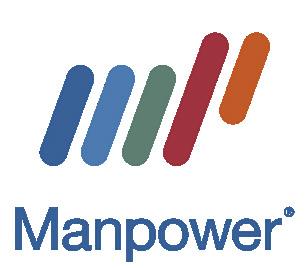
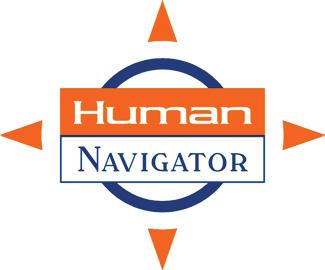
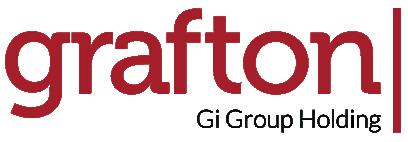
32 | 4 Special Report www.bbj.hu Budapest Business Journal | April 19 – May 5, 2024 RANK COMPANY WEBSITE AVERAGE STATISTICAL HEADCOUNT IN 2023 NO. OF FULL-TIME EMPLOYEES ON MARCH 1, 2024 NET REVENUE FROM TEMPORARY PLACERMENT IN 2023 (HUF MLN) TOTAL NUMBER OF TEMPORARY WORKFORCE IN 2023 NO. OF BILLED HOURS IN 2023 TOTAL NET REVENUE IN 2023 (HUF MLN) BREAKDOWN OF PLACEMENT IN 2023 (%) BREAKDOWN BY TYPE OF WORK IN 2023 (%) BREAKDOWN OF TEMPS SUPPLIED BY SECTORS IN 2023 (%) YEAR ESTABLISHED NO. OF OFFICES IN HUNGARY WORLDWIDE INCLUDING OFFICES IN HUNGARY OWNERSHIP (%) HUNGARIAN NONHUNGARIAN TOP LOCAL EXECUTIVE CFO MARKETING DIRECTOR ADDRESS PHONE EMAIL TEMPORARY PERMANENT BLUE-COLLAR WHITE-COLLAR OFFICE/FINANCE IT/TELCO PRODUCTION TOURISM HEALTHCARE/ PHARMACEUTICAL SALES/TRADE AGRICULTURE CONSTRUCTION INDUSTRY 22 EU-JOBS KFT. www.eujobs.hu www.eujobshrgroup.hu Jobs 523 35 5,787 2,723 1,340,296 5,876 40 60 90 10 ✓ ✓ ✓ – – – – –2005 1 1 Zoltán Pataki (50), Norbert Heincz
–Zoltán
Norbert Heincz Dániel Bohár Nóra Kováts 1137 Budapest, Katona József u. 15.
Diákok member of euJobs HR-Group Jobs member of euJobs HR-Group Nyugdíjtöbblet member of euJobs HR-Group OUR HR SERVICES ARE COMPREHENSIVE, GLOBAL, AND FLEXIBLE: recruitment,
to your
Wide-ranging workforce leasing and placement solutions. Adaptable retiree workforce. Quickly deployable, dedicated student workforce flexibly. euJobs HR-Group Your way www.eujobshrgroup.com 20 YEARS AS THE PROFESSIONAL ALLY OF THE HR FIELD. 23 HR-MONTAGE KFT. –498 550 8,281 498 A 9,804 30 70 100 – A A A A A A A A 2011 1 1 (100) –Zoltán Scheich ––7622 Pécs, Somogyi Béla utca 2. (70) 489-1173 info@hr-montage.hu 24 GI GROUP RECRUITMENT KFT.(1) www.gigroup.hu 452 31 3,646 409 1,073,090 3,968 1 99 95 5 – – ✓ – ✓ – – –2022 2 500+ –GI GROUP HOLDING S.P.A. (100) György G. Palásti Szabolcs Németh Zsolt Pető 1053 Budapest, Károlyi utca 12. (1) 235-2600 hu.info@gigroup.com 25 MANPOWER MUNKAERŐ SZERVEZÉSI KFT. www.manpower.hu 430 62 5,524 690 1,051,248 6,482 10 90 15 85 40 20 10 – 10 20 – –1990 2 2,200 –Integrator Holding d.o.o. (100) Tamás Fehér Antal Csanyik Kitti Horváth 1133 Budapest, Váci út 76. (1) 411-1590 manpower@ manpower.hu 26 HUMÁN NAVIGÁTOR KFT. www.humannavigator.hu 350 32 2,500 A A 2,588 75 25 80 20 6 4 80 4 1 5 – –2001 6 6 Géza Homonnay (51), Tibor Takács (49) –Tibor Takács Dalma Takács István Hinner 8000 Székesfehérvár, Gyümölcs utca 26. (22) 509-900 (20) 509-0008 info@ humannavigator.hu 27 GRAFTON RECRUITMENT KFT.(2) www.grafton.hu 228 68 2,051 124 282,950 3,372 – 100 – 100 ✓ ✓ ✓ ✓ ✓ ✓ ✓ ✓ 1996 1 500+ –GI GROUP HOLDING S.P.A. (100) György G. Palásti Szabolcs Németh Zsolt Pető 1053 Budapest, Károlyi utca 12. (1) 235-2600 info@grafton.hu
(50)
Pataki,
(1) 225-7313 ertekesites@ eujobshrgroup.hu
selection, full administration – all with unique, digital solutions tailored
company's needs.
NR DEKRA ARBEIT MAGYARORSZÁG KFT. www.dekra-arbeit.hu
474 (2022)
NR ESENSE HUMAN RESOURCES SZOLGÁLTATÓ ZRT. www.esense.hu
(2022)
NR FOCUS CONSULTING KFT. www.focusconsulting.hu A 16 A A A 500 A A – 100 ✓ ✓ ✓ – ✓ ✓ – –1997 1 1 Tímea
4,035 (2022)

Daru, Levente Táborosi
12. (70) 300-9706 info.hungary@ reedglobal.com
1054 Budapest, Kálmán Imre utca 1. (80) 315-096 dekra@dekra-arbeit.hu
2161 Csomád, Cseresznyés u. 1/A (1) 301-5018 jelentkezes@delego.hu
Budapest, Madarász Viktor utca 47–49. (1) 555-1585 esense@esense.hu
(100) –Géza Homonnay ––
1114 Budapest, Bartók Béla út 15/D (1) 381-1040 recepcio@gamax.hu
4 Special Report | 33 www.bbj.hu Budapest Business Journal | April 19 – May 5, 2024 RANK COMPANY WEBSITE AVERAGE STATISTICAL HEADCOUNT IN 2023 NO. OF FULL-TIME EMPLOYEES ON MARCH 1, 2024 NET REVENUE FROM TEMPORARY PLACERMENT IN 2023 (HUF MLN) TOTAL NUMBER OF TEMPORARY WORKFORCE IN 2023 NO. OF BILLED HOURS IN 2023 TOTAL NET REVENUE IN 2023 (HUF MLN) BREAKDOWN OF PLACEMENT IN 2023 (%) BREAKDOWN BY TYPE OF WORK IN 2023 (%) BREAKDOWN OF TEMPS SUPPLIED BY SECTORS IN 2023 (%) YEAR ESTABLISHED NO. OF OFFICES IN HUNGARY WORLDWIDE INCLUDING OFFICES IN HUNGARY OWNERSHIP (%) HUNGARIAN NONHUNGARIAN TOP LOCAL EXECUTIVE CFO MARKETING DIRECTOR ADDRESS PHONE EMAIL TEMPORARY PERMANENT BLUE-COLLAR WHITE-COLLAR OFFICE/FINANCE IT/TELCO PRODUCTION TOURISM HEALTHCARE/ PHARMACEUTICAL SALES/TRADE AGRICULTURE CONSTRUCTION INDUSTRY 28 JOB SZEMÉLYZETI TANÁCSADÓ KFT. www.jobgroup.hu 179 31 2,129 228 227,848 2,471 46 54 – 100 ✓ ✓ ✓ – ✓ ✓ – –1992 2 2 László Hadi, Botond Csordás, Attila Pál, Attila Dobár (100) –Éva Fehér György Thury Beatrix Pálvölgyi 1133 Budapest, Árbóc utca 6. (1) 239-9922 job@job.hu 29 BRILL HUMAN TEAM KFT. www.brillhumanteam.hu/ 127 124 369 177 A 1,027 A A A A A A A A A A A A 2017 1 1 Julianna Katalin Nagy, Csaba Tóth (100) –Csaba Tóth ––1155 Budapest, Kolozsvár utca 10/A (70) 367-9017 (70) 945-1682 info@brillhumanteam.hu 30 REED MAGYARORSZÁG KFT. reedglobal.hu 107 25 695 252 A 1,043 A A – 100 ✓ ✓ ✓ ✓ ✓ ✓ ✓ ✓ 2008 1 102 –Reed Specialist Recruitment (Global) Ltd. (100) Klára Pethő Lee Richards James Adams 1051 Budapest, Bajcsy-Zsilinszky út
A A A A A
A A A A A A A A A A A A 2004 A A –
–
A A A A A 4,031
A A A A A A A A A A A A 2012 A A Delego
–Balázs
–
DEKRA Arbeit GmbH (100) Radoslav Sekerka –
NR DELEGO KFT. www.delego.hu
(2022)
Holding Zrt. (100)
–
A A A A A 2,713
A A A A A A A A A A A A 2007 A A
––1138
Individuals (100) –Gábor Varga
Bíró (100) –Tímea Bíró ––1138 Budapest, Váci út 135–139. (70) 883-7514 info@
NR GAMAX KFT. www.gamax.hu A
A A
A A A A A A A
A A A A
A
focusconsulting.hu
A
A
A
1990
A
NR HAYS HUNGARY KFT. www.hays.hu A A 3,541 A A 6,457 A A A A A A A A A A A A 2007 1 253 –Hays Plc. (100) Tammy Nagy-Stellini
www.hrcgroup.hu A 166 A A A 1,209 (2022) A A A A A A A A A A A A 2000 A A Csilla Vidó (100) –Csilla Vidó ––1117 Budapest, Móricz Zsigmond
14. 4/1.
NR PRODUKTEAM
A 37 A A A 2,067 (2022) A A A A A A A A A A A A 1995 A A Viktória Eszter Konkoly-Thege (100) –Viktória Eszter Konkoly-Thege ––6722 Szeged, Vitéz utca 22. (1) 267-9010 produkteam@ produkteam.hu NR S-FORRÁS KFT. https://s-forras.hu/ A A A A A 1,793 (2022) A A A A A A A A A A A A 2005 A A Individuals (100) –Zoltán Simkó ––1173 Budapest, Mezőtárkány utca 2. (1) 433-2659 iroda@s-forras.hu NOTES: (1) Since January 3, 2024, Kelly Services Hungary Kft. has been a member of GI Group Holding, whose relevant business results are reported at GI Group Recruitment Kft. (2) Since January 3, 2024, Kelly Services Hungary Kft. has been a member of GI Group Holding, whose relevant business results are reported at Grafton Recruitment Kft.
Attila Pencs Nóra Medve 1054 Budapest, Akadémia utca 6. (1) 501-2400 hungary@hays.hu NR HRCV SZEMÉLYZETI SZOLGÁLTATÓ KFT.
körtér
(1) 878-0145 vido.csilla@hrcv.hu
VÁLLALKOZÁSSZERVEZŐ KFT. www.produkteam.hu
Skills Shortages, the Demographic Deficit and the Rise of AI in Recruitment
The Budapest Business Journal sat down with a number of the leading players in Hungary’s recruitment sector to quiz them on the challenges and opportunities thrown up by the market in 2024.
BBJ: What differentiates recruitment agencies from Temp Agencies?
Tibor Bányai: The fundamental difference is that the client will employ the selected candidates from recruitment agencies, whereas temporary agencies lease their own workers to the client. Moreover, there are significant differences in their operations.
Recruitment agencies primarily recruit and place intellectual professionals for the client, while temporary agencies typically recruit, employ, and exercise employer rights for physical workers. From the above, it follows that there are differences in the organizational structure of the two types as well.
Zsolt Beck: Temp agencies also engage in recruitment. Then again, headhunter firms do not deal with temporary staffing. For recruitment optimization, the same recruitment staff typically hires both the manual laborer and the engineer at temp agencies. In headhunter firms, however, the roles are clearly distinguished, and the recruiters have significantly more market knowledge and, importantly, a network of contacts in their respective fields, which can impact the quality of their work.
Tímea Bíró: Search and selection for permanent positions require different sourcing techniques, channels and a higher level of proficiency.
József Illés: Recruitment and temp agencies differ primarily in the nature of their services, although larger agencies provide both. Temp services are regulated more strictly and nationally. This staffing solution is more common at large corporates and international companies without Hungarian subsidiaries, especially for blue-collar positions.
Tammy Nagy-Stellini: Both types of agencies serve as intermediaries between employers and job seekers; their primary focus and the duration of placements differentiate them.

While recruitment agencies concentrate on permanent or long-term placements, temp agencies specialize in providing non-permanent staffing solutions. Having flexible services allows us to offer comprehensive staffing to our clientele. Especially in this market climate, companies need alternative, fast solutions, often in the form of temporary workers, to fill immediate gaps while also looking for permanent staff to build their long-term team. By offering both services, we can ensure tailored solutions to meet these diverse needs efficiently.

On top of that, clients benefit from working with a single agency for their entire staffing requirements, saving time and resources. For candidates, having
access to temporary and permanent positions through the same agency expands their job opportunities.
György Palásti: Consultancies whose main profile is permanent recruitment will typically have more profound knowledge and dedicated resources to fill specific, niche, white- and bluecollar jobs. In contrast, the strength of firms with a temporary recruitment core profile lies in their up-to-date knowledge of the legislative environment and administrative capacity.
BBJ: What is the greatest challenge on the recruitment agency market in Hungary right now?
TBá: Due to demographic reasons, a decades-long declining population, significant emigration, and the hundreds of thousands of Hungarian citizens working in Western Europe, fewer people are entering the labor market. As a result, it is becoming increasingly challenging for recruitment agencies to find intellectual professionals of the expected quality. For temporary agencies, the biggest challenge is finding third countries whose labor market can provide sufficient numbers of workers socialized in modern technology and efficient organizational culture. ZsB: One is the wage-price spiral, which seems to be settling down, but not all companies have been able to compete with the current wages. Another is the varying degree of labor shortages in different segments, which are present to some extent everywhere. Adding to this is the backwardness of the educational system; the situation is challenging, to put it mildly.
TBí: The shortage of talents at specialist levels has been an ongoing issue for years. This is exacerbated by a robust candidate-driven labor market that is forcing agencies to screen a far broader talent pool of candidates. Therefore, sourcing capacity is a challenge.
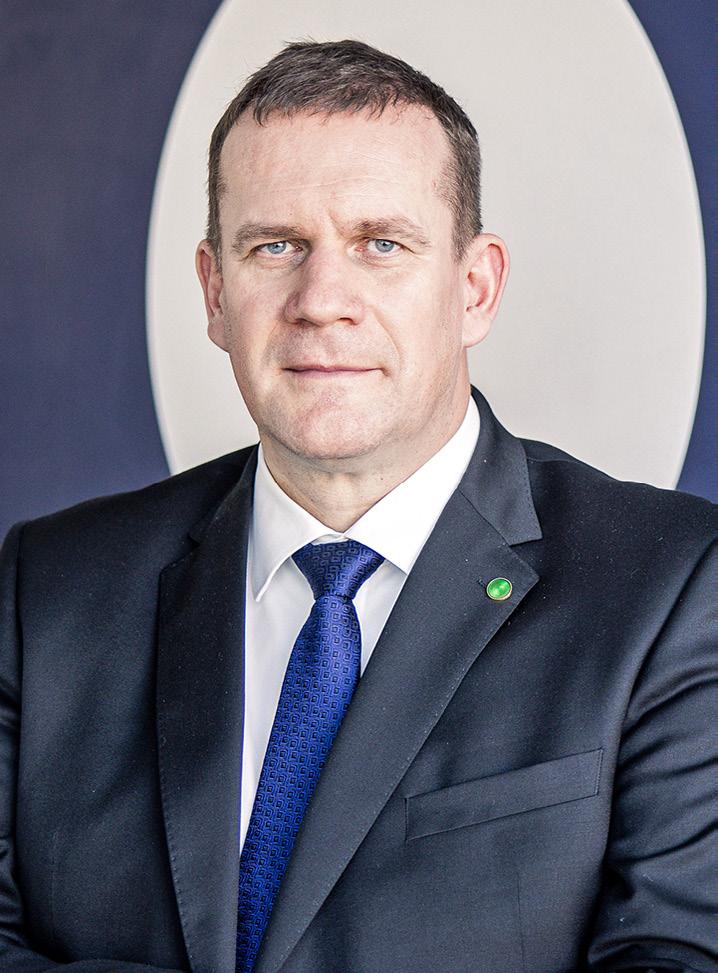
JI: As there has been a noticeable decrease in investment in Hungary in the past years, there has been a relapse in recruitment and opening positions. Therefore, there is even bigger competition between agencies. Although the market has turned less candidatedriven, the talent shortage and finding skilled candidates in certain sectors or with specific qualifications is the same or even more challenging, especially in competitive industries. Agencies
34 | 4 Special Report www.bbj.hu Budapest Business Journal | April 19 – May 5, 2024
BBJ STAFF
Image by bunny pixar / Shutterstock.com
György Palásti
Sándor Baja

receive more complex and only mid-level and senior assignments; there are very few junior openings. The recruitment processes are prolonged as companies want the best candidates, resulting in an even more extended return on investment for agencies.
Gábor Krivánik: The biggest challenge in the recruitment market in our country is finding a good recruitment agency! We believe (especially with our experience in the IT market) that there are good candidates and there are open positions, but there are only a few agencies that understand the job and have a recruitment team that can search and select the best candidates.
TNS: Probably a combination of the ongoing skill shortage, a less predictable economy and fewer investments compared to previous years. 2023 was a year of tighter budgets, so clients, candidates, and businesses in general have been much more cautious and slower with their decision-making. Luckily, there are signs of a rising shift: as we stepped over into 2024, we already saw the market picking up on activity.
GyP: Perhaps the biggest challenge for most companies now is constantly adapting to the opportunities and risks of a changing environment. The recruitment and employment of thirdcountry nationals, the significant drop in order intake in some areas, and the ever-increasing competition for skilled manual and experienced labor in certain back-office areas are all phenomena that many market players struggle to manage. This situation also calls for investments that can increase efficiency through solutions based on digitalization and artificial intelligence.
BBJ: How supportive is the legal environment for the recruitment market? What changes would you like to see?
TBá: The recruitment of Hungarian workers in Hungary is not hindered by the legal environment. The new immigration law, in a certain sense, positively modifies the employment of intellectual workers from third countries with the introduction of the Magyar Kártya (Hungarian Card). However, government regulations
on the registration and activities of qualified lending companies make it difficult or even impossible for talented and innovative businesses to engage third-country workers on a temporary basis. Employing these workers is becoming increasingly dominant in the market, but due to delays in processing, it can take four or five months for workers accepted for employment to start working in Hungary from countries not listed by the Ministry of Foreign Affairs. This situation is untenable, so there is a need to change the laws.
ZsB: I believe there are basically two ways to raise wages. One is the classic wage increase, where costs rise. Many companies are already at the limit of what they can afford, as they couldn’t fully pass on their total cost increases to their prices; thus, wage increases have been at the expense of profits, jeopardizing the survival of companies or reducing their investment appetite. The other way is to reduce the payroll taxes on wages. This latter would beneficially affect consumption, strengthen the economy, increase companies’ revenues, and not further burden companies’ costs.
TBí: Generally speaking, it is supportive. GDPR rules have rewritten specific search processes, but the market players have adapted to that. When contracting with multinational companies, one needs to collaborate with HR, sourcing and legal departments, which can be a complex and lengthy process.
GK: The Hungarian legal environment fundamentally supports the labor market, providing a clear and flexible framework for our work. In addition, more support for atypical forms of employment (such as part-time or teleworking), training and retraining programs, and support for integrating foreign workers would help to adapt to a rapidly changing economic and technological environment.

BBJ: Has the labor shortage changed? Can you easily find all the candidates you need to serve the market?
Sándor Baja: The scarcity and mismatch of talents are long-term trends in every EU country. This is based upon a demographic fact: more people are retiring from the labor market than young people are entering it every year due to
the decreasing population. There is a mismatch of skills as well. The schools do not “produce” the talents the market needs, which is quite natural considering the quickly changing demand for skill sets.

Now, in 2024, the biggest challenge in Hungary is that the economy is not improving in every industry. More than half of companies do not expect growth in their net sales for 2024. Thus, they face the challenge of being unable to increase salaries at the speed of last year’s 17% inflation, which is demotivating for employees. They look around to see where they could get a job that will maintain their previous level of standards of living.
The major recruitment firms had an average of 5,000-6,000 jobs advertised on their websites last year. Now, they have 3,500. It reflects the economic situation but also the fact that companies are finding employees themselves without any agency help.
JI: The time-to-hire hasn’t shortened due to more specific and complex demands, requiring a focus on quality and specialized knowledge. Even in a market that isn’t candidatedriven as before, finding and engaging the right talent remains challenging. Companies increasingly value their top professionals: retention is becoming a priority everywhere, and making counteroffers is becoming more common.
TBá: It’s clear that it hasn’t. Generally speaking, it’s difficult to find suitable labor.
ZsB: The situation is slightly better than last year, as the wage-price spiral seems to be calming down, but it’s nowhere near as easy as it was in the pre-COVID years, even though back then, we hoped it wouldn’t get worse.
TBí: The labor shortage has improved a little this year in certain areas due to the economic situation, but not significantly. The sourcing of candidates has moved from database searches to headhunting, so agencies without special communication skills and lacking market knowledge face hard times. Recruiters need to have substantial experience and in-depth knowledge.
GK: There is no shortage of good professionals, even in the IT market. As a boutique agency, it is our task to understand our clients’ needs as accurately as possible and to recommend candidates who will meet the expectations in a committed and sustainable way. In our experience, it is not the lack of candidates that causes vacancies but the fact that flaws in the selection process lead to good candidates being turned away. Examples include prolonged selection, unjustified interview rounds, and unprepared and inefficient recruitment.
TNS: The market has definitely changed as it is always in motion, but I wouldn’t say it has been turned inside out. Naturally, there are always factors arising that pose challenges in finding suitable candidates for the clients, so to make that match, sourcing is always critical. Currently, the ongoing demographic shifts, continuously changing work preferences, and the economic conditions are those main factors. As always, there is a high demand for complicated technical roles that can be tricky to fill. But we do what we always do: adapt, have a deep understanding of our clients’ needs, and have the right team and sourcing strategy in place, so I can say we continue to successfully find the best talent.

GyP: At most, the supply of suitable labor has changed slightly in one segment over the past year, but I think this is only a temporary phenomenon. However, there has been a noticeable change in employers’ perception of the situation. We often see that the surge in job applicants and the growing number of thirdcountry workers is encouraging companies to be more selective, which, unfortunately, frequently backfires, and those open positions are not filled more quickly or even at all. Just because there are more horses in the field, it does not mean there are any unicorns among them.
Continued on page 36
4 Special Report | 35 www.bbj.hu Budapest Business Journal | April 19 – May 5, 2024
›››
Tímea Bíró
Zsolt Beck
Tammy Nagy-Stellini
Tibor Bányai
Continued from page 35
BBJ: What will be the most significant change in how recruitment agencies work in the next few years?
SB: Randstad’s vision is to become the most equitable, specialized talent company globally. We enlarge our scope to be more involved in fields like education. How can we put to work and make more happy those many tens of thousands of people who do not find the desired jobs today? We do not dream of making PE teachers into coders, but smaller steps, like electricians into CNC operators, a job that is more needed and pays a much higher salary. We need to find good cooperation between the government (who has the finance), the companies (who have the need) and us (who have the candidates).
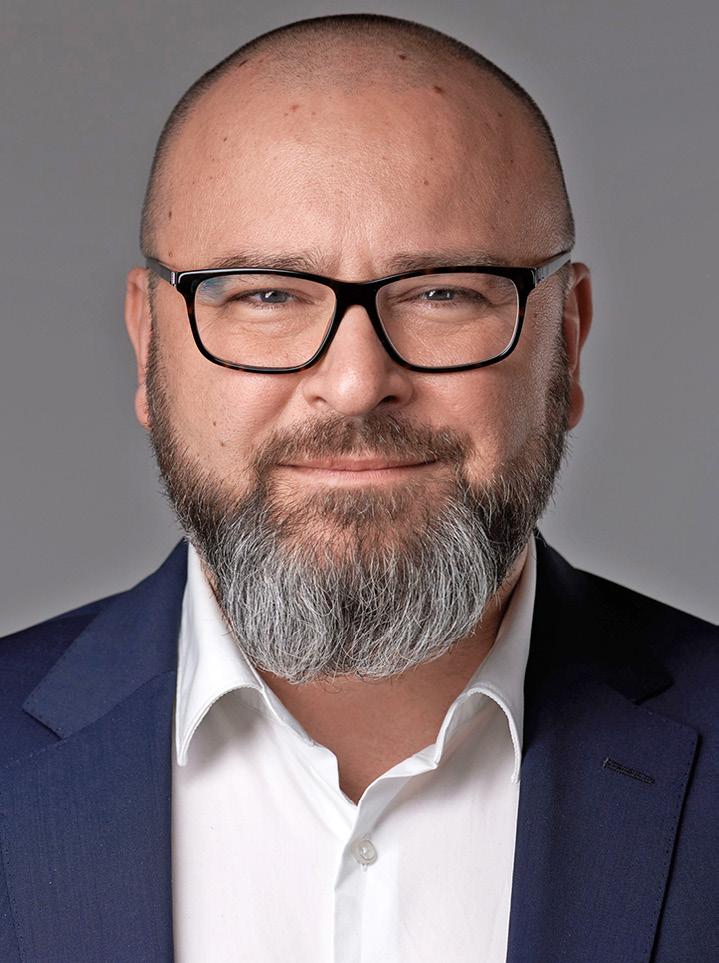
We believe that by having a robust, equitable approach, we can find jobs for more people in disadvantaged groups. We think that the labor
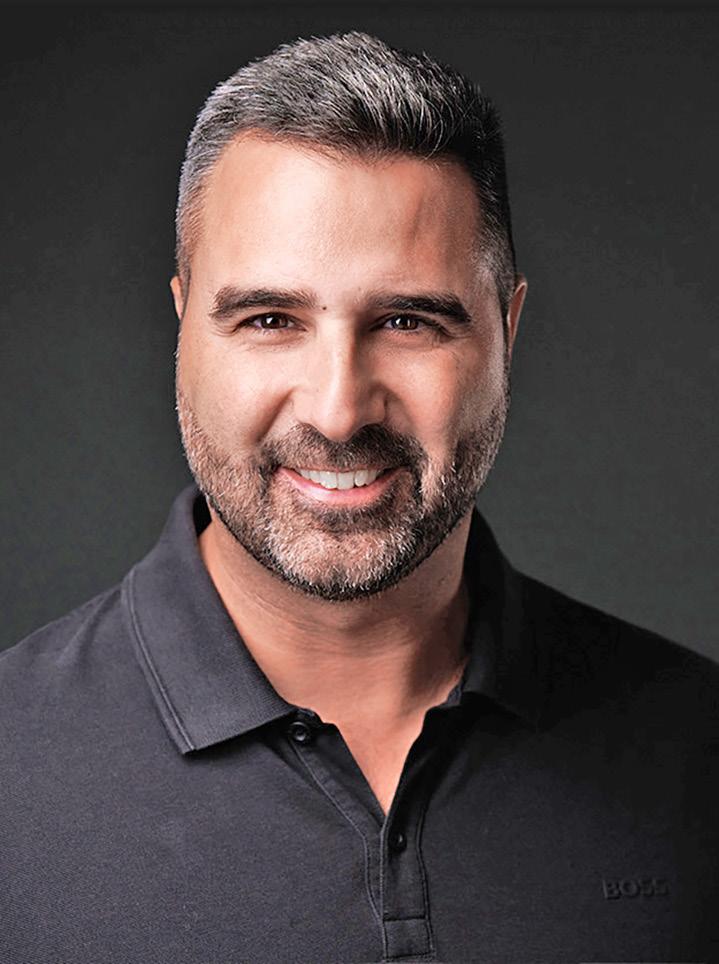
markets will be opening more, and we would like to contribute to supplying the needs of our talents and our clients regardless of geography.
Digitalization and AI will change our jobs a lot. We believe it will help accelerate our tasks and free our consultants to spend more time with talents. We are dedicating time and money to take a leading position in this race.
TBá: The rise of artificial intelligence in the operations of recruitment agencies; the emergence of further innovations in recruitment; fewer companies in the temporary staffing sector will have a larger market share over time; recruitment will become more time-consuming, challenging, and expensive year by year; and recruitment will expand in a more cross-continental manner. ZsB: AI will transform our market, too, replacing many processes. However, there are elements of recruitment that cannot be replaced because the personal, human-tohuman connection carries that extra something that IT cannot replace.
TBí: AI/Chat GPT will allow us to be quicker and more effective. Digitalization, online/video screening, and CRM/ATS systems are already in place in some agencies (not everywhere, though), which is clearly the first step on the way.
JI: The human touch remains paramount in recruitment despite technological advancements. AI-powered processes offer undeniable advantages, but companies that excel will strategically integrate these tools with personalized, consultative approaches. This combined effort allows for faster response times, deeper candidate relationships, and a more fulfilling recruitment experience for all stakeholders.
GK: We see that the recruitment profession has been diluted. It is our mission to set an example with our senior and mid-level staff as an ethical, partnering, thorough and reliable recruitment agency because we need to rebuild trust between clients and high-quality agencies.
In the next five years, only those recruiters who can source, understand the positions and know where the best candidates are will remain in the industry. AI will take over everything else (such as sourcing, profile-matching selection, pre-screening questions).
TNS: One significant change could be a greater emphasis on leveraging technology, data analytics and, of course, artificial intelligence in our sector. I am excited to see where the adoption of AI-driven tools will take the industry, hopefully in a carefully regulated way; there is a lot to look forward to. This technology era will probably bring tremendous opportunities for recruitment agencies to work smarter and have a more sophisticated insight into talent needs, hiring trends, or even sourcing. That said, I am expecting an even more competitive market ahead.
GyP: Companies that can integrate digitalization and AI solutions as deeply and widely as possible into their operations and thus deliver tangible added value to their partners will gain a competitive advantage. In the case of third-country workers, many service providers are already going all-in on this opportunity and neglecting their other traditional services and customer base that require continuous improvement. This, of course, creates an excellent opportunity for agencies that do not switch to Asia Express, so I expect further specialization and segmentation in the market.
Our Recruitment Market Talk Panel 2024
• Sándor Baja, managing director Czech, Hungary, Romania, Randstad Hungary
• Tibor Bányai, managing director, Bányai & Partners Consulting
• Zsolt Beck, executive director and owner, Beck & Partners International HR Consulting
• Tímea Bíró, managing director, Focus Consulting
• József Illés, CEO and founder, IDBC
• Gábor Krivánik, CEO and founder, BetterMore
• Tammy Nagy-Stellini, managing director, Hays Hungary
• György Palásti, country manager, Gi Group Holding Hungary

36 | 4 Special Report www.bbj.hu Budapest Business Journal | April 19 – May 5, 2024
›››
Photo by Studio Romantic / Shutterstock.com
József Illés
Gábor Krivánik


4 Special Report | 37 www.bbj.hu Budapest Business Journal | April 19 – May 5, 2024 Recruitment Agencies
by net revenue from recruitment in 2023 (HUF mln) Gi Group Holding acquired Kelly in 14 European countries in 2024. is merging with Gi Group & Grafton in Hungary. RANK COMPANY WEBSITE NET REVENUE FROM RECRUITMENT IN 2023 (HUF MLN) TOTAL NET REVENUE IN 2023 (HUF MLN) BREAKDOWN BY SEARCH METHODS IN 2023 (%) NO. OF CANDIDATES PLACED IN 2023 NO. OF EMPLOYEES IN SEARCH AND CONSULTING ON MARCH 1, 2024 PERCENTAGE OF CANDIDATES PLACED IN 2023 (%) GUARANTEE PERIOD RECRUITMENT TIME INDUSTRY SPECIALIZATION IN 2023 (%) YEAR ESTABLISHED NO. OF OFFICES IN HUNGARYWORLDWIDE OWNERSHIP (%) HUNGARIAN NONHUNGARIAN TOP LOCAL EXECUTIVE CFO MARKETING DIRECTOR ADDRESS PHONE EMAIL DIRECT SEARCH ADVERTISING PLACEMENT FROM DATABASE OTHER TOP MANAGEMENT MIDDLE MANAGEMENT OTHER BANKING AND FINANCE PRODUCTION/ENGINEERING TOURISM SALES/TRADE/MARKETING IT/TELECOM PHARMACEUTICAL/CHEMICAL SSC/BSC LAW 1 HAYS HUNGARY KFT. www.hays.hu 2,539 6,457 A A A A A A A A A 3–6 months 1–6 weeks ✓ ✓ – ✓ ✓ ✓ ✓ ✓ 2007 1 253 –Hays Plc. (100) Tammy Nagy-Stellini Attila Pencs Nóra Medve 1054 Budapest, Akadémia utca 6. (1) 501-2400 hungary@hays.hu 2 RANDSTAD HUNGARY KFT. www.randstad.hu 2,498 7,734 40 15 35 10 829 127 5 20 75 1-6 months 1-12 weeks ✓ ✓ ✓ ✓ ✓ ✓ ✓ ✓ 2004 5 4,692 –Randstad Holding Luxembourg S.a.r.l. (100) Sándor Baja Lívia Tóth Ágnes Szokody 1134 Budapest, Dózsa György út 146–148. (1) 619-4243 info@randstad.hu 3 GRAFTON RECRUITMENT KFT.(1) www.grafton.hu 1,062 3,372 45 15 35 5 836 41 – 5 95 3 months 1-6 weeks ✓ ✓ ✓ ✓ ✓ ✓ ✓ ✓ 1996 1 500+ –GI GROUP HOLDING S.P.A. (100) György G. Palásti Szabolcs Németh Zsolt Pető 1053 Budapest, Károlyi utca 12. (1) 235-2600 info@grafton.hu
Ranked
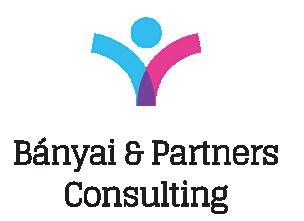

38 | 4 Special Report www.bbj.hu Budapest Business Journal | April 19 – May 5, 2024 RANK COMPANY WEBSITE NET REVENUE FROM RECRUITMENT IN 2023 (HUF MLN) TOTAL NET REVENUE IN 2023 (HUF MLN) BREAKDOWN BY SEARCH METHODS IN 2023 (%) NO. OF CANDIDATES PLACED IN 2023 NO. OF EMPLOYEES IN SEARCH AND CONSULTING ON MARCH 1, 2024 PERCENTAGE OF CANDIDATES PLACED IN 2023 (%) GUARANTEE PERIOD RECRUITMENT TIME INDUSTRY SPECIALIZATION IN 2023 (%) YEAR ESTABLISHED NO. OF OFFICES IN HUNGARYWORLDWIDE OWNERSHIP (%) HUNGARIAN NONHUNGARIAN TOP LOCAL EXECUTIVE CFO MARKETING DIRECTOR ADDRESS PHONE EMAIL DIRECT SEARCH ADVERTISING PLACEMENT FROM DATABASE OTHER TOP MANAGEMENT MIDDLE MANAGEMENT OTHER BANKING AND FINANCE PRODUCTION/ENGINEERING TOURISM SALES/TRADE/MARKETING IT/TELECOM PHARMACEUTICAL/CHEMICAL SSC/BSC LAW 4 TRENKWALDER RECRUITMENT KFT. http//hu.trenkwalder.com 981 3,970 A A A A 1626 26 A A A A 1-8 weeks ✓ ✓ ✓ ✓ ✓ ✓ ✓ ✓ 2018 21 200 –SATRK GmbH (100) Balázs István G. Nagy Henrietta Tóth József Nógrádi 1139 Budapest, Váci út 99–105. (1) 354-0933 infohungary@ trenkwalder.com 5 WHC KFT. www.whc-group.com 863 48,850 50 20 20 10 822 58 10 40 50 3-6 months 2-6 weeks ✓ ✓ ✓ ✓ ✓ ✓ ✓ ✓ 1990 14 35 Péter Berta (40), Zoltán Tóth (30), Viktor Göltl (30) –Péter Berta Gábor Márton László Erős 1074 Budapest, Rákóczi út 70. (1) 787-8399 whc@whc-group.com 6 ADECCO KFT. www.adecco.hu 817 12,569 20 55 10 15 659 32 5 10 85 2-6 months 1-6 weeks ✓ ✓ ✓ ✓ ✓ ✓ ✓ ✓ 1991 7 5,000+ –The Adecco Group (100) Domenico Marra Ádám Varga –1139 Budapest, Fiastyúk utca 4–8. (30) 412-8752 adecco@adecco.hu 7 BÁNYAI & PARTNERS CONSULTING KFT. www.banyaiconsulting.hu 798 798 60 30 10 –697 6 – – 100 6-24 months 1-4 weeks ✓ ✓ – ✓ ✓ ✓ – –2012 1 1 Tibor Bányai (50), Szabolcs Bányai (50) –Tibor Bányai Vivien Raus –1012 Budapest, Logodi utca 44/b (1) 950-6081 e-mail@ banyaiconsulting.hu


4 Special Report | 39 www.bbj.hu Budapest Business Journal | April 19 – May 5, 2024 RANK COMPANY WEBSITE NET REVENUE FROM RECRUITMENT IN 2023 (HUF MLN) TOTAL NET REVENUE IN 2023 (HUF MLN) BREAKDOWN BY SEARCH METHODS IN 2023 (%) NO. OF CANDIDATES PLACED IN 2023 NO. OF EMPLOYEES IN SEARCH AND CONSULTING ON MARCH 1, 2024 PERCENTAGE OF CANDIDATES PLACED IN 2023 (%) GUARANTEE PERIOD RECRUITMENT TIME INDUSTRY SPECIALIZATION IN 2023 (%) YEAR ESTABLISHED NO. OF OFFICES IN HUNGARYWORLDWIDE OWNERSHIP (%) HUNGARIAN NONHUNGARIAN TOP LOCAL EXECUTIVE CFO MARKETING DIRECTOR ADDRESS PHONE EMAIL DIRECT SEARCH ADVERTISING PLACEMENT FROM DATABASE OTHER TOP MANAGEMENT MIDDLE MANAGEMENT OTHER BANKING AND FINANCE PRODUCTION/ENGINEERING TOURISM SALES/TRADE/MARKETING IT/TELECOM PHARMACEUTICAL/CHEMICAL SSC/BSC LAW 8 MANPOWER MUNKAERŐ SZERVEZÉSI KFT. www.manpower.hu 771 6,482 40 30 30 –643 27 5 25 70 1-6 months 1-4 weeks ✓ ✓ ✓ ✓ ✓ ✓ ✓ ✓ 1990 2 2,200 –Integrator Holding d.o.o. (100) Tamás Fehér Antal Csanyik Kitti Horváth 1133 Budapest, Váci út 76. (1) 411-1590 manpower@ manpower.hu 9 BECK AND PARTNERS KFT. www.bap.hu 737 746 A A A A A 34 A A A 3-6 months 1-6 weeks ✓ ✓ ✓ ✓ ✓ ✓ ✓ ✓ 2006 1 1 Zsolt Beck (100) –Zsolt Beck –Bettina Somodi 1119 Budapest, Bártfai utca 15–17. (1) 371-0972 info@bap.hu 10 BLUEBIRD INTERNATIONAL ZRT. https://bluebird.hu/ 554 3,632 85 2 12 1 216 18 – 6 94 3 months 1–4 weeks – – – – 100 – – –2001 1 2 Balázs Réfi (100) –Viktória Hradek Ildikó Kropok –1134 Budapest, Váci út 23–27. (1) 266-2420 info@bluebird.hu 11 JOBSGARDEN KFT. www.jobsgarden.hu 527 1,031 A A A A 238 24 10 30 60 3-6 months 1-6 weeks ✓ ✓ ✓ ✓ ✓ ✓ ✓ ✓ 2001 1 1 Éva Paulovics, Zsuzsa Gárdus (A) ITConnect (A) Zsuzsa Gárdus, Éva Paulovics ––1134 Budapest, Dévai utca 19. (70) 399-9557 office@jobsgarden.hu 12 PROHUMAN ZRT. www.prohuman.hu 520 51,207 60 37 22 5 704 45 3 12 85 1-6 months 1-8 weeks ✓ ✓ ✓ ✓ ✓ ✓ ✓ ✓ 2004 17 42 (100) –Sándor Zakor, Béla Ignácz, Csongor Juhász, Attila Feleki Áron Szeitz Balázs Varró 1146 Budapest, Hungária körút 140–144. (1) 432-1280 prohuman@ prohuman.hu


40 | 4 Special Report www.bbj.hu Budapest Business Journal | April 19 – May 5, 2024 RANK COMPANY WEBSITE NET REVENUE FROM RECRUITMENT IN 2023 (HUF MLN) TOTAL NET REVENUE IN 2023 (HUF MLN) BREAKDOWN BY SEARCH METHODS IN 2023 (%) NO. OF CANDIDATES PLACED IN 2023 NO. OF EMPLOYEES IN SEARCH AND CONSULTING ON MARCH 1, 2024 PERCENTAGE OF CANDIDATES PLACED IN 2023 (%) GUARANTEE PERIOD RECRUITMENT TIME INDUSTRY SPECIALIZATION IN 2023 (%) YEAR ESTABLISHED NO. OF OFFICES IN HUNGARYWORLDWIDE OWNERSHIP (%) HUNGARIAN NONHUNGARIAN TOP LOCAL EXECUTIVE CFO MARKETING DIRECTOR ADDRESS PHONE EMAIL DIRECT SEARCH ADVERTISING PLACEMENT FROM DATABASE OTHER TOP MANAGEMENT MIDDLE MANAGEMENT OTHER BANKING AND FINANCE PRODUCTION/ENGINEERING TOURISM SALES/TRADE/MARKETING IT/TELECOM PHARMACEUTICAL/CHEMICAL SSC/BSC LAW 13 IDBC CREATIVE SOLUTIONS KFT. www.idbc.hu 497 3,605 A A A A A A A A A 3 months 1-4 weeks A A A A A A A A 2014 1 1 József Illés (50), Ágnes Dohos (50) –József Illés Ildikó Oszlánszki Anna Piskolti 1138 Budapest, Népfürdő utca 22. Duna Tower Irodaház, A torony 13. emelet (30) 479-8090 info@idbc.hu 14 FOCUS CONSULTING KFT. www.focusconsulting.hu CMYK: 51, 38, 37, 25 RGB: #5d5c5c CMYK: 2, 29, 97, 0 RGB: #f8b20b CMYK: 0, 0, 0, 66 RGB: #565656 CMYK: 0, 0, 0, 30 RGB: #b2b2b2 485 500 55 10 30 5 A 16 30 30 40 3-6 months 1-6 weeks ✓ ✓ ✓ ✓ ✓ ✓ ✓ ✓ 1997 1 1 Tímea Bíró (100) –Tímea Bíró ––1138 Budapest, Váci út 135–139. (70) 883-7514 info@focusconsulting.hu 15 KARRIER HUNGÁRIA KFT. www.karrierhungaria.hu 479 487 30 15 35 20 260 22 20 30 50 3-6 months 2-6 weeks 40 10 – 15 10 – 20 5 2007 1 1 Beáta Fürjész (50), Gabriella Ruff Berzéthyné (50) –Beáta Fürjész, Gabriella Ruff Berzéthyné ––1075 Budapest, Madách Imre út 13–14. (1) 619-0694 info@karrierhungaria.hu 16 BETTERMORE CONSULTING KFT. www.bettermore.hu 413 642 A A A A A 4 A A A 3-6 months 1-2 weeks ✓ ✓ ✓ ✓ ✓ ✓ ✓ ✓ 2013 1 1 Gábor Krivánik (100) –Gábor Krivánik ––1054 Budapest, Szabadság tér 7. (20) 578-2756 hello@bettermore.hu
idbc.hu

László Hadi, Botond Csordás, Attila Pál, Attila Dobár (100)
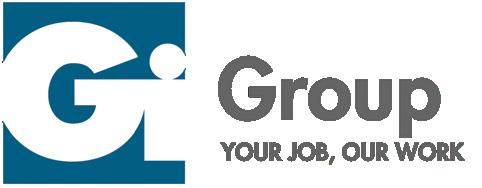
Éva Fehér György Thury Beatrix Pálvölgyi
1133 Budapest, Árbóc utca 6. (1) 239-9922 job@job.hu
4 Special Report | 41 www.bbj.hu Budapest Business Journal | April 19 – May 5, 2024 RANK COMPANY WEBSITE NET REVENUE FROM RECRUITMENT IN 2023 (HUF MLN) TOTAL NET REVENUE IN 2023 (HUF MLN) BREAKDOWN BY SEARCH METHODS IN 2023 (%) NO. OF CANDIDATES PLACED IN 2023 NO. OF EMPLOYEES IN SEARCH AND CONSULTING ON MARCH 1, 2024 PERCENTAGE OF CANDIDATES PLACED IN 2023 (%) GUARANTEE PERIOD RECRUITMENT TIME INDUSTRY SPECIALIZATION IN 2023 (%) YEAR ESTABLISHED NO. OF OFFICES IN HUNGARYWORLDWIDE OWNERSHIP (%) HUNGARIAN NONHUNGARIAN TOP LOCAL EXECUTIVE CFO MARKETING DIRECTOR ADDRESS PHONE EMAIL DIRECT SEARCH ADVERTISING PLACEMENT FROM DATABASE OTHER TOP MANAGEMENT MIDDLE MANAGEMENT OTHER BANKING AND FINANCE PRODUCTION/ENGINEERING TOURISM SALES/TRADE/MARKETING IT/TELECOM PHARMACEUTICAL/CHEMICAL SSC/BSC LAW 17 HSA KFT. www.hsa.hu 392 10,172 15 25 50 10 A A 40 38 22 3-6 months 1-6 weeks ✓ ✓ ✓ ✓ ✓ ✓ ✓ ✓ 2000 15 16 HSA Group Zrt. (91), MELÓ-DIÁK Holding Zrt. (9) –László Mátyás Erika Dékány László Zsilka 4025 Debrecen, Széchenyi utca 48. (52) 446-991 info@hsa.hu 18 REED MAGYARORSZÁG KFT. reedglobal.hu 348 1,043 A A A A 192 15 4 6 90 3-6 months 1-3 weeks ✓ ✓ ✓ ✓ ✓ ✓ ✓ ✓ 2008 1 102 –Reed Specialist Recruitment (Global) Ltd. (100) Klára Pethő Lee Richards James Adams 1051 Budapest, Bajcsy-Zsilinszky út 12. (70) 300-9706 info.hungary@ reedglobal.com 19 VISION RECRUITMENT KFT. www.visionrecruitment.hu 343 343 85 – 10 5 148 22 15 45 40 A 1-4 weeks 25 10 – 5 20 5 35 –2013 1 1 (100) –
––
20 JOB SZEMÉLYZETI TANÁCSADÓ KFT. www.jobgroup.hu 337 2,471 60 10 30 –148 20 26 31 43 3-6 months 2-5 weeks ✓ ✓ ✓ ✓ ✓ ✓ ✓ ✓ 1992 2 2
Márta Szabó, Dorottya Pákozdi
1027 Budapest, Horvát utca 14–24. building A (20) 333-8516 info@ visionrecruitment.hu
–
21 GI GROUP RECRUITMENT KFT.(2) www.gigroup.hu 299 3,968 A A A A 419 26 – 5 95 1-3 months 0-4 weeks ✓ ✓ ✓ ✓ ✓ ✓ ✓ ✓ 2022 2 500+ –GI GROUP HOLDING S.P.A. (100) György
1053
235-2600 hu.info@gigroup.com 22 PANNONJOB HUMÁN SZOLGÁLTATÓ ÉS TANÁCSADÓ KFT. www.pannonjob.hu 295 22,504 A A A A A A A A A 3-6 months 2-8 weeks ✓ ✓ ✓ ✓ ✓ ✓ ✓ ✓ 1993 6 6 Videoton Holding Zrt. (100) –Attila Molnár ––8000 Székesfehérvár, Berényi út 72–100. (22) 554-170 info@pannonjob.hu 23 ISEEQ KFT. www.iseeq.hu 261 261 45 – 35 20 61 8 10 30 60 3 months 2-3 weeks ✓ – – ✓ ✓ – – –2012 1 1 Corporate (100) –Balázs Bondici, Tamás Püski ––1061 Budapest, Király utca 26. (70) 775-2575 hello@iseeq.hu 24 CARBYNE KFT. www.carbyne.hu 219 219 70 5 20 5 82 6 25 35 40 3-6 months 2-6 weeks – ✓ – ✓ – ✓ – –2017 1 1 Individuals (100) –Péter Sitte ––1124 Budapest, Apor Vilmos tér 18. (20) 401-4766 info@carbyne.hu 25 RECRUBY HUNGARY KFT. www.recruby.com 213 213 55 15 25 5 152 12 5 10 85 3-6 months 1-6 weeks 10 25 – 5 30 – 25 5 2019 1 1 Individuals (100) –Gergely Parti Andrea Varga Adrienn Parti 1143 Budapest, Hungária körút 83. (20) 415-9803 info@recruby.com 26 DIEPEVEEN & PARTNERS KFT. www.diepeveenpartners.com 205 217 70 20 10 –49 3 40 40 20 3-12 months 3-6 weeks ✓ ✓ – ✓ ✓ – ✓ ✓ 2018 1 1 –Frido Cornelis Diepeveen (100) Frido Cornelis Diepeveen ––1007 Budapest, Danubius Grand Hotel Margitsziget (30) 859-3015 frido.diepeveen@ diepeveenpartners.com
G. Palásti Szabolcs Németh Zsolt Pető
Budapest, Károlyi utca 12. (1)

Gabriella Ruff Berzéthyné (50), Beáta Fürjész (50)
Gabriella Ruff Berzéthyné
1075 Budapest, Madách Imreút 13–14. (1) 619-0694 info@karrierhungaria.hu
Küzmös, Ákos Jáhny Roland Huszár
1023 Budapest, Árpád fejedelem útja 31. (1) 766-5626 getwork@getwork.hu 32 MAN AT WORK HUMÁNSZOLGÁLTATÓ
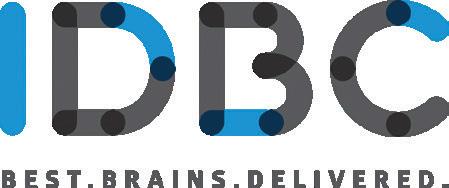
42 | 4 Special Report www.bbj.hu Budapest Business Journal | April 19 – May 5, 2024 RANK COMPANY WEBSITE NET REVENUE FROM RECRUITMENT IN 2023 (HUF MLN) TOTAL NET REVENUE IN 2023 (HUF MLN) BREAKDOWN BY SEARCH METHODS IN 2023 (%) NO. OF CANDIDATES PLACED IN 2023 NO. OF EMPLOYEES IN SEARCH AND CONSULTING ON MARCH 1, 2024 PERCENTAGE OF CANDIDATES PLACED IN 2023 (%) GUARANTEE PERIOD RECRUITMENT TIME INDUSTRY SPECIALIZATION IN 2023 (%) YEAR ESTABLISHED NO. OF OFFICES IN HUNGARYWORLDWIDE OWNERSHIP (%) HUNGARIAN NONHUNGARIAN TOP LOCAL EXECUTIVE CFO MARKETING DIRECTOR ADDRESS PHONE EMAIL DIRECT SEARCH ADVERTISING PLACEMENT FROM DATABASE OTHER TOP MANAGEMENT MIDDLE MANAGEMENT OTHER BANKING AND FINANCE PRODUCTION/ENGINEERING TOURISM SALES/TRADE/MARKETING IT/TELECOM PHARMACEUTICAL/CHEMICAL SSC/BSC LAW 27 MANUVIA EXPERT RECRUITMENT HU KFT. www.manuviarecruitment.hu 190 190 A A A A 98 13 A A A 3-6 months 3-6 weeks ✓ ✓ ✓ ✓ ✓ ✓ ✓ ✓ 2018 1 1 –Manuvia SK a.s. (100) Rita Tasnády ––1082 Budapest, Futó utca 35–37. (20) 229-9276 budapest@ manuvia.com 28 HUMÁN CENTRUM KFT. www.humancentrum.hu 151 7,832 A A A A A A A A A 3-6 months 2-8 weeks ✓ ✓ ✓ ✓ ✓ ✓ ✓ ✓ 1993 13 13 Individuals (100) –Katalin Bor, Róbert Göbl, Zsuzsanna Szabó ––1077 Budapest, Wesselényi utca 11. (1) 877-0900 info@humancentrum.hu 29 PANNON-WORK ZRT. www.pannonwork.hu 130 25,717 40 35 15 10 203 14 5 20 75 3 months 4-8 weeks ✓ ✓ ✓ ✓ ✓ ✓ ✓ ✓ 2004 17 19 Grosvenor Kft.
–
30 KARRIER RENT KFT. www.karrierhungaria.hu 125 129 30 40 25 5 70 5 30 25 45 3-6 months 2-6 weeks 30 25 – 15 5 – 20 5 2012 1 1
(100)
Géza Homonnay, Péter Laczi Krisztina Zita Renge Marianna Baksy 1114 Budapest, Bartók Béla út 15/D (1) 381-1048 budapest@ pannonwork.hu
–
–
–
GET WORK TREND KFT. www.getwork.hu 118 6,886 65 20 10 5 90 22 10 5 85 3 months 1-8 weeks ✓ ✓ – ✓ ✓ – ✓ –2004 10 10 László Küzmös (100) –László
31
–
ÉS SZEMÉLYZETI TANÁCSADÓ KFT. www.manatwork.hu 107 20,449 15 10 35 40 A A 5 20 75 1-6 months 1-12 weeks ✓ ✓ ✓ ✓ ✓ ✓ ✓ ✓ 1998 6 6 Volano Kft. (100) –Csaba Ottó Orsolya Horvai Módné Adrienn Tanai 8200 Vezsprém, Ady Endre utca 3. (20) 929-2430 info@manatwork.hu 33 IDBC NEW TECH KFT. www.idbc.hu 105 453 A A A A A A A A A 3 months 1-4 weeks A A A A A A A A 2014 1 1 József Illés (50), Ágnes Dohos (50) –József Illés Ildikó Oszlánszki Anna Piskolti 1138 Budapest, Népfürdő utca 22. Duna Tower Irodaház, A torony 13. emelet (30) 479-8090 info@idbc.hu 34 MENTON JOBS KFT. www.mentonjobs.hu 102 9,253 12 76 11 1 83 4 – 6 94 1-3 months 4-6 weeks ✓ ✓ ✓ ✓ ✓ ✓ ✓ –2011 7 7 Viktor Stasztny (50), Tamás Horváth (50) –Viktor Stasztny, Tamás Horváth Henrietta Kovács –1095 Budapest, Soroksári út 48. (70) 415-2419 hello@mentonjobs.hu 34 VIAPAN DOLOGIDŐ KFT. www.viapan.hu 102 4,092 87 13 – –115 9 10 15 75 3-6 months 4-6 weeks ✓ ✓ ✓ ✓ ✓ ✓ ✓ ✓ 2001 12 15 Individuals (100) –Gábor Csizmadia Péter Vida Bence Husi 1012 Budapest, Pálya utca 4. (20) 514-3249 miseta.gabor@ viapangroup.com
7624 Pécs, Ferencesek utcája 52. (72) 212-368 info@hr-group.hu
Krisztina Varga
1165 Budapest, Papír utca 19. (20) 982-3628, (20) 941-4614 info@ workplus.consulting


4 Special Report | 43 www.bbj.hu Budapest Business Journal | April 19 – May 5, 2024 A = would not disclose, NR = not ranked, NA = not appliacable This list was compiled from responses to questionnaires received by April 17, 2024, and publicly available data. To the best of the Budapest Business Journal’s knowledge, the information is accurate as of press time. The list is based on companies’ voluntary data submissions. While every effort is made to ensure accuracy and thoroughness, omissions and typographical errors may occur. Additions or corrections to the list should be sent on letterhead to the research department, Budapest Business Journal, 1075 Budapest, Madách Imre út 13–14, or faxed to (1) 398-0345. The research department can be contacted at research@bbj.hu RANK COMPANY WEBSITE NET REVENUE FROM RECRUITMENT IN 2023 (HUF MLN) TOTAL NET REVENUE IN 2023 (HUF MLN) BREAKDOWN BY SEARCH METHODS IN 2023 (%) NO. OF CANDIDATES PLACED IN 2023 NO. OF EMPLOYEES IN SEARCH AND CONSULTING ON MARCH 1, 2024 PERCENTAGE OF CANDIDATES PLACED IN 2023 (%) GUARANTEE PERIOD RECRUITMENT TIME INDUSTRY SPECIALIZATION IN 2023 (%) YEAR ESTABLISHED NO. OF OFFICES IN HUNGARYWORLDWIDE OWNERSHIP (%) HUNGARIAN NONHUNGARIAN TOP LOCAL EXECUTIVE CFO MARKETING DIRECTOR ADDRESS PHONE EMAIL DIRECT SEARCH ADVERTISING PLACEMENT FROM DATABASE OTHER TOP MANAGEMENT MIDDLE MANAGEMENT OTHER BANKING AND FINANCE PRODUCTION/ENGINEERING TOURISM SALES/TRADE/MARKETING IT/TELECOM PHARMACEUTICAL/CHEMICAL SSC/BSC LAW 36 FOX & WOLF HR SOLUTIONS KFT. www.foxandwolf.hu 99 99 54 17 29 –54 5 7 15 78 3 months 2-6 weeks ✓ ✓ – ✓ ✓ – ✓ –2017 1 1 Ágnes IgnáczFuszkó (100) –Ágnes Ignácz-Fuszkó ––1064 Budapest, Izabella utca 50. (70) 366-5274 info@foxandwolf.hu 37 AARENSON CONSULTING KFT. www.aarenson.hu 74 74 100 – – –A A A A A 3-6 months 2-4 weeks A A A A A A A A 2005 2 2 Individuals (100) –Péter Bogdanovits ––1143 Budapest, Gizella út 42–44. (30) 370-5311 office@aarenson.hu 38 AHC INTERNATIONAL KFT. www.ahc-international.hu 56 56 65 5 20 10 A 3 25 45 30 3-6 months 2-5 weeks – 15 75 5 – 5 – –1998 1 1 Réka DorozsmaiGallasz (75) Udo M. Chisteé (25) Réka DorozsmaiGallasz ––1133 Budapest, Bessenyei utca 8–10. (30) 251-2531 ahc.budapest@ ahc-international.hu 39 HR-RENT KFT. www.hr-group.hu 35 13,723 60 10 20 10 98 2 5 5 90 3-6 months 1-5 weeks – 68 – 7 5 10 10 –2005 2 2
–
––
40 WORKPLUS HUNGARY KFT. www.workplus.consulting www.workplusglobal.com 24 68 70 10 10 10 15 2 30 20 50 3-6 months 1-6 weeks 10 20 – 30 30 – 10 –1989 1 2 Krisztina Varga (100) –
––
Prohuman Zrt. (83), Family Investor Kft. (17)
Attila Feleki
NR FP INVEST TRADE KFT. www.tesk.hu A 227 (2022) 25 10 50 15 350 15 10 25 65 3-6 months 1-4 weeks 5 65 – 15 10 – 5 –2002 1 1 Individuals (100) –Péter Tokár, Ákos Pintye Renáta Ivanics-Horváth –1138
NR HR DIREKT KFT. www.hrdirekt.com A 15,300 A A A A A A A A A A A A A A A A A A A A A A (100) –Helga Kurucz-Réti ––1095 Budapest, Soroksári út 48–54. (1) 769-6433 info@hrdirekt.com NR JOBTAIN HR SZOLGÁLTATÓ KFT. www.jobtain.hu A 13,157 – 100 – –9 2 – 20 80 3 months 4-6 weeks 10 80 – 10 – – – –2004 10 12 Magdolna Mihályi (90), Anna ChapmanVarga (10) –Magdolna Mihályi Veronika Balogh Attila Molnár 1094 Budapest, Tűzoltó utca 72. (30) 974-6035 partner@jobtain.hu NR PBS INTERNATIONAL KFT. www.pbs-job.hu A 81 (2022) A A A A A A A A A A 2-6 weeks A A A A A A A A 2002 1 1 Renáta Restás (100) –Renáta Restás ––2016 Leányfalu, Körte utca 4. (1) 786-5666 info@pbs-job.hu NOTES: (1) Since January 3, 2024, Kelly Services Hungary Kft. has been a member of GI Group Holding, whose relevant business results are reported at Grafton Recruitment Kft. (2) Since January 3, 2024, Kelly Services Hungary Kft. has been a member of GI Group Holding, whose relevant business results are reported at GI Group Recruitment Kft.
Budapest, Váci út 184. (30) 950-8818 info@tesk.hu
5 Socialite
Rubik’s Cube at 50: It’s a Numbers Game
With around 500 million sold, Rubik’s Cube is the world’s bestselling puzzle game and toy. It’s claimed that one in seven people globally has fiddled with one at some time or other. If you’ve been in this country for longer than five minutes, you’ll know that the inventor was Hungarian Ernő Rubik.

became a member of the faculty of interior architecture and design.
While it’s estimated that Ideal sold around
Rubik’s Cube World Championship was held in Budapest in 1982, with the winner solving the puzzle in 22.95 seconds.
Speedcubing
Red Bull launched its Rubik’s Cube World Championship in 2018. Today, as the surprisingly gripping “The Speed Cubers” documentary currently streaming on Netflix reveals, the competitive world of “speedcubing” or “speedsolving” is thriving.
Max Park, a Korean-American in his early 20s, has held the “solving” world record, a mindboggling 3.13 seconds, since June 2023.
“Concentration, curiosity, playfulness, the desire for a solution. These form the basis of all creative human activity. Puzzles aren’t just for fun or to kill time. Puzzles show us how to use our own creativity.”
Park is autistic. In the documentary, his parents suggest that speedcubing has helped his social development. Recognizing that the cube can be helpful for children with learning difficulties, Spin Master, the current Canadian owner of the brand, has started Rubik’s Academy to integrate learning how to solve it into the classroom.
HOLZER
The Cube’s 50th anniversary this year is being celebrated with a plethora of tieins, including, believe it or not, Barbie. There are cubes based on superheroes, a Sensory Cube, and a cube with tiles that change color when viewed from different angles called Rubik’s Impossible.
My favorite is “Rubik’s Retro,” which features a logo that wouldn’t look out of place on the storefront of a backstreet Budapest bar and nods to its origin story.
Ernő Rubik was born in Budapest in July 1944. His mother was poet Magdolna Szántó, and his father, also Ernő Rubik, an internationally respected glider engineer. After World War II, Rubik Senior’s glider and kayak factory was nationalized by the ever-rapacious Communists, but he stayed on.
Between 1958 and 1962, Rubik Jr. studied sculpture at the Secondary School of Fine and Applied Artists. He attended the Budapest University of Technology from 1962 to
1967, joining the architecture faculty. Next, he enrolled at the Hungarian Academy of Applied Arts and
In 1974, while lecturing in architecture, Rubik invented his first cube, which he called the Magic Cube, to teach his students about threedimensional spaces. This featured three times three rotatable rows.
From the beginning, the cube captivated most people who happened to pick it up. This, Rubik has said, is because it activates “very important skills in all of us: concentration, curiosity, playfulness, the desire for a solution. These form the basis of all creative human activity. Puzzles aren’t just for fun or to kill time. Puzzles show us how to use our own creativity.”
Logic Game
Rubik decided to patent his cube under the less-than-snappy name of the “Three-Dimensional Logic Game.” The Hungarian patent was granted in October 1976. Rubik received his first order for 5,000 cubes in 1977.
In 1979, Rubik gave Hungarian businessman Tibor Laczi permission to take a cube to the Nuremberg Toy Fair. Here, it was spotted by the U.K.-based Seven Towns toy company, whose founder, Tom Kremer, engineered a deal with the American Ideal Toy Company, inventors of the Teddy Bear, to promote the cube globally.
200 million
Rubik’s Cubes worldwide between 1980 and 1983, the company was unable to prevent knockoff cubes from swamping the market. By October 1982, the New York Times claimed that the cube craze had died. Sales plummeted, although demand was still high in China and the USSR.
Despite the dire predictions, the Rubik brand continued to innovate throughout the 1980s with million-selling products like Rubik’s Snake and Magic.
The cube itself became part of pop culture in the 2000s, featuring on “The Simpsons” six times and appearing in the 2006 movie “The Pursuit of Happyness,” starring Will Smith, as well as Disney’s 2008 “Wall-E.” Rami Sbahi auditioned for “America’s Got Talent” in 2014 by solving a Rubik’s Cube at speed with his hands and feet. In 2015, Justin Bieber solved the cube on James Corden’s “Late Late Show.” Cube art, with artists making enormous mosaics out of Cubes placed alongside each other, their faces turned to different colors, is a thing on social media. Check out Giovanni Contardi or Delphine Tran. Back in the early ’70s, it took Ernő Rubik a month to solve his cube. The first
Toy review site “The Good Play Guide,” says that Rubik’s Coach Cube, a version that promotes step-by-step learning, “promotes memory development, visual pattern recognition, muscle memory, as well as persistence.”
When Rubik’s Cube was snapped up by Spin Master in 2020, the toy colossus cited speedcubing as one of the reasons why it acquired the brand. The pandemic also gave the fortunes of Rubik’s Cube a substantial boost.
We had extra time to try and solve it; we didn’t want to feel we were wasting our days or those of our children endlessly scrolling on social media. We were using our brains as well as our fingers. Whatever the reason, Forbes reported that in
2021,
sales were projected to be up by 15% to 20%. In 2022, global retail sales were USD 75.3 million.
At the time Spin Master acquired his cube, Ernő said he was confident the firm would “be able to steer the Rubik’s brand through the twists and turns and challenges of the changing toy industry.”
The inventor will turn 80 this July 13.
Today, no doubt thanks in part to the Netflix documentary, Rubik’s presence in the media, social or otherwise, but primarily because of its sheer addictiveness (its inventor claims there are 43 quintillion combinations), the not-sohumble cube can probably look forward to another 50 years of twisting minds. And I’m still perversely proud to say I’ve never attempted Mr. Rubik’s Cube.
www.bbj.hu Budapest Business Journal | April 19 – May 5, 2024
DAVID
Rubik’s Cube might be 50, but it is still a toy for all generations. Photo by MadamKaye / Shutterstock.com
PesText Literary Festival Returns to Budapest
Organized by the Hungarian Literary Authors’ Rights Defenders and Rights Management Association (MISzJE), the PesText Spring 2024 Festival will be held on April 26 and 27 at the Három Holló pub in Piarista köz 1, District V, with a series of conversations with six international authors.

Culture Matters
life, Baydar remains a relevant and popular writer in her home country, Turkey, and internationally. She will discuss her latest translated novel “The Lost World.” Swiss-Italian Calì’s recently translated works, including “Votez le Loup” (“Vote for the Wolf”) tackle similar themes. Although Calí targets a younger audience, mature topics such as war and political engagement mean his featured works can appeal to older audiences as well. Similar themes appear in the book “Border Regions. Why Borders are Where They Are” by Dutch writer Bokkum, as it explores the impact of borders on countries.
The authors present will include Giulia Caminito, speaking with Zsófia Czakó, David Machado (speaking with Bálint Urbán), Oya Baydar (with
Éva Bánki), Davide Calì (with Dávid Szél), Luca Novelli (with Krisztián Puskár), and Milo Van Bokkum (in conversation with Péter Szűcs). Many of these authors write about political and social issues with works ranging from comic books to nonfiction to novels, increasing the diversity of the festival beyond the mere nationalities of those involved. The books of all the featured writers can be bought via PesText’s Facebook page.
Portuguese novelist Machado’s “Average Happiness Index” was a winner of the European Union Literary Prize in 2015 and is renowned for its humor and drama. Shifting toward a discussion of anxieties and social injustice, Italian writer Caminito’s “The Water of the Lake is Never Sweet” follows the narrator’s internal world as they experience their coming-of-age.
As someone who experienced the ending of socialist movements and has participated in activism for a significant portion of her
Collector’s House Museum Adds English Tours
A private museum that has been experiencing major success with its guided tours since opening in the fall of 2023 will launch an English-language service from June, the curator has told the Budapest Business Journal
The Gyűjtő Háza, or The Collector’s House in English, is housed in the Kőrössy Villa , once the home of the respected architect Albert Kálmán Kőrössy, who used his extensive knowledge and experience to design the house in the Art Nouveau style. Among other things, the house contains
570 pieces of a 1,000-piece Zsolnay porcelain collection (the remainder is in storage) of András Szabó, considered one of the most important Zsolnay porcelain collections in the world.

“We offer a complex experience to our guests: we guide them to the end of the 19th century through masterpieces of architecture, applied arts and fine arts,” says Magdolna Költő, president of the ResoArt Foundation, established by Szabó to manage his collection of Zsolnay ceramics and paintings.
“We present the life story of Albert Kálmán Kőrössy, the fate of the Art Nouveau villa, but ‘The Collector’s House’ is also a tribute to the Zsolnay heritage. We tell the unique success
The PesText International Literary and Cultural Festival was launched in 2019 by MISzJE and the Petőfi Cultural Agency. PesText aims to show how the literary works of different languages and cultures can appear in the reading experiences of another country or nation. All its programs are free. Follow the festival on social media for further details.
story of the Zsolnay family and factory from the second half of the 1870s to the end of the 1920s,” Költő explains.
The museum can only be visited with a tour, and as it is fully booked until May, potential visitors will have to pick a summer date. Slots are available now. However, it must be noted that there will be a break in tours from the middle of July; they will resume at the beginning of September.
“From June, we will also provide guided tours in English so that both visitors and foreigners living here can enjoy this experience,” adds Krisztina Csalló, the exhibition curator.
The museum can be found at Városliget Fasor 47, in Pest’s District VII. Tickets and some more information are available in English at ligetplusz. hu/collectorshouse-rso. Tickets cost for HUF 20,000 per person.

46 | 5 Socialite www.bbj.hu Budapest Business Journal | April 19 – May 5, 2024 A kiállítás a Virginia Museum of Fine Artsszal együttműködve valósult meg Kertész Moholy-Nagy Capa... HUNGARIAN PHOTOGRAPHERS IN AMERICA (1914–1989) Main Sponsor: Co-operating Partners: Partner: Major Sponsor: André KERTÉSZ: Fire Escape, New York, 1949 Virginia Museum of Fine Arts, Richmond Adolph D. and Wilkins C. Williams Fund 2024. 04.06. –08.25. mfab.hu Museum of Fine Arts, Budapest
A regular look at culture issues in Hungary and the region
MAJA PÉNZES
ADVERTISEMENT
MAJA PÉNZES
Chamber of Commerce Corner

Swiss-Hungarian Chamber of Commerce (Swisscham)
“How to Start to Work with AI” was a great event co-organized by the AI Coalition, Netzwerk Digital (and two partner chambers) at Ericcson Hungary. During the event, attendees learned that embarking on an AI project requires a thorough understanding of several aspects. We heard a presentation from Marc-Tell Madl on the legal backbone of AI and that understanding the legal environment is essential to ensure compliance and mitigate risks identified by the new EU AI Act. Case studies were presented by two experts who provided fundamental insights into how to get AI projects off the ground. Finally, there was an inspiring panel discussion with industry experts sharing their views on the future of AI, trends and opportunities. The importance of C-level leadership in AI strategy-making and public decision-makers to support AI start-ups was also highlighted during the discussion. Swisscham’s next event in May will be a factory visit to the EU-Fire Group
• When: Thursday, May 2, 10:30 a.m.-3 p.m.
• Where: EU-Fire Kft. Ipari termelés, 4751 Kocsord, 042/3/A hrsz.
• Fee: Members free; non-members HUF 15,000.
The Netherlands-Hungarian Chamber of Commerce (Dutcham)
As in previous years, Dutcham will organize a casual seated Orange Dinner with Dutch, Indonesian and Caribbean cuisine in May. The dress code simply requests that you wear something orange.
• When: May 31, 7 p.m.
• Where: Crowne Plaza Budapest, Váci Út 1-3, Budapest 1062
• Fee: Member single ticket HUF 55,000; non-member single ticket 65,000; member table of 10 HUF 500,000 (all include 27% VAT).
This regular section of the Budapest Business Journal features news and events from various international business chambers. For further information and to register for specific events, visit the organizing chamber’s website. If you have information for inclusion on this page, send an email in English to Annamária Bálint at annamaria.balint@bbj.hu
Hungarian-Norwegian Chamber of Commerce (HNCC)
Adam Laska, one of the founders (and still an active member) of the HNCC, jointly with the Embassy of Hungary, Oslo, organized a cultural event promoting Hungary for the residents and the employees of the “Midtåsenhjemmet” elderly care facility on April 18. Guests could taste Hungarian food and wine accompanied by live Hungarian music performed on the piano by Per Roger Karang. They also had the chance to glimpse Hungarian culture and the most attractive sights worth visiting, not only in the cities but also in the countryside and the traditional spa culture.
The Italian Chamber of Commerce for Hungary (CCIU)
On April 8-9, the CCIU was invited to “Selecting Italy: Attraction of Foreign Investments and Regional Value Chains” in Trieste, representing an important pillar for cooperation with Italy and leading professional partners. The event was organized by the President of Friuli Venezia Giulia Regional Council, Massimo Fedriga, along with our association Assocamerestero, which groups 86 Italian Chambers of Commerce Abroad (CCIEs) in 63 countries and connects local associations with entrepreneurs and professionals to foster the internationalization and promotion of “Made in Italy” in the world. CCIU vice president Alessandro Balli represented the chamber at the event. “Selecting Italy” is a platform for government representatives, local authorities, and businesses to initiate dialogue and build solutions.
German Hungarian Chamber of Industry and Commerce (DUIHK)
This year’s 12th DUIHK Information Day once again offered the opportunity to realize one of the chamber’s core concerns (and competencies), promoting direct business relationships between German and Hungarian partners. The thematic forums focused on global supply chains, sustainable HR management and the effective use of the benefits provided through a membership within the chamber. Economic development trends were also presented, and around 70 individual counseling sessions were held with the chamber’s experts. The information day highlighted German-Hungarian business relations from a concrete and practical perspective. Managing director Barbara Zollmann presented the critical tasks and areas of expertise of the DUIHK, while head of communications Dirk Wölfer gave an insight into current business forecasts and the initial results of the latest economic report, which will be published at the end of April.
The “Hungary in the Global Supply Chain: Opportunities for Hungarian Suppliers” forum focused on the increasing relevance of adaptability and versatility in the market to be able to cope with global crises (and consequently with strains
on supply chains), but also with market influences such as the planned EU law on supply chain due diligence. The advantages of preventative measures in escalation management and the growing competition with non-European competitors were also underlined.
In the “Sustainable HR Management: Proven SME Strategies” forum, ideas for recruiting a competent workforce were explained, and the reciprocity between employee and employer in terms of productivity and efficiency, from the induction process to full integration into the company, was emphasized.
Finally, in the third forum, a panel discussion allowed guests to ask existing members questions about their experiences and cooperation with the DUIHK and to receive valuable tips for effective membership. All members stressed the importance of interactivity and personal involvement in realizing the full potential of the membership. Used correctly, it offers opportunities to find operational interfaces, expert groups and new target groups. Members could utilize helpful advice, information and experience to improve their company’s market position.
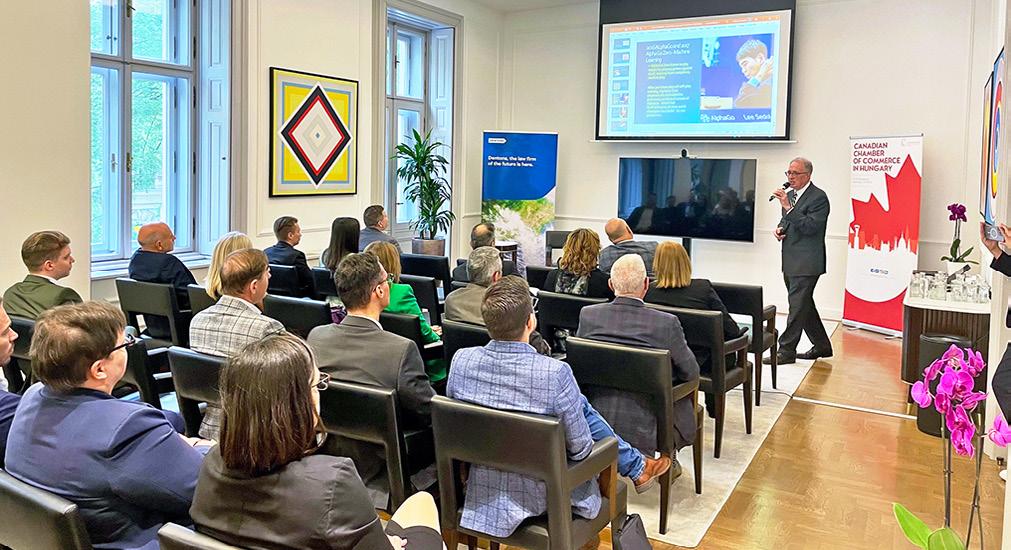
Canadian Chamber of Commerce in Hungary (CCCH)
In today’s fast-moving business scene, AI is making waves. Recently, the CCH and Dentons Budapest teamed up to host an event titled “Future Shock in the Age of AI,” delving deep into this exciting frontier, featuring Tímea Bana and Theodore Sebastian Boone. Leading the charge was Boone, a wellknown figure in the legal and academic worlds. He broke down the risks and rewards of AI, drawing on his expertise from Dentons and Corvinus University, where he teaches. Boone covered everything from the risky bits of AI to how it can read our emotions and what we need to watch out for. Bana’s significant input supplemented Boone’s ideas, notably in addressing AI’s legal and regulatory complexities. As a partner at Dentons Budapest, her experience helped her navigate the complex legal landscape. Bana’s astute analysis highlighted critical legal considerations and strategic methods for firms seeking to maintain compliance and reduce risks in an increasingly AI-driven future. Boone and Bana gave guests a thorough understanding of AI’s disruptive influence on business. Their speeches emphasized the critical need to thoroughly understand AI to make informed and smart business decisions in today’s rapidly changing landscape.
Belgian Business Club in Hungary (Belgabiz)
Upon the invitation of the Embassy of Denmark in Budapest, Belgabiz members participated in a networking event at the Danish residence in Budapest on April 9. Equilibrium Institute’s co-founder Ákos Kozák and chief economist Barna Szabó presented an insightful overview of the Hungarian economic outlook to the members of the Danish and Belgian business community. The event served as a platform for professionals to gain valuable insights into the current state and prospects of the Hungarian economy, providing a comprehensive analysis and forecasts and addressing key factors such as GDP growth, inflation rates, investment opportunities, and challenges. The gathering facilitated meaningful discussions and networking opportunities, fostering collaboration and informed decision-making among attendees from various sectors.
Hungarian-French Chamber of Commerce and Industry (CCIFH)
Join the CCIFH for its next HR club, where the invited speaker will be Szabolcs Pintér, executive director of the UpScale Group, to discuss “AI Supported HR Functions and Major Workforce Reorganization.”
• When: Wednesday, May 8, noon-2 p.m.
• Where: MGallery Hotel Nemzeti Budapest, József körút 4, 1088 Budapest.
• Fee: Members HUF 14,900 (+ VAT); non-members HUF 22,400 (+ VAT).
To take action and build solutions, one must first understand the problem. CCIFH proposes the Climate Fresc workshop, a powerful tool for providing quality climate education accessible to anyone within member organizations. The workshop animators are from Air France-KLM, Decathlon, and Michelin, professional event partners.
• When: Tuesday, June 4, 9 a.m.-noon.
• Where: Milestone Intézet W17, Wesselényi u. 17, 1077 Budapest.
5 Socialite | 47 www.bbj.hu Budapest Business Journal | April 19 – May 5, 2024

HEALING FOR THE BODY AND THE SOUL
We are a private hospital offering a range of services from obstetrics, to pediatrics, over 40 medical specialities, state-of-the-art operating rooms, exclusive surroundings and patient accommodation to meet all your needs. We provide annual packages, medical screenings and corporate health services, as well as attentive care and a kind smile. The one thing you won't find at Dr. Rose is a waiting list. All this is available locally, in Budapest, Hungary.
7/8 Széchenyi Square 1051 Budapest Tel.: +36 1 377 6737 www.drrose.hu EXCELLENCE IN HEALTHCARE





















































































































